south west and west midlands




south west and west midlands



10 COOL ENTREPRENEURS GREEN TECHNOLOGY, WHAT’S WORKING FOR THE WORLD?
AMBITIOUS LEADERS
Skills
Career Ahead
Cyber & IT
Science & Technology
Deals Manufacturing


stability, and they’re relying on the new government for it
The new Labour government hit the ground running after winning July’s General Election.
Fast and furious came the announcements – the promise of a new skills body, Skills England, to “bring together the fractured skills landscape”.
Then there are the proposed planning reforms to boost UK housebuilding and the setting up of Great British Energy to invest in clean, home-grown energy. There’s a new trade strategy too.
Of note for businesses is a promise to support the country’s impressive science and technology sector. Just one announcement by Business and Trade Secretary Jonathan Reynolds was for more than £100 million in funding for aerospace research and development projects, an important sector for this region.
The UK’s Science Secretary, Peter Kyle, also announced an action plan to identify how AI can drive economic growth – but in the next breath the government quietly revealed plans to scrap £1.3 billion of funding for AI and technology projects which had been promised by the previous Conservative administration.
And the axe didn’t stop there. Chancellor Rachel Reeves said that some major infrastructure projects which had previously got the green light are once again stalled at red. That includes the major £1.7 billion A303 Stonehenge tunnel – although another major project in our region, the £460 million A417 Birdlip bypass project in Gloucestershire which is already almost a year into construction, is continuing. Other construction projects, including hospitals and railway lines have also been stopped.

Nicky Godding Editor
These cuts, says the Chancellor, will help plug the multi-billion-pound funding gap left by the previous administration.
Whatever your politics, most people agree that fresh eyes on the British economy are no bad thing. Business organisations such as the CBI and the British Chambers of Commerce are supportive.
As Ian Bell, Executive Director of Bath Chamber of Commerce and Business West, said: “Chambers of Commerce and initiatives are never aligned to any particular political party. We simply work as best we can with whichever government comes out on top at the ballot box.
“However, one thing that business does prefer is a clear cut result, which provides greater certainty about how things are likely to go.”
Olivia Parrish, Chair of the Coventry and Warwickshire Chamber of Commerce’s Mid-Warwickshire Local Business Forum, agreed. “Sometimes, just a change from the status quo is required to create a positive reaction and it does feel like the new government is speaking the right language when it comes to business.”
Robert Elliot, Herefordshire and Worcestershire Chamber of Commerce Director, added: “As a Chamber we represent 1,200 businesses across both counties. These businesses have their challenges, but are incredibly resilient and now look forward to the new government providing stability, the opportunity to plan ahead and most importantly grow.”
In this issue of The Business Magazine we are once again flying the flag for the region’s businesses.
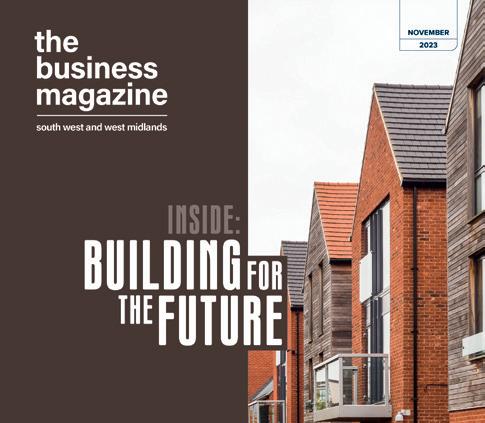





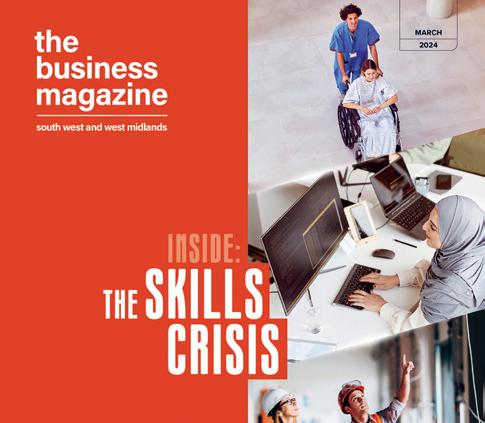

















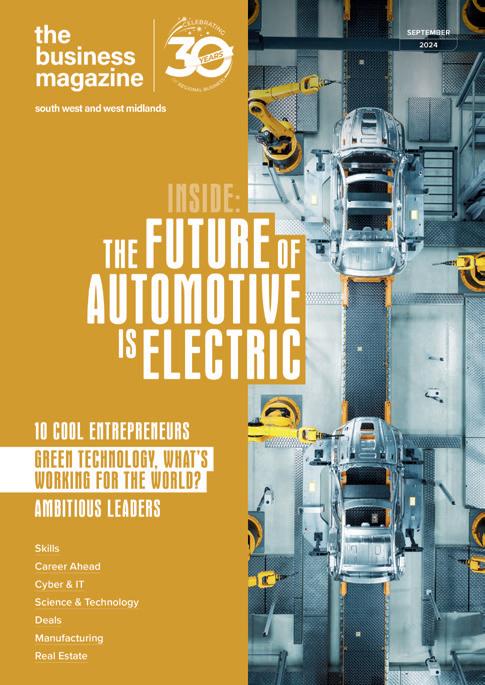
























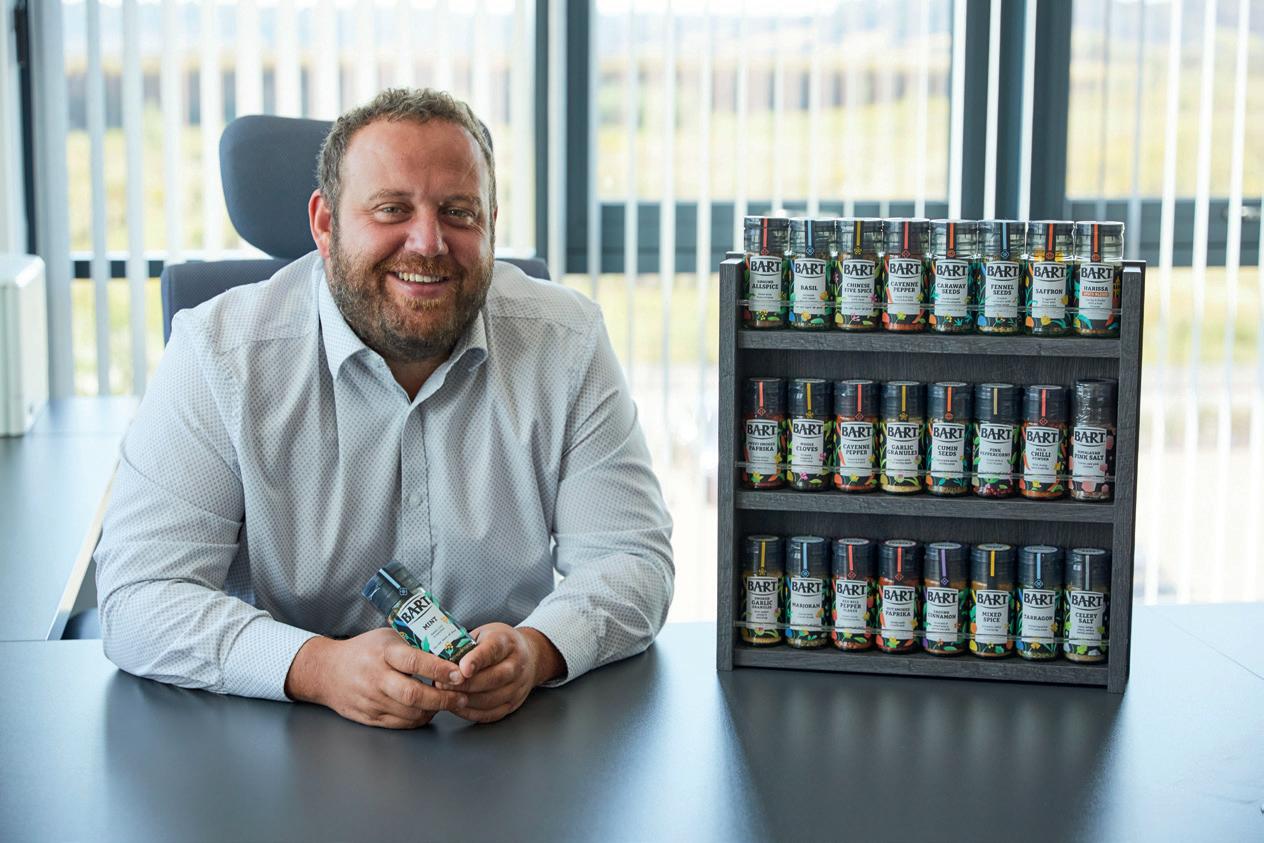

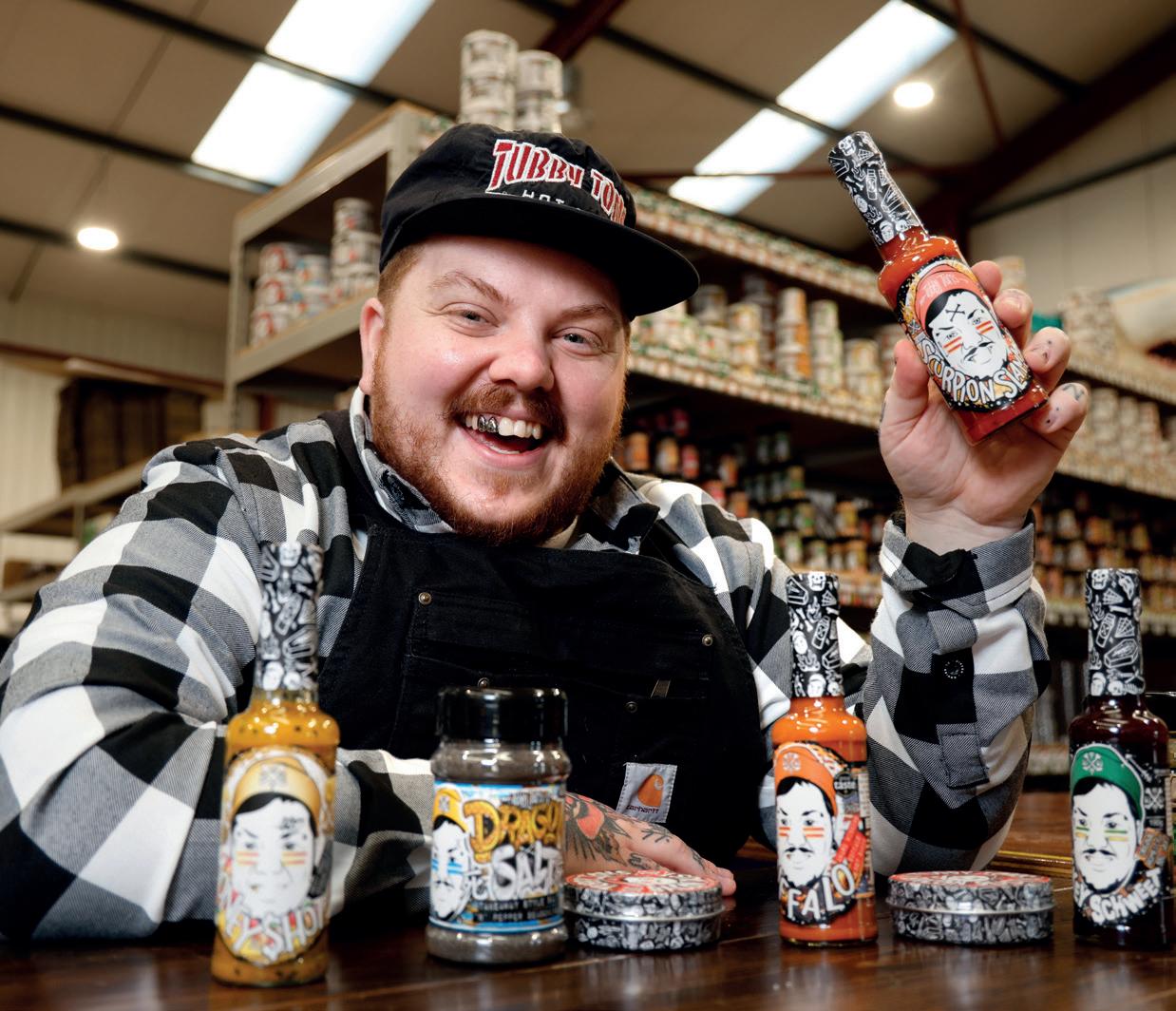

Wildfires pose a significant and growing threat worldwide. The combination of climate change, dry conditions and human actions has led to more frequent and intense fire seasons, with 2024 so far seeing wildfires spread across southern Europe, the USA and South America.
They also contribute up to 20 per cent of global carbon emissions.
The total cost of wildfires in the USA is between $394 billion and $893 billion a year.
So it’s timely that Bath fire detection company Optect has teamed up with USA-based Sonic Fire Tech to develop what it says is a groundbreaking solution combining advanced robot systems with entirely new detection and suppression technologies.
Optect has been aided by tech start-up and scale-up support organisation SETsquared in Bristol.
Now the Optect team is in the final 30 in the Autonomous Wildfire Response category of the global $11 million XPRIZE Wildfire competition. This is a

The technology is powerful and scalable, which are essential features for taking on massive megafires

four-year programme incentivising the innovation of firefighting technologies to end destructive and costly wildfires.
The competition challenges teams to autonomously detect high-risk fires in a 1,000 sq km environmentally challenging area and suppress them within 10 minutes, leaving decoy fires untouched.
Team Optect deploys drones to spot fires from high in the sky, and flying robot taxis that deploy fireextinguishing robo-dogs to zap flames with sound waves.
Infrasound wildfire suppression sounds futuristic but could soon be a reality.
Sonic Fire Tech recently showed its device extinguishing high-temperature wood fires in seconds from several feet away. The technology is powerful and scalable – essential features for taking on massive megafires.
Optect has also recently launched a new flame detection product boasting up to 10 times the range of current devices. With the help of SETsquared, the company has grown its customer base and is now poised to reduce fire risk significantly across various wildfire and industrial applications.
Matthias Jaeger, Chief Technical O cer at Optect, said: “The challenge, as with many XPRIZE competitions, is set close to the limit of possible, and in response, we’re pushing technology to the limits too.
“To pull o a live demo within the project's timeline will be an extraordinary achievement, but technology milestones are being conquered on a regular basis. We look forward to demonstrating our solution in a real-world environment in 2025.”
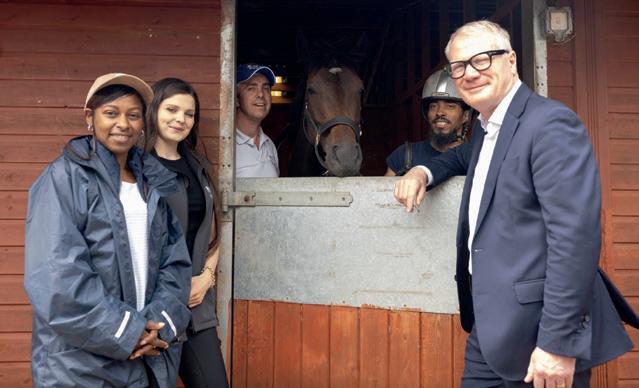

It’s never too late to follow your dream. A Warwickshire mum has taken the reins of her dream job after learning how to care for horses.
Isabelle Padilla, 32, from Quinton is now working at the stables of top British racehorse trainers Richard Newland and Jamie Insole in Droitwich after completing a level 1 diploma as part of the RMF Equine Management Programme, funded by the West Midlands Combined Authority (WMCA).
Isabelle said: “I love horses and started riding at aged four. As a teenager I worked as a hairdresser and doing nails and beauty, but my heart wasn’t in it. When I was presented with this training course, I just couldn’t believe it.
“Every day you meet new people and learn new things, and the training helped me to get a job at a stables working for Richard Newland.
“They are helping me train further to become a head travelling girl where I get to travel the country and abroad with horses.
“Thanks to RMF and the WMCA I have a career in something for which I have a real passion.”

Science park sold for £6.5m for possible nuclear SMR development
South Gloucestershire and Stroud College (SGS) has sold its 40-acre Gloucestershire Science and Technology Park at Berkeley for £6.5 million to Chiltern Vital Berkeley (CVB).
CVB is a subsidiary of Chiltern Vital Group which develops large scale projects across the education, energy, entertainment and regeneration sectors. The group is chaired by Lord Michael Grade CBE, former Chairman of the BBC and Chief Executive of Channel 4.
The Group is currently developing projects across the UK, including a 200-acre energy and technology business park in Yorkshire and Collegelands in Glasgow, one of the UK’s largest regeneration projects –
now 90 per cent complete.
Chilton Vital is also supporting RollsRoyce SMR in the roll out of its Small Modular Reactors. It is expected that Berkeley/Oldbury will be at the centre of new nuclear if Rolls Royce SMR secures the go-ahead for its plans from the O ce for Nuclear Regulation.
Berkeley was one of the first civil nuclear power stations in the world. Its nuclear research laboratory helped develop the UK’s nuclear fuel programme. SGS saved the laboratory site from demolition in 2016 and built a science and technology park, but it acknowledged that only with private investment can the full potential of the site be realised.
Arkell’s raises a glass to the “oldest commercial relationship in the English Football League”
A Swindon brewery believes it has one of the longest commercial relationships on record in the English Football League after it renewed its longstanding association with Swindon Town Football Club.
Arkell’s Brewery, which began brewing beer in Swindon in 1843, has just signed a record agreement with the club for the next three years.
The deal includes continued sponsorship of the prominent Arkell’s Stand – the first thing visitors see when arriving at the stadium.
The Arkell’s Stand holds great historical significance for the town. In 1896, Thomas
Arkell donated £300 for its construction (around £50,000 today).
Brewery Sales Director, Nick Arkell, said: “Our commitment to the club remains unwavering, and as Swindon's longestrunning company, it feels natural to cement our relationship with the town's football team.
“As the club’s first sponsor, this partnership epitomises our shared history and dedication to the town.”
The club’s Chief Commercial O cer, James Watts, said: “We are delighted that Arkell’s support remains as strong as ever as it shows a commitment to all local businesses and supporters.”

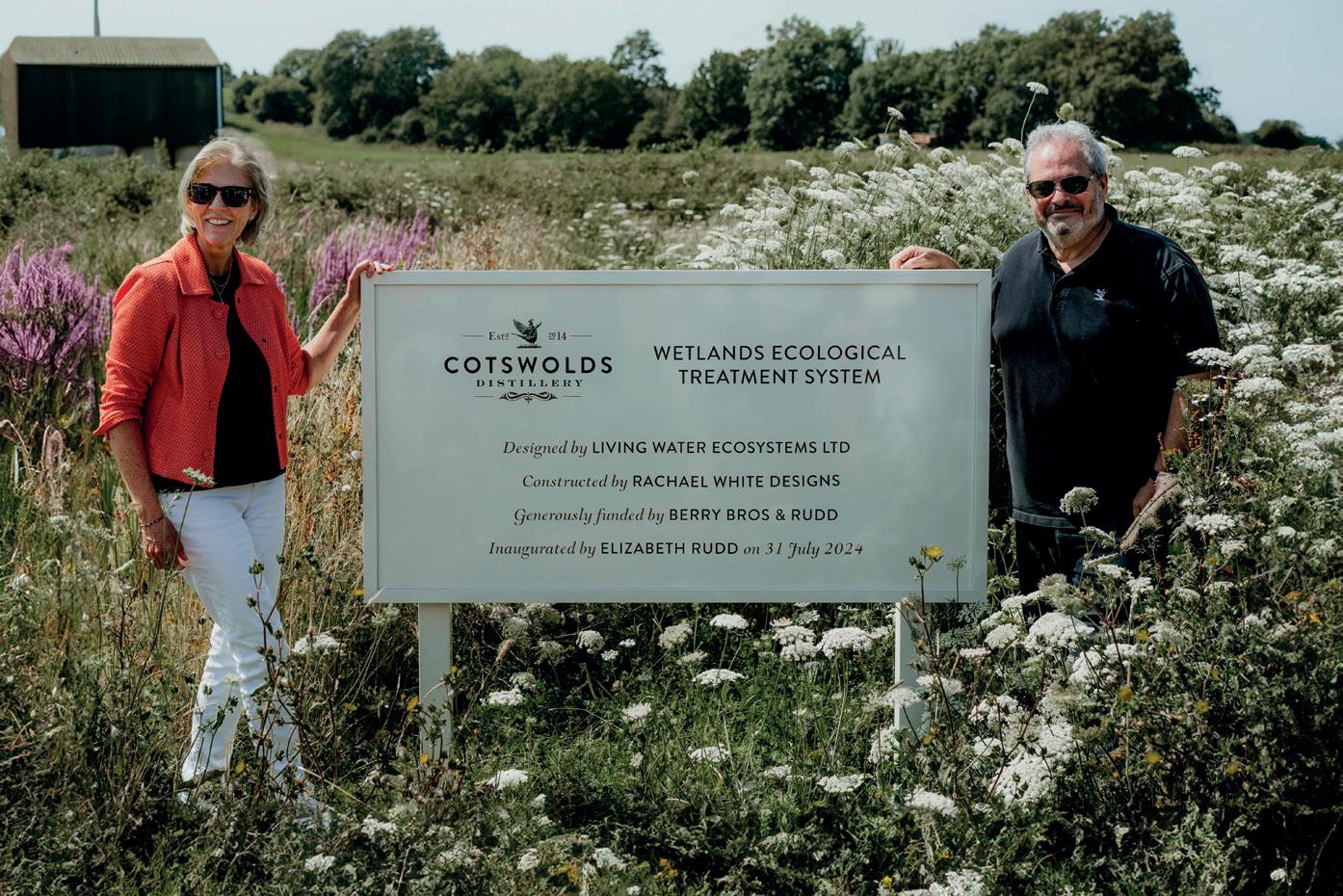
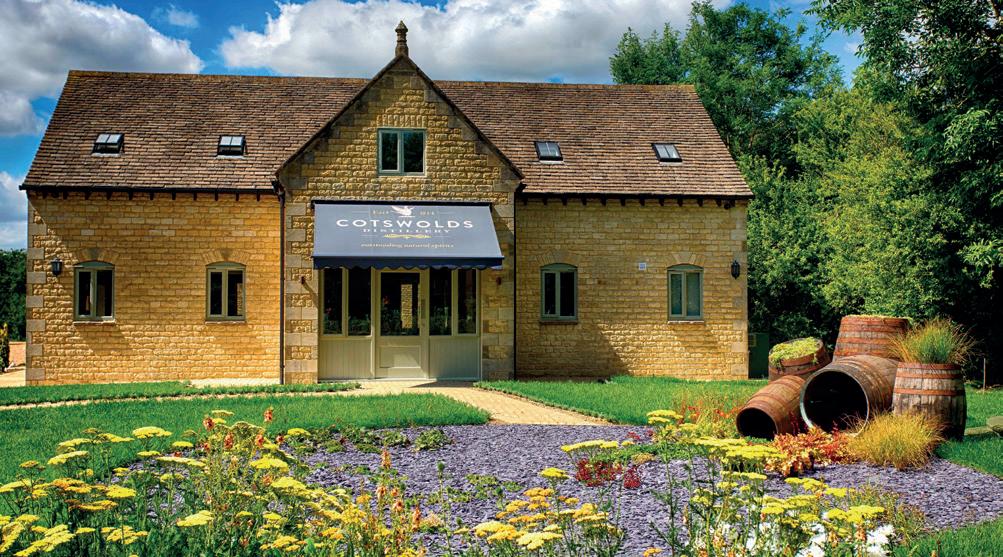

Cotswolds Distillery has unveiled a new bio-diverse wetlands ecological treatment system at its distillery in Shipston-on-Stour, Warwickshire.
Funded by wine and spirits company Berry Bros & Rudd, which invested in the distillery last year, the wetlands will naturally process three-quarters of the wastewater from the distillery’s whisky making, creating a bio-diverse habitat for local wildlife and reducing the amount of tanker trucks and local tra c.
The distillery worked with Living Water
Ecosystems and RHS Chelsea Flower
Show gold-medal winner, Rachael White Designs to build the facility, a system of cells covering nearly two acres of former marshland.
The cells can process both the spent lees, the residual liquid left in the still after the second distillation, and wash water waste – water used in the plant for rinsing tanks, floors and cleaning maintenance.
It is believed the new system will reduce distillery waste by tens of thousands of litres per week.
The system uses a variety of plants and their natural biological processes to break down the chemical compounds deemed as contaminants in the waste streams. Plants were bedded in August last year and have begun processing waste liquid from the whisky making. The clean water from this new treatment system will be used to grow a coppice of willows to provide shelter and habitat for wildlife.
The new wetlands site also includes untouched grassland and a wildflower area for pollinators and visitors to enjoy, as well as new beehives to help the pollinator population. In time, new additions will be made to the site including bird boxes and pathways for visitors.
Dan Szor, Cotswolds Distillery founder, said: “We have been looking for ways to improve our waste management and a wetlands treatment system seemed like the perfect solution.”
The Cotswold town of Tetbury, once home to King Charles before his succession to the throne (he still owns Highgrove House there), is perhaps a surprising place for the emergence of cutting-edge science and technology.
But a team of scientists from Naicker Scientific in the town have secured £30,000 to further develop technology to purify ice frozen in the moon's soil to try and make human habitation on the lunar surface viable.
Naicker Scientific has developed the SonoChem system. This employs a groundbreaking core technology to
purify water derived from lunar ice.
Harnessing powerful sound waves, it spontaneously forms millions of tiny bubbles in contaminated water.
The extreme temperature and pressure created within each micro bubble generates free radicals (unstable atoms which are highly chemically reactive), e ectively removing contaminants.
It is part of the Aqualunar Challenge – a £1.2 million international prize funded by the UK Space Agency’s International Bilateral Fund.
The challenge is a collaboration with the Canadian Space Agency and Impact Canada. The UK track of the challenge is awarding 10 UKled finalist teams £30,000 each to develop their technologies, before a winner and runners-up are announced next spring.
Around the lunar south pole, it’s estimated that 5.6 per cent of the soil is water frozen as ice. For a permanent crewed base on the moon to be possible, astronauts will need a reliable supply of water for drinking and growing food, as well as oxygen for air and hydrogen for fuel.

The UK’s automotive industry is fundamental to this country’s future, but it can’t do it alone

The UK automotive sector could fuel £50 billion of green growth over the next decade, according to the UK’s influential trade association for the automotive industry, the Society of Motor Manufacturers and Traders (SMMT).
That’s a serious claim – but the organisation warns: “Provided the right conditions are in place.”
Those include government policies and consumer incentives to help 17 million drivers switch to zero emission motoring by 2035, halving the number of fossil fuel cars in use.
The analysis forms the basis of the SMMT’s Vision 2035 which also includes a series of five pledges for the industry: Net zero mobility for all, Britain as a global power in vehicle production, an upskilled workforce for the new automotive technologies, clean, cost-e ective energy and a proper industrial transformation strategy (something the whole of the manufacturing sector has long been calling for).
The UK automotive industry has had a torrid few years, and it’s not back on the open road yet. While the country had been investing in developing electric vehicles for a decade before Brexit, the UK’s departure from the European Union put the brakes on.

If the country’s focus is economic growth and net zero, you can't deliver that without decarbonising road transport, so the automotive industry will be central to the UK strategy



The country’s exit forced radical changes in supply chains. One of these was the Rules of Origin requirements within the UK and EU’s Trade and Co-operation Agreement. These are scheduled to come into force in 2027 and require that an increasing percentage of parts in an electric vehicle must be made in the UK or EU. If car manufacturers don’t meet these thresholds, exported cars in either direction will face a 10 per cent tari .
With more than 70 per cent of all UK-made vehicles exported, and more than half of those going to the EU, these rules will be disproportionately felt in the UK.
Then there was Covid, which stalled car production. While the sector has somewhat recovered from the dark days of 2020,


things aren’t yet back to what they were. In the first six months of this year, UK car production fell 7.6 per cent. Despite manufacturing 416,074 vehicles, this was 34,000 fewer than in the same period last year.
This overall fall was driven by a significant decline in exports. While vehicles produced for the UK market increased by more than 17 per cent year-on-year to 106,157 in the first six months, those manufactured for export fell by just under 14 per cent to 309,917.
However, the decline in total vehicle exports had to a certain extent been expected, said the SMMT. This could be due to manufacturers retooling lines to make electrified models, following £23.7 billion of UK investment announced last year.
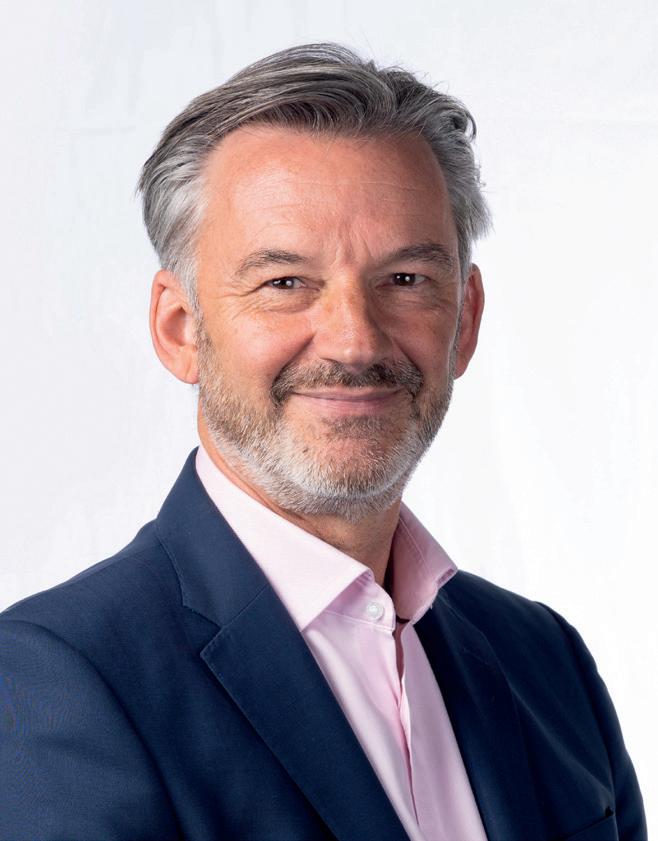

Mike Hawes is the Chief Executive of the SMMT. He says: “If the country’s focus is economic growth and net zero, you can't deliver that without decarbonising road transport, so the automotive industry will be central to the UK strategy.”
The new Labour government has said it remains committed to the decarbonisation of road transport. But there could be an issue here. Last year the previous government said it would delay the UK ban on the sale of new petrol and diesel cars until 2035. It was previously set at 2030. The new Labour government has said it wants to move the date back to 2030.
“That will divide the industry”, said Mike. “And it’s not clear what it means. If we revert to the previous target, the last government’s definition was that would mean the end of conventional petrol and diesel engines.
“They never clearly defined what you could sell after 2030 until 2035. A vehicle has to have significant zero emission capability, but they didn’t define what that was. So it’s still an open issue.”
Last year Labour launched its automotive sector strategy. This addressed some of the issues around demand, infrastructure and competitiveness.
“Labour’s approach will result in a new industrial strategy for the country –something we've been calling for ever since
the one from the last government withered away on the vine,” said Mike.
“The new government understands that you must bring together not just policies but government departments, because the issue involves the Departments for Business, Transport, Energy Security and Net Zero. It also involves Trade and the Treasury – and when you look at the international perspectives, it will increasing involve the Foreign, Commonwealth and Development O ce.”
The Labour government wants to encourage the market, especially for those less able to a ord an electric vehicle, and drive the roll-out of infrastructure – a critical enabler to achieve the strategy. It wants to encourage investment in automated manufacturing and gigafactories.
“They rightly want to focus on growing the UK automotive industry, but this will have to be done in an increasingly competitive global environment,” Mike said. “We want a good relationship with Europe – a better one than we've had before (which shouldn’t be di cult), but everyone has to take into account the protectionism that’s happening around the world.
“What can we do to make sure we have good and progressive relations with all markets when in some cases they are turning their back on international trade?”
There is concern across the UK that this country is being flooded by overseas automotive imports, with China often cited. Mike acknowledges that the market share of Chinese brands is growing.
“Currently their share of the UK market is between four and five per cent, and a significant portion of that is MG.”
This British brand was acquired in 2007 by SAIC Motor Corp, the Chinese stateowned automotive company. There are also newcomers such as BYD, but the di culty in establishing a new brand overseas shouldn’t be underestimated.
Mike says: “A new entrant must convince consumers to invest considerable money in an unfamiliar brand. It will also need to
build a dealer network and aftermarket. That’s all expensive and takes time.
“Sometimes it’s a bit easier with a new technology like EV, and that's why the Chinese in particular are doing better in the EV market than they are in the general market. Their EVs are perhaps priced more competitively, but they’re still not cheap, and there remains a good degree of brand loyalty among UK consumers who want to know the companies they’re buying from.”
But this country is in a good position. Last year more than £22 billion of automotive investment was announced, more than the preceding seven years put together.
“The industry must now realise those investments – such as the gigafactories which have been announced,” said Mike. “I know the market is really tough for EVs at the moment, but the UK, EU and other markets are committed to the decarbonisation of road transport. That means that those who are making vehicles to fit that requirement, using batteries made locally, are in a good place.”
And now that the UK is a free trading nation, it can look at new markets. We have signed trade agreements with Japan, an important one, and with Australia and New Zealand which are useful – but relatively small markets.
Where the UK government direction di ers from the European Union is in tari s. First the USA put 100 per cent tari s on Chinese electric vehicles (more a symbolic gesture to reassure US automotive manufacturers, according to Mike, as China doesn’t sell many into the USA market). More recently the EU has also announced increased tari s on the import of Chinese EVs – which hasn’t been met with mass celebration in certain parts of the European automotive industry because of how their manufacturers have constructed supply chains.
“The UK government is taking a more nuanced view,” said Mike. “China is a critical trading partner and owns a number of UK automotive brands. This country wants free and fair trade with the world, but we will have to watch the market closely.”
Discussions are ongoing with other countries such as Mexico, Canada and potentially India to improve access to those markets.

A big issue facing the UK is equipping the country’s automotive workforce with the new skills they’ll need to produce electric vehicles.
“While our workforce is highly skilled in making cars with internal combustion engines, they will have to understand new electric vehicle technology,” said SMMT’s Mike Hawes. “These are high voltage systems so additional training will be needed for something like 80 per cent of the workforce.
“Then there’s the service repair aftermarket. And that's where there is a massive skills gap, because a mechanic will know the ins and the outs of an internal combustion engine, but an electric vehicle is very di erent. However, this is an ongoing transition so there is time for companies to invest in skills development – as long as they've got the wherewithal to do so.”
The next few years are going to be tough for the UK’s automotive sector. Not just for big companies but also for the supply chain. Many are small or medium-sized businesses which don’t have deep pockets but which will, in many cases, have to change what they make because it’s not needed for the new electric vehicles. They will need to reskill their workforce.
While our workforce is highly skilled in making cars with internal combustion engines, they will have to understand new electric vehicle technology
“Cars of the future will still have four wheels, a chassis, seats and so forth, but many of the parts will be di erent,” said Mike. “The need now is for power control technology. We need to make sure we've got a resilient, capable and innovative supply chain and a workforce fit for the future.”
There is a misconception that competitiveness is all about the cost. It's not, says Mike. “It's about making the right product well and at the price you make it.”
What about other technologies? The government has invested a lot of money in
researching the use of hydrogen in transport. Is it worthwhile?
“At the moment it's hard to see hydrogen being commercially viable to compete with batteries at the same cost by 2030, or even 2035,” said Mike.
“Looking longer term and at di erent use cases, including for o -road heavy duty construction work, some manufacturers believe it could have a key role to play. Others are not so sure. There are certainly some cases where batteries won’t really be suitable – such as long-distance coaches where passengers won’t want to stop for two hours to recharge. The question will be –what’s the alternative? Could it be hydrogen fuel cells?”
The jury is still out on that.
What isn’t in dispute is that the UK’s automotive industry is fundamental to this country’s future. And the government is taking that seriously.
The country has a total budget of £4 billion being invested in automotive research and development. This is being undertaken in 22 centres across the country, many working with our universities, particularly the University of Warwick and Warwick Manufacturing Group, the MTC in Coventry, the Institute for Advanced Automotive Propulsion Systems in Bath and MIRA Technology Park near Nuneaton, Warwickshire.


































Warwick-based Astheimer Design has joined forces with Prodrive in Banbury to develop what they say will be the most e cient last-mile electric vehicle.
The companies have formed a new joint venture, ELM Mobility Ltd, to launch the “Tuk-Tuk of the Western World”.
Astheimer Design is a world-class design studio which has worked on major automotive projects including an all-electric long range concept car which it developed with a consortium of British companies. The project was funded by the O ce for Zero Emission Vehicles. It also worked with a Swedish start-up on designing the world’s first, purpose-built, fully electric truck.
Prodrive has been designing, building and racing world championship winning cars for 40 years, across both rally and track.
With a long history of successful collaborations, these companies have developed a vehicle platform which they say will revolutionise last-mile logistics, o ering an e cient commercial vehicle that will significantly impact our urban environment.
ELM Mobility unveiled its new electric vehicle at Cenex this month and will also present it at the Leaders in Logistics Summit in Twickenham in October.
Another Oxfordshire company is also on a mission to revolutionise green transport in urban environments.
Evri has electric cargo bikes operating in London, Bristol, Oxford and Cambridge ...
Electric Assisted Vehicles (EAV), which has just moved into larger accommodation at Wates Way in Banbury, has developed an award-winning e-cargo bike for this rapidly growing market segment. The company, which now has 25 employees, won its biggest order to date this summer.
More logistics businesses are deploying e-cargo bikes across the UK. In June, delivery company Evri said it was investing a further £19 million in new plans to fast-
track the roll-out of electric cargo bikes. The move is expected to give Evri the UK’s biggest fleet of e-cargo bikes for parcel delivery.
The business plans to grow its fleet of e-cargo bikes to 3,000 over the next decade.
Evri has e-cargo bikes operating in London, Bristol, Oxford and Cambridge and currently delivers 1.5 million parcels a year by bike or EV. It aims to triple that number to around four million over the next year.
Amazon is also using electric cargo bikes. It says millions of packages have been delivered in this way across some of the UK’s biggest cities using its micromobility hubs. These are physical centres within urban areas where packages are sorted before the final leg of their journey.
Packages arrive from Amazon fulfilment centres and then loaded on to delivery vehicles, taking traditional vans o city centre roads. Amazon says it’s planning to invest around £300 million in the electrification and decarbonisation of its transportation network in the UK.
There are seven big premium and sports car manufacturers in the UK, four mainstream car manufacturers, four commercial vehicle manufacturers and more than 60 specialist car manufacturers. Many proud British car marques are now owned by foreign investors.
You could say it’s selling o the family silver, but it’s also a blessing, according to Mike Hawes, CEO of the Society of Motor Manufacturers and Traders.
“The challenge of transitioning an 100-year-old technology to a new one needs someone with deep pockets to fund it,” he said. “In the case of Mini and Rolls-Royce, BMW now owns them both which means they have access to their technology and supply chain.”
Such iconic marques might be foreignowned, but they retain their British identity – and their British manufacturing bases.
The UK is also good at attracting research and development investment from all over the world, and many international brands have a British design centre. That’s why seven out of the 10 Formula 1 teams are
We want to keep our intellectual capability here and our links to UK universities, which is very important
based in the UK, even though they race under another flag, according to Mike.
“We want to keep our intellectual capability here along with our links to UK universities, which is very important.”
But international links are important, added Mike. “If you’re going to understand global markets, you need to understand the consumer in China and the USA as well as in Europe, and you can only do that by having some exposure to them.”
Founded by Lionel Martin and Robert Bamford in 1913 in a small London workshop, Aston Martin is now an internationally admired (and desired) luxury brand. Wilbur Gunn, the Anglo-American engineer, founded Lagonda at his home in Staines, West London in 1904.
While the car marque has had its ups and downs financially over the decades, in 2014, industry veteran Andy Palmer was
appointed CEO of Aston Martin Lagonda. He oversaw the development and launch of the DBX, the company’s first foray into the growing luxury SUV market.
He departed after Lawrence Stroll became Executive Chairman of Aston Martin Lagonda in 2020 following leading new investment into the company. The company employs more than 2,800 people, many at its Warwickshire factory and head o ce.
Jaguar Land Rover was bought by India’s Tata Motors in 2008. It is now Britain’s largest automotive manufacturer. The Range Rover, Defender, Discovery and Jaguar – all iconic brands, sit under the Jaguar Land Rover banner today.
But the marques go back many decades. The first Jaguar car was produced in 1935. In 1961 the iconic E-type sports car was built.
The Land Rover was first introduced at the Amsterdam Motor Show in 1948. Since then they have become emergency workhorses around the world.
Jaguar Land Rover has two design and engineering sites, three vehicle manufacturing facilities, an engine manufacturing centre and a battery assembly centre in the UK. It also has vehicle plants in China, Brazil, India, Austria and Slovakia, as well as seven technology hubs across the globe. It employs around 11,000 people, mainly at its manufacturing site in Solihull and its product engineering centre and head o ce at Gaydon.























The Morgan Motor Company was established in Malvern in 1909. At its core the company is a true coachbuilder.
Using ash, aluminium and leather –every Morgan is built at Pickersleigh Road, the historic home of Morgan since 1914 and the only place in the world where Morgan sports cars are built.



McMurtry Automotive was set up by Sir David McMurtry, one of the UK’s most successful engineers, who established global engineering company Renishaw more than 50 years ago.
In 2019 the Morgan family sold a majority shareholding to Italian company Investindustrial, which has since invested in the business. The Morgan Motor Company now employs around 250 people.

Renishaw employs more than 5,000 people and is now a world-leading additive manufacturing, industry process and measurement control company.
Sir David established McMurtry Automotive in Gloucestershire in 2016 with cofounder Thomas Yates, who previously worked at Mercedes’ high-performance powertrain division.



The collaboration has resulted in the Spéirling, a pure electric single-seater hypercar.
This June, the Spéirling PURE smashed the closed- wheel track record at Hockenheim.



LEVC (The London Electric Vehicle Company) in Coventry was the UK’s first manufacturing plant dedicated entirely to the production of EVs. Its heritage goes back to 1908 when its founders began importing vehicles for sale to
the London cab trade. By 1948 the company was designing and building its own, in collaboration with the Austin Motor Company. In 2006 it was bought by Chinese automotive manufacturer Geely Auto. By 2017 the company was
One of its latest builds is the Midsummer, celebrating more than two centuries of combined coachbuilding experience between Morgan and Italian car design company Pinifarina. The number of hand-formed elements of Midsummer is higher than other Morgan models and features greater complexity. The hand-beaten aluminium body panels take more than 250 hours to produce.
designing and building electric vehicles. The world’s first zero-emissions capable electric cab went on sale the following year. By 2022, it had sold 5,000 TX taxis in London. The business is now global and expanding (see next page).








From The London Taxi Company to LEVC, a new style of EV cabs has taken over London, and the business is expanding and diversifying globally




LEVC (The London Electric Vehicle Company) in Coventry is the UK’s first manufacturing plant dedicated entirely to the production of EVs. As a taxi cab supplier its heritage goes back to 1908 but over the years it has changed ownership (and name). In 2006 it was bought by Chinese automotive manufacturer Geely Auto. By 2017 the company was designing and building EVs.
Geely owns a number of other global car brands, including Norfolk-based sports car manufacturer Lotus.
LEVC’s new global headquarters opened in Ansty, Coventry in 2017. As the UK’s only dedicated EV manufacturing plant, it represented an initial investment of more than £500 million, which also included the development of the TX taxi cab.
At the time, this was the largest greenfield investment in the UK by a Chinese company. Since then, LEVC has produced and developed sustainable mobility solutions for the commercial vehicle space – most famously the TX range-extended electric taxi.
Geely’s investment now exceeds £1 billion, supporting hundreds of jobs in research, development and production, both at Ansty and throughout its local supply chain.
Last year LEVC launched its EV platform, Space Orientated Architecture (SOA), codeveloped with Geely. The company says it is the world’s first EV platform focused on maximising interior space, o ering multiple seating and load-carrying configurations. It can support a wide range of new products – from passenger carrying models to commercial vehicles.
Using this new platform, LEVC has just launched a new luxury MPV (multi purpose vehicle), the L380, in China. This is the first of a range of full electric models. Following the start of sales in China, it plans to launch the L380 into other world markets, including the UK, within the next two years.
Chris Allen, LEVC’s Managing Director in Coventry, said: “The Coventry team is well integrated into wider operations and benefits from the expertise within the Geely group. In this fast-changing environment it is Geely’s ambition that the group represents product quality, sustainable performance and the latest in technological solutions.”




... it is Geely’s ambition that the group represents product quality, sustainable performance and the latest in technological solutions
LEVC employs around 400 sta at its UK head o ce and retail sites. Most are based at its Ansty manufacturing hub, with an additional warehousing facility in Ryton as well as two main London based retailers. It also has a network of independent retailers across the UK and recently appointed Murray Group in Plymouth, its latest retailer location, to o er full sales and service facilities for TX.
The company says that its TX taxi is making a significant contribution to the UK’s transport decarbonisation ambitions. Last year it reached the milestone of more than 50 per cent of London taxis being zero emission capable, saving 200,000 tonnes of CO2 from entering the world’s atmosphere globally.
Now the company can see a demand for sustainable, safe, accessible and clean purpose-built transport outside of just the taxi trade.
LEVC has actively looked at where its TX can help address other transport needs in society. This includes selling to the NHS for patient transfers and partnering with councils to help ensure children with mobility and carer needs have greater ease of access to education, where transport can be a barrier. The TX also supports care home residents and other sectors where wheelchair access is required.
The company’s long term ambition is to be a leading provider of zero-emission mobility solutions in markets around the world.
Chris said: “Our newly announced luxury MPV, the L380, is the first of a new range of innovative, spacious, fully electric models, which will see the brand accelerate its transition from a high-end taxi manufacturer to a leading provider of e-mobility solutions. We expect L380 to launch in the UK within the next two years, and as such, the team are currently working through pricing, specification and exact positioning for the new model.”




The









world needs hundreds of thousands of new pilots. Where will they come from? We meet one man who can see the way ahead
By Nicky Godding, Editor







According to Airbus, the world’s top commercial aeroplane manufacturer, over the next 20 years the aviation industry will need more than 585,000 pilots (and more than 640,000 technicians and engineers) to meet an ever-growing demand for flight.
Where will all these pilots come from? This country’s government doesn’t support any pilot training initiatives and UK banks don’t o er student loans to those wanting to learn to fly. Until very recently it has been a career mostly for those with deep pockets, or fortunate enough to find a sponsor willing to bankroll them to the tune of around £100,000 each.
One man who feels the deep iniquity of this is Lee Woodward, Co-founder and CEO of Skyborne Airline Academy, which has its headquarters and a training academy at Gloucestershire Airport. It has a second at Vero Beach in Florida. Jointly, the academies train hundreds of pilots every year. And such is the demand that Skyborne is expanding.
Lee set up Skyborne Airline Academy in 2016, with entrepreneur Tom Misner, who is now the academy’s chairman. In the 1970s, Tom established the world’s largest chain of audio engineering schools, selling it in 2010 for more than $300 million Australian dollars.
Lee says: “Tom’s school had more than 45,000 students around the world training in audio engineering, media and music production. These were his passions – but so was education.”
Lee knows all about passion. Did he always want to be a pilot? “Always, always, always – from as young as I can remember. And I only ever wanted to be a commercial pilot, as much as I loved military aircraft.”


He remembers the moment his career path became clear. “As a young child, I’d go to Manchester Airport to watch the aeroplanes. One day I saw a crew walking out to a Dan Air 727 and climb up the steps. I just knew then that’s what I wanted to do.”
Coming from a working-class background, Lee thought it was a pipe dream. But an inspirational maths teacher at his

comprehensive school in Widnes suggested it could be a reality.
“He said, if you really want to do this, you can. He took me under his wing, and I never looked back. In 1989, BA announced it would o er 600 pilot training scholarships over a five-year period. There were around 120,000 applications and I was accepted the second year.”
After completing training with BA, he flew Boeing 757/767 and 747 aircraft before becoming a trainer and examiner. He left BA in 2003 after losing his Class 1 medical and joined the then fledgling pilot training company, CTC Aviation, in Southampton. He later regained his medical.
“I owe everything to that BA scholarship,” He says. “When you remove the funding barrier, you see the quality of candidates go up almost exponentially. Applicant numbers increase between 15 and 20 times so that means the talent pool is so much bigger and we can find the very, very best individuals. If airlines are serious about recruiting the best talent, then they should find a way to fully fund or at least part sponsor the training.”
Some are. Last year Skyborne was selected by British Airways to train pilots in its Speedbird Pilot Academy, which provides fully funded flight training for up to 100 candidates a year. BA says that it wants to make a flying career more accessible to a wider selection of people.
“The applicant numbers for the Speedbird Pilot Academy are enormous,” admits Lee. “We share the contract with Flight Training Europe in Spain, but we are the preferred, and only, UK supplier and will train around 80 or so out of the 100.
“BA make it a tough selection process, with only around five per cent of applicants successful.”
In total, including the BA Speedbird contract, Skyborne annually enrols around 170 students to train as pilots at Gloucestershire Airport, and around 300 in Florida. Next year student numbers will rise at both locations – 300 in the UK and 400 in the USA.
Skyborne employs around 60 people in the UK and more than 200 in the USA, of which 93 are flight instructors.
... if students need more training there's no further cost, we cover it all, so it's one fee –that's it
It aims to stand out from other training schools in a number of ways. “All our training is delivered in an airline-focused way,” says Lee.
“We train in an incremental fashion, similar to how Tom did it in his audio engineering business. He called it progressive continuous learning. We have adapted it to suit our training environment.
“Pilots in ground school are exposed to aircraft and simulator experiences to better contextualise the theoretical phase and cement their learning.
“We also take principles that the UK CAA (Civil Aviation Authority) regard as best practice – such as loss of control, runway incursion/excursion, controlled flight into terrain and so on, and bring this into the flight school of training.”




It also puts all trainee pilots through two days of formal customer service training, which Lee says is unique to Skyborne.
airline.

“Pilots should know the full value they bring to their airline. The influence they can have on the passenger experience is still, even behind the locked door, significant.
“We help our trainees understand that the second they put on their uniform they will be viewed as being on duty, even if
second they put on their uniform they will as they’re not.”






This isn’t the first time that Lee has built up a pilot training academy. At CTC Aviation, he helped develop the cadet pilot training programme, which became known as “CTC Wings”.








By 2015 CTC had become the biggest independent pilot training company in the world, and Lee was Director of Business Development and Chief Operating O cer of the largest division in the company.
Success brought CTC to the attention of a larger business and that year it was bought by L-3 Communications in a transaction that valued CTC Aviation at around £140 million.
Lee could have stayed under the new ownership or returned to flying, but a chance encounter with global entrepreneur Tom Misner o ered him the opportunity to establish his own academy.
How does Skyborne select its trainee pilots?
“We look at aptitude and attitude. Pilots complete both psychometric and aptitude assessments, followed by an airline-style, competency-based interview.
“We want the very best people to come to our training school, but we also have a duty of care to individuals. They, or their sponsors, will spend more than £100,000 on their training.
“Around 80 per cent of our students have parents who will take out a second mortgage and make significant financial commitments to get them through. I am
happy to say that 98 per cent of our trainees succeed and all successful trainees get placed in their first job.”
Lee says Skyborne is unique in the industry to o er performance protection. This means that after completing selection, if a student fails in training, the academy will refund everything minus around £10,000, which is a non-refundable deposit.
“And if students need more training, there's no further cost, we cover it all, so it's one fee – that's it.
“We back our selection process. I think there's nothing worse than students in training being worried about the consequence of failure. So unless the student has committed a gross error, or fails to apply themselves, they will get the refund.”
Skyborne has also invested in its facilities. The academy at Gloucestershire Airport is purpose-built, with training rooms and a large hangar facing onto the airfield. Its site in Vero Beach, Florida is bigger and accommodates all students on site. At the Gloucestershire site, trainees live in Skyborne accommodation in the centre of Cheltenham. “Here they prefer being in a town,” said Lee.
The biggest challenge for the still young business to date has, not surprisingly, been Covid, when planes across the world were grounded.
“At that time our students couldn’t see a career pathway, but I kept saying – this will come to an end soon, there will suddenly be a global shortage of pilots. We are in that situation now. And many airlines are still playing catch up.”
Skyborne bought its Vero Beach site in 2021 from Flight Safety International and was able to continue training there as pandemic restrictions were somewhat more relaxed than in the UK.
“While we still trained at Gloucestershire Airport, it was a lot tougher and the stress on our sta and students was high.”
Does Lee miss flying? “I really do, but I’ve been so busy setting up Skyborne in Gloucestershire and Florida.
“I keep my licence going and get tested ever year. I’m still a trainer and examiner and I’ve definitely not flown my last flight.”
Home for Lee is the New Forest, but with two major sites in Gloucestershire and Florida, he doesn’t get as much time with his family there as he would like. “I play tennis and golf, and when I’m at home I get out on the water sailing as much as I can.”
As we close the interview Lee returns to a main concern, the cost of training.
“I’d love to find a funding solution to enable more people from all backgrounds to train as pilots, as I was able to do, and we will find one eventually. We’ve got all the statistics to show banks why their risk profile is almost negligible. I won’t give up.”
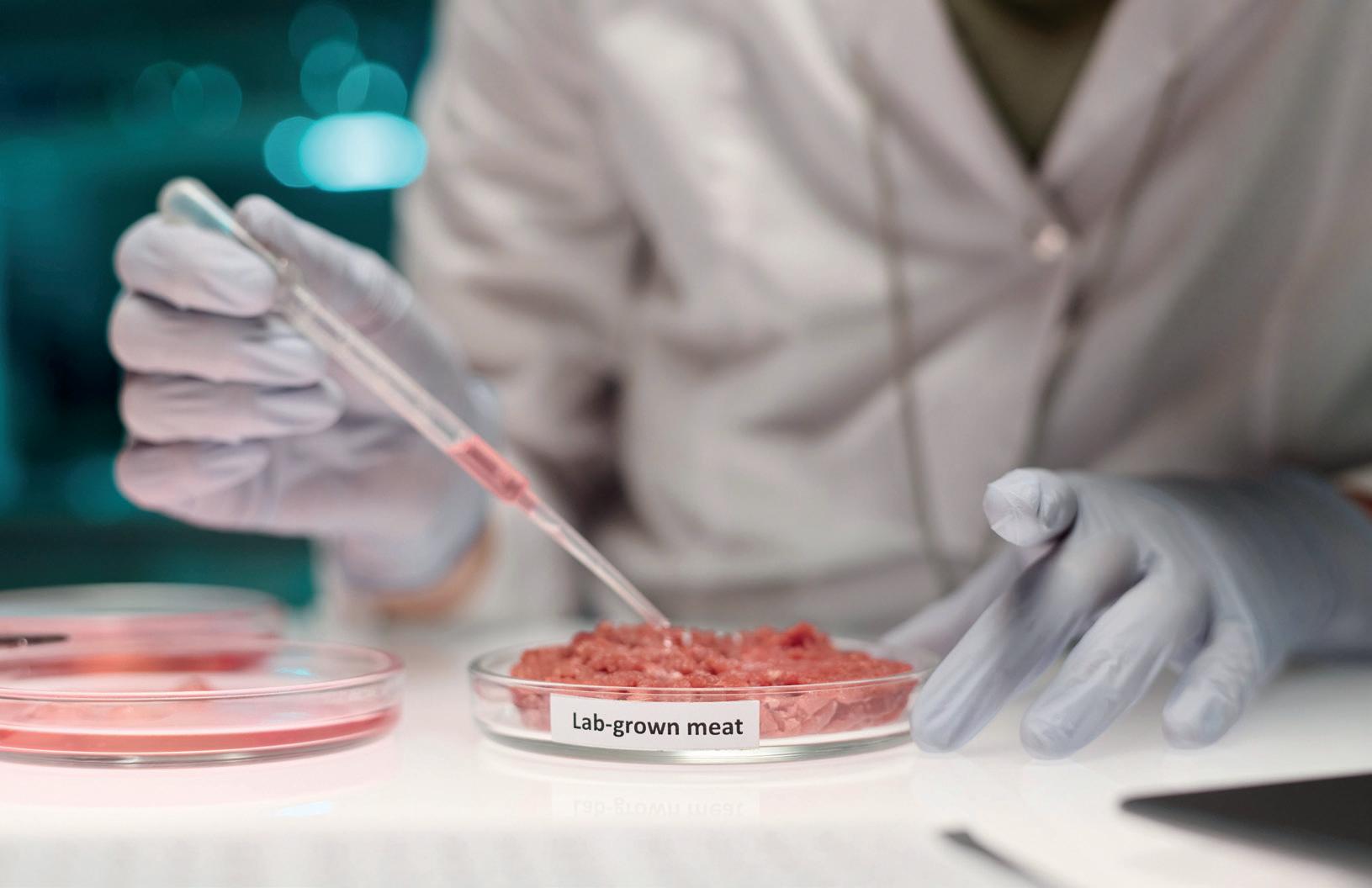

A new report from a team led by the Royal Agricultural University (RAU) in Cirencester, has shown how using by-products from farming could scale up cultured meat production and bring down costs.
This type of agriculture sees meat produced by culturing animal cells in a lab.
Simple forms of such meat like mince and nuggets are already possible.
According to research, cultivated product could cut the climate impact of meat by up to 92 per cent, and reduce air pollution by up to 94 per cent, but it isn’t currently authorised to be sold in the UK.
And research from Green Alliance, an independent environmental think tank and charity, found the UK’s sustainable protein industry (which actually replaces animal proteins in the food system entirely) could be worth up to £6.8 billion annually and create 25,000 jobs by 2035.


The RAU report, Culture Clash? What cultured meat could mean for UK farming, looked at the issues and the university team partnered with nine farms to explore what cultured meat mean might mean for them. It also investigated the threats and opportunities as seen by UK farmers.
Professor Tom MacMillan, Elizabeth Creak Chair in Rural Policy and Strategy at the RAU, who led the study, said: "The environmental cost of meat production globally means we need to throttle back, and widening the range of safe, tasty and a ordable alternatives to traditional meat can help.
"While the jury is out on whether cultured meat will fit the bill, we’ve found that it needn’t spell disaster for farmers.
"Those who spoke to us for this study had concerns about the technology but, for the most part, had many bigger challenges on their plates. Some were also interested
in its opportunities, from supplying raw materials to even producing it on their farms," he added.
Farming by-products which could be used in cultured meat production include leftovers from making rapeseed oil and blood from traditional meat production, which is sometimes used as fertiliser – or wasted. Both are rich in amino acids, the costliest and least sustainable ingredients used to grow cultured meat.
Linking cultured meat production and farming could also benefit some farmers and address concerns over the threat that such new technology poses to traditional farming, which has led Italy and some US states to ban cultured meat.
The farmers' main concerns were around wider social issues, such as big companies controlling the food system or the knock-on e ects for rural communities, more than about the direct impact on their businesses.
ProCook unveils plans for 10 extra stores next year – and 100 more after that
Total annual revenues have ticked up slightly at ProCook, to £62.6 million at the end of March.
The Gloucester-based direct-toconsumer kitchenware brand also plans to open 10 more stores and a further 100 in the medium term.
ProCook was founded as a family business in the 1990s. It launched on
the London Stock Exchange in 2021.
Chief Executive, Lee Tappenden, said: “We have improved our trading performance, returning to profitability and reducing net debt.
“We have a clear plan to accelerate profitable growth and are focused on building a stronger business that will support our ambitions.”
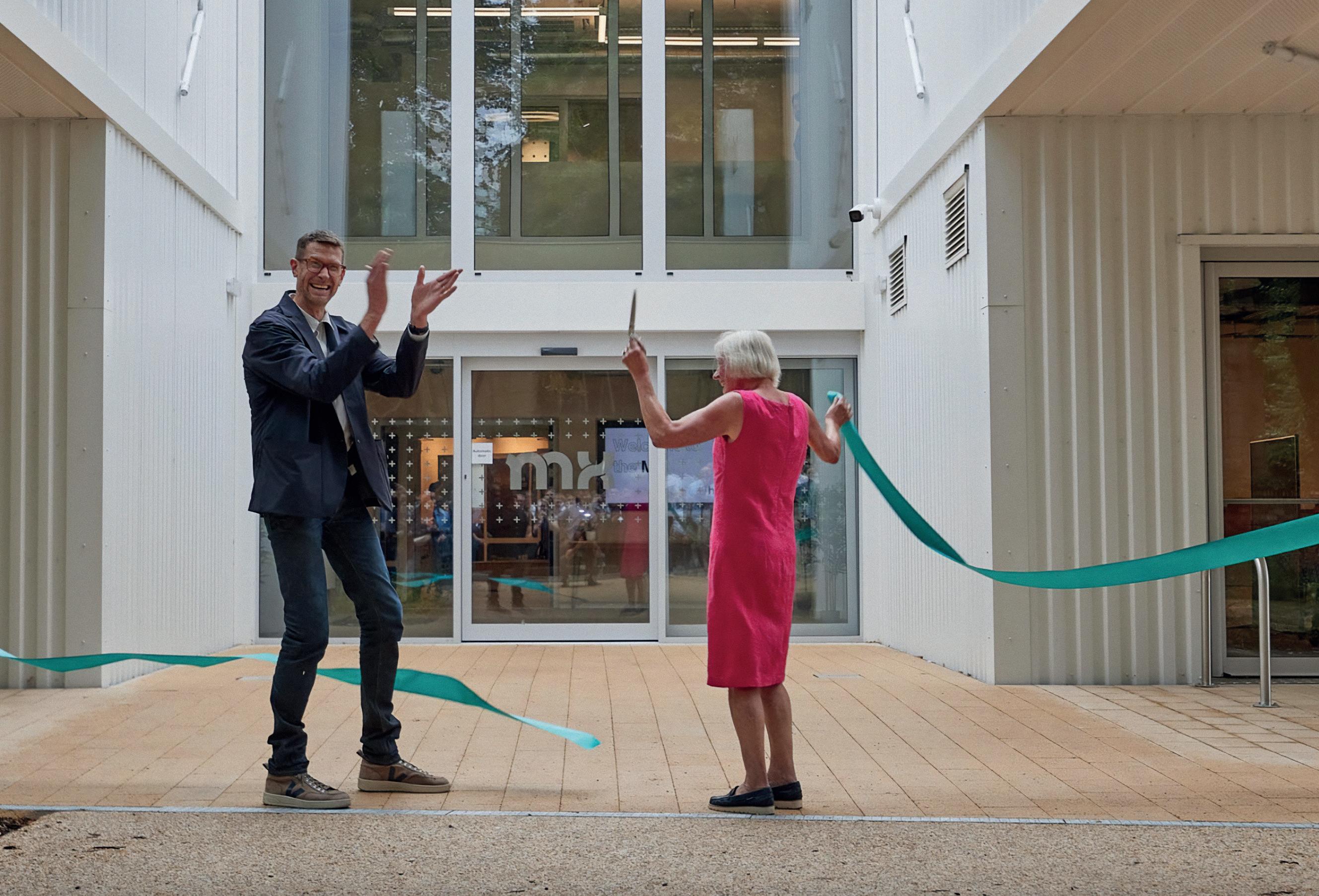
An urban regeneration scheme first announced way back in 2020 has finally been completed. Cheltenham Borough Council and Plexal’s Hub8, a workspace to support growth in the local tech community, opened the doors to the 20,000 sq ft MX Innovation Centre –the heart of their shared urban Minster Exchange (MX) scheme.
Located next to the Wilson Art Gallery and Museum and Cheltenham Public Library near the high street, the MX will o er startups town centre space to develop.
Cllr Rowena Hay, Leader at Cheltenham Borough Council, said: “This innovative new space will be a place for start-ups, academia, industry and government, particularly through its links into Golden Valley. It will also be a hub for the community, with a café and events space.
The Golden Valley is the ongoing multimillion pound development which will support the growth ambitions of the region’s cyber sector.
Bruce Gregory, Managing Director at Hub8 by Plexal, said: “We’re over the moon to have o cially cut the ribbon on the MX
We’ve already welcomed 60 businesses, with a total capacity for 400 members
Innovation Centre. It’s been a long time coming. We’ve already welcomed 60 businesses, with a total capacity for 400 members. These companies are working on everything from cyber security and marketing through to recruitment and food tech, demonstrating a diverse pipeline of talent.”
The project’s initial budget of just over £5 million ballooned to more than £9 million. The council said the project had been part-funded through government grants and the county’s Growth Hub. In 2022, Cheltenham Borough Council pledged a further £2.5 million. The following summer the council voted to extend the funding up to £9.27 million.
As the new Labour government set out its ambitious strategy to boost housebuilding, SNG (Sovereign Network Group) and Vistry Group, a leading mixed-tenure developer, have formed a new joint venture partnership to build 595 new homes in Thornbury, South Gloucestershire.
Outline planning consent for the site was secured in February last year, and it will provide up to 50 per cent a ordable homes including social rent, a ordable rent and shared ownership. Kent-headquartered Vistry will sell the open market homes via one of its three retail brands, Linden Homes, Countryside Homes or Bovis Homes.
The planning permission also includes the provision of a primary school, retail and community space, public gardens, open space and allotments. The partnership will contribute more than £6.5 million to improve local infrastructure and transport, as well as providing the council with support to operate the school and nursery that will be built on site.
Tom Titherington, Chief Investment and Development O cer at SNG, said: “This site is a positive step towards delivering our ambitious plans for tens of thousands of good, a ordable homes that are desperately needed. I’m delighted that our joint venture with Vistry will form a vital part of the delivery of this vision in South Gloucestershire.”

Cllr Mark Hawthorne, Leader of Gloucestershire County Council, is standing down and leaving politics.
Mark, 49, who has been active in Gloucestershire politics over the last 20 years, said: “This is not a political move – it simply means I am moving out of politics. I have been thinking about this for a while.
“The great thing about being a politician is that every four years the public get to say if they want you to continue, and as a politician you get to make that choice too.”
Mark was first elected as a county councillor in 2009. He was elected as Leader of the Council in 2010. Prior to that he served as Leader of Gloucester City Council between 2004 and 2007.
As a founding member of pan-regional growth partnership The Western Gateway, Mark worked to position Gloucestershire as a key player across the region and through his role on the
“The great thing about being a politician is that every four years the public get to say if they want you to continue ...”
Local Enterprise Partnership Board, (wound up earlier this year), helped secure a billion-pound pipeline of national investment to deliver some significant infrastructure schemes and projects across the county.
He added: “I have had lots of conversations about the future, but I haven’t anything lined up.
“I do need to go out there and earn a crust. I will look at some of the skills I have gained in local government and helping business across the region.”
Peer to peer (P2P) lender FOLK2FOLK has passed the £700 million lending milestone, which it says cements its position as the largest P2P lending platform to small businesses in the UK.
Since its launch in 2013, FOLK2FOLK has connected hundreds of local businesses with investors, providing loans from £100,000 to help them start, grow and diversify.
Investors enjoy the security of property-backed investment opportunities delivering returns –currently from 8.75 per cent per annum – and a track record of zero capital losses to date.
FOLK2FOLK, based in Gloucester and Cornwall, said hitting the £700 million lending milestone shows its commitment to regional growth by bringing small businesses and investors together, with resulting positive knock-on impacts for local economies across the UK.
Benefits range from job creation and housebuilding to enhancing local supply chains and improving leisure and tourism facilities, the company said.
In the past 12 months, FOLK2FOLK has funded a range of projects including a start-up creating custom handmade cricket bats, the purchase and operation of local village stores with post o ces and a multi-million pound renewable energy project.
Investors can self-select their investments, earning a fixed monthly income while knowing their funds are making a di erence in regional communities. Over the past year, FOLK2FOLK paid out £15.78 million in interest to investors.


The UK’s first inland surfing lake opened in Bristol in 2019. The Wave is now attracting close to 80,000 surfers every year. We meet its CEO, Hazel Geary
By Nicky Godding, Editor


If you don’t know what you want to do in life, learn skills to help you tackle anything a job might throw your way.
Hazel Geary, Chief Executive at The Wave in Bristol, picked mechanical engineering at university – a degree which gave her lots of transferable skills, not least being able to problem solve.
But she knew after a short stint as an engineer at the car manufacturer Nissan that a career in a boiler suit and steelies wasn’t her cup of tea (in fact only 20 per cent of UK engineering graduates go on to build a long-term career in the sector) so Hazel, now 42, began replanning her career.
Those 20 intervening years of problem solving, first as a management consultant and latterly in project management in the gym and leisure sector (of which more later) have brought her to her current role.

inland and build a world-first, health and wellbeing-focused surfing destination in Bristol.



Last year she accepted the job of CEO at The Wave in Bristol, the UK’s first inland surfing destination, taking over from Craig Stoddart. He’d worked with founder, Nick Hounsfield, to raise the funding, build and open this ambitious project.
The Wave, which opened rather inauspiciously in November 2019 just before the global pandemic, had long been a passion project for Nick. He wanted to bring a ‘slice of the ocean’

Having worked in healthcare for 18 years (he graduated as an osteopath in 1997) he saw that many of the physical and mental health issues people battled with were due to inactivity, a disconnection from nature and a lack of community.
He built a team around him, secured £30 million of investment and spent the next few years throwing his all into planning and overseeing the building of what is now a stunning destination at Easter Compton, just a few minutes o the M5 at Junction 17.




Up to 1,000 perfect waves are produced an hour generated by renewable energy. You can’t guarantee waves in the ocean, so for time-poor surfers who want to learn, improve or just enjoy the sport, it’s the perfect destination, any time of year.
The role at The Wave could have been written for Hazel. It had opened to much fanfare in November, then had to close the following March when the first lockdown was imposed.

“The project at Pune, near Mumbai, was a joint venture between David Lloyd and Talwalkers Better Value Fitness. We planned and built a nine-storey, 90,000 sq ft facility from scratch. It had swimming pools, tennis and badminton courts, gyms and restaurants.”
At the end of 2019, and with the project successfully completed, Hazel returned to the UK with her husband and first child. Their plan was to spend six months figuring out what to do next.
Cashflow is an issue for any young business and The Wave had invested heavily in excavating the lake itself, installing new technology to generate the waves, building a new shop, restaurant and changing facilities, and landscaping to preserve and improve the natural biodiversity of the land (which was green belt).
The venue also built its own solar farm in 2023. “We now generate 125 per cent of our electricity consumption every year and push surplus energy back into the grid,” says Hazel.

While Covid shut all leisure destinations for months, The Wave was able to reopen sooner than many in 2020 –albeit with reduced capacity – because its activities were outdoors.

But with a second baby on the way amid a global pandemic, she found her expertise in demand.
The Wave at Bristol is now a true destination and having taken on the CEO mantle from Craig, Hazel is building on everything that he and Nick, now a nonexecutive director, planned.





Over the next two years the business recovered well and has grown significantly. Last year it turned over around £10 million and now employs almost 300 people.
“I returned to consultancy, working with lots of consumer-facing businesses, including helping start-ups fundraise and get their ideas o the ground. For others, I was called in to help fix particular issues, often associated with Covid disruption.”











“Lots of them are on fixed-term contracts because we’re a seasonal business,” explains Hazel. “But many disappear to warmer climates over the winter and return to us the next year.


For The Wave, as with pretty much every sporting venue, Covid was a big challenge.






“Our whole purpose is about creating a happier, healthier world one wave at a time,” she says.

Which is a great slogan. But is it succeeding?


Most definitely. When I arrive for this interview (on a windy, overcast summer morning), scores of people are milling around.


“We welcome back around 44 per cent of our seasonal sta – incredible when you compare us to other seasonal businesses.”





Prior to taking over at The Wave, Hazel spent almost 10 years with David Lloyd Leisure. “When I joined, there were about 90 sites across the UK and a further 10 or so across Europe.










wetsuits of our seasonal sta – incredible when


Some are in wetsuits preparing for a session, others comfortably settled with laptops and frothy co ees at long rustic tables in the woodframed café (which serves local food), overlooking the lake.


“I was recruited to help solve the strategy problems that fell between the cracks of everybody else's day jobs.”

















She quickly became product director, managing everything from food and beverage to children and adult products, even gym design. Her experience culminated with three years in India taking the David Lloyd concept to the sub-continent.








Our whole purpose is about creating a happier, healthier world one wave at a time





Young mums with pre-school children are tucked into another part of the café. On the other side of the space there’s a large, airy shop and outside, a purpose-built children’s play area. The site even a skate ramp.
“We no longer charge an entrance fee for people who just want to come and sit in our café and enjoy this incredible space,” says Hazel.
Alongside its aim to be sustainable, The Wave wants to be accessible to more people.
“Surfing is seen as expensive,” admits Hazel. “It has been considered a middle-class sport and we want to change that.
“We want to welcome people of all ages, backgrounds and abilities, so our impact programme is all about how we try to unlock those barriers.”
One of its programmes is supporting the adaptive surfing community. In July, The Wave hosted the English Para Surfing Open, attracting athletes from all over the country.
“We have a 20-strong team trained in supporting people with all sorts of physical challenges,” Hazel adds.
The Wave also works with other groups, often laying on transport from Bristol, supported by its corporate partners, including Good Energy.
“This year through our Big Blue project, we aim to give out 750 surfs to local schools and charities to get young people down here who otherwise wouldn’t have been able to come.
“Our most a ordable sessions are our Play in the Bay sessions, for young children who just want to come and play as families in the water. Children from as young as six months can enjoy. They can bring their own body boards or use ours, and our wetsuits. Or they can just jump in and out of the waves, without needing any equipment at all.”
A growing area of business is catering for corporate events.
“Many businesses want somewhere di erent, and we’re a cool place to be. They don’t have to go near the water, but if they do, we o er team events. And the great thing is that because so few people surf, it’s rare that anyone in the group will be an expert so everyone has a good time together – it’s a great leveller. What you don’t see around here is unhappy people. All we see are smiles.”
And that’s important to Hazel, who understands (particularly from her three years in India) the importance of good customer service.
“Customers are at the heart of everything we do. An important piece of the jigsaw for me is making sure our Wavemakers – as all of our team are known – are well trained, love what they do, and can create an incredible experience for absolutely every single person that walks through that door.”
It’s working. Last year, The Wave welcomed around 80,000 surfers, many returning multiple times. And that doesn’t count those visiting the site shop, café or other facilities.
“We estimate that we welcomed up to around 250,000 people.”
Having got the Bristol site up and running, what about expansion? It could be on the cards.
“Discussions have been ongoing for a while on a site in Enfield, in north London and we are talking to others. Covid slowed things down, but we continue to explore potential new locations. However, our focus for the last two years has been to make sure that this business is profitable so that we have a successful blueprint for a second one.”
The Wave was the first inland surfing destination, but others have seen the opportunities. “There are sites under development in Birmingham and Edinburgh. And it’s important we support each other. The industry is growing, and we want it to grow safely.”
Does Hazel surf? “I wasn’t a surfer when I joined, now I’ve gone from being a complete novice to moving towards advanced. My children are still very young but my oldest is learning to surf and my youngest wants to learn when she’s old enough. Our coaches are always in the water for the lessons, and we have separate lifeguards in red who are positioned around the water. Safety is paramount.”
Her husband, though, is a golfer. She sighs. “The Wave isn’t for everyone, though he says he’s happy to surf when the sun is shining.”

Office workers spend 75 per cent of their time sitting. It’s bad for your health, says the NHS. What can help is a chair designed for you
By Ian Mean, Business West Gloucestershire Director and The Business Magazine contributing writer
I looked up ergonomics in the Oxford dictionary. It told me it was “the study of people’s e ciency in their working environment”.
It was the explanation I needed to understand the rationale of an interesting company making very special o ce chairs, and appropriately called Ergochair.
Based at Yate near Bristol, Ergochair has achieved double-digit growth every year for almost a decade and now has a multimillion-pound turnover making these chairs, many of them customised to the individual’s working needs.
Managing Director Ben Caton, 35, who used to run health clubs, tells me: “The powerful statistic that got me about Ergochair was that in the last 15 years we have helped more than 115,000 people sit better, and lead more comfortable lives.
”For me, as someone who was the end user of the product before I ran the company, it’s the science behind a human being’s wellbeing in whatever posture they use throughout their day.”
Ben asks a pertinent question about how we look after our employees in their work environment: are we really aware enough of the wellbeing of our sta ?
So how can a company justify spending what might seem quite a lot of money on one of Ben’s customised chairs, which range from £600-£1,200?
“You wouldn’t think twice about buying a really good mattress,” he says. ”And then thinking that’s going to make a real di erence to my sleep.
“However, there are people who would question the provision of a good o ce


“Not all homeowners have a good office set-up in their garage”


chair. Just look at the time spent – they are pretty similar.
“How much time do you sit down at work? Four or five years ago, it might have been the majority of the working day – that all changed with Covid.
“Working at home, people are probably sitting on a dining room chair, a sofa or a bean bag. Not all homeowners have a good o ce set-up in their garage.”
Ben believes that providing a good o ce chair is quite an easy way of keeping sta happy.
“If I said to any business owner, I can give you a way to hold on to that incredibly talented member of sta for an extra five years, the return on that chair investment would not be questioned.”
Ergochair has six new products coming on stream this year and their growth aspiration according to Ben is to become the preeminent player in Europe.
“We are making progress in the UK,” Ben said. “But the Europeans have found a way to blend architectural beauty and designled thought with a passion for ergonomics and the wellbeing of their sta ”.
Nine pioneering startups have secured £50,000 to develop prototypes using artificial intelligence (AI) to enhance creative production and help grow the UK’s creative economy.
The programme is run through Digital Catapult, the UK's innovation agency for advanced digital technology.
The BBC will work with Bristol-based Fictioneers, which has developed a collaborative canvas for storytellers and software engineers who are making personalised, game-like experiences in real and virtual locations, and Bath-based The Gentleman Octopus to improve its audio output and audience engagement.
The Gentleman Octopus applies robotic technology and engineering approaches, alongside software development and extended reality technologies to provide design services and bespoke installations, builds and visualisations for events, festivals, theatre, marketing and event management companies.
The aim of this collaboration is to enable the BBC to deliver more immersive content.
Cloud service provider AWS will work with Bristol-based companies Nulight Studio, Noods Radio, Force of Habit and London-based SuperScout to pioneer new AI-based production methods.
Two other Bristol-based businesses are also involved. Gritty Talent aims to improve engagement, retention and progression of talent in the creative sector. Weaving Change wants to democratise fashion by developing AI to suggest personalised outfits from users' existing wardrobes.
Matthew Hawn, CEO of Fictioneers, said: “Generative AI has the potential to be far more than a tool for generating gigabytes of anodyne content. Our prototype demonstrates how AI can become a bicycle for creative minds. We’re not replacing storytellers, we’re giving them superpowers.”





Brazilian Jiu Jitsu association Roger Gracie Bristol (RGB) has received investment of £390,000 from BBRC (Bristol & Bath Regional Capital) to improve the lives of local people.
RGB generates social impact with initiatives that bring people in personal crisis “onto the mats” through interventions, programmes and concessionary rates for struggling and vulnerable people.
Since 2017, RGB has helped more than 30 vulnerable women, 38 ex-military and 35 Avon and Somerset policemen with selfdefence skills.
It has also provided 18 child scholarships for families struggling with costs, and a crisis management rehabilitation programme for children with ongoing issues of parental drug addiction, neglect and abuse, while employing seven members of the local community.
Tech firm



It is led by two brothers who grew up in the Southmead area. And its clubs in Southmead and East Bristol now provide regular training sessions to more than 800 members.
The brothers hope to double this thanks to the investment from BBRC’s nvestment fund City Funds. There are plans for three more clubs across Bristol in the next few months.
Luke Chamberlain, Head Coach and Cofounder at RGB, said: “Our mission is to empower more than 2,000 members of the Bristol community with Jiu-Jitsu as a way to find focus and support.”
Jari Moate, investment director at BBRC, added: “RGB is delivering significant impact for local people and will be able to double its e orts as a result of this investment. It’s great to hear the stories of the people that have benefited from its training sessions.”
A Portishead company specialising in electrical monitoring and asset integrity for industries such as subsea, rail and industrial has undergone a management buyout.
Edward Davies, Hugo Mansfield, James Carnegie and Rebekah Howard have bought a majority stake in Viper Innovations from co-founders Neil Douglas and Max Nodder who retain a minority stake, as does long-standing investor and customer, Oceaneering International Services. The company is aiming to diversify its portfolio and go for international growth in subsea markets.
Edward Davies, Managing Director, said: “From a sustainably growing and profitable base in subsea energy and rail, our objective is to grow existing electrical monitoring and asset integrity solutions in our current sectors and extend them into new sectors and geographies.”





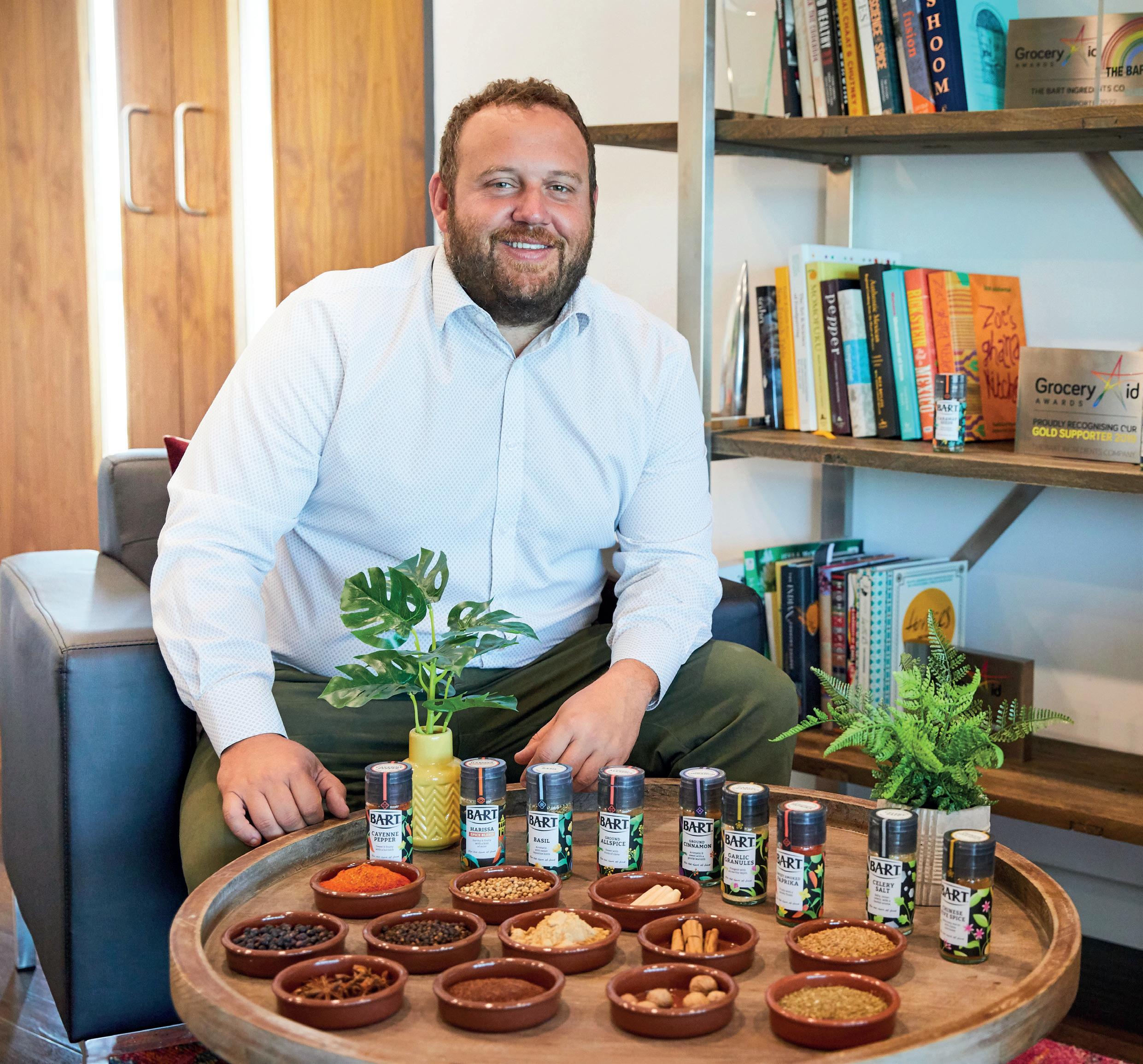
As we travel more, we increasingly cook exotic dishes, and Bart Ingredients is with us every step of the way
By Nicky Godding, Editor
Every kitchen has at least one herb or spice in the cupboard, even if it’s just a little pot of pepper (the best-selling spice in the world).
But if you’re the boss of one of the UK’s most well-known spice companies, you could have 500. Adam Sims, 38, who took over as Chief Executive of Bristol-based
Bart Ingredients earlier this year, must have a very large spice rack to accommodate Bart’s full range (and he does admit his wife groans a bit when he comes home with yet another spice mix).
Adam’s top seat at Bart’s table comes after nine years at the company, most recently as Chief Commercial O cer, but he’s undertaken many roles there, including business development, finance and category insights.
The business was founded in Bristol by Jo and Reg Bartlam in 1963, when the most exotic spices in our kitchen cupboards were probably nutmeg and cinnamon.
But as we all began traveling further afield, our tastebuds got increasingly demanding and by 1983, Jo and Reg had built a factory in the city’s Bedminster area. They sold the business in 2010 and today it’s owned by Germany’s largest spice producer, Fuchs Gruppe.


“I enjoy the food sector and perhaps because I like solving puzzles, I also enjoy navigating the often complex supply chains that are part of it ...”
Fuchs has invested in Bart, including funding a move to a purpose-built 167,000 sq ft site at Severn Beach in 2021 after rising demand saw the business outgrow its Bedminster site. The smart new facility now houses Bart’s entire dry goods business. It has another facility in Newbury which handles wet goods such as sauces, pastes, marinades and relishes.
The move to Severn Beach happened during Covid and with a lot of the production and packaging lines coming from Italy, it was a challenging project to complete, according to Adam.
“Getting engineers over was impossible,
so we had to do a lot via WhatsApp calls. But with sales going through the roof because everyone was cooking from home, we had to get it done to meet a big uptick in demand,” he said.
Adam, who grew up in Portishead, has always worked in the food sector. After completing a degree in accounting and finance at Bournemouth University, his first job was in the accounts department at Dairy Crest in Surrey. With time out to go travelling for six months (including in Jordan and Southeast Asia), he returned to Dairy Crest – this time to the food manufacturer’s site in Frome, Somerset.
In all, he spent seven years at the dairy company, rising to Site Accountant before looking for wider management opportunities elsewhere.
“I enjoy the food sector and perhaps because I like solving puzzles, I also enjoy navigating the often complex supply chains that are part of it. So when the job of Head of Commercial Finance came up at Bart in 2014, I went for it.”
With hundreds of product lines to account for from suppliers across the world he was certainly challenged, but what Bart also o ered was career development.
He explains: “I began learning about all
parts of the business, from products to commercial development, and realised that I enjoyed a wider remit.”
By January last year he had become Chief Commercial O cer and took over as Chief Executive this April.
He says that the backing of Fuchs Gruppe, the second largest herbs and spices manufacturer in the world, is driving growth.
“Fuchs bought Bart in 2017, and the first couple of years were spent integrating the businesses and planning for growth. Then the pandemic hit, during which we moved to our new site, so it’s only in the last year that we’ve really begun to tap into the huge opportunities available to us as part of the bigger group.”
Bart is Fuchs Gruppe’s only UK brand, and where previously it was supplying the UK from Germany, production for some items has now been switched to Bristol, boosting the company further.
In his new role, Adam’s first priority earlier this year was to commission new packaging which pays homage to each spice’s continent of origin and the specific plants which produce the ingredients. The new packaging also has useful tasting notes.
Adam said: “The UK herbs and spices sector has grown by more than £150 million since 2019 and shows no signs of slowing. Within this Bart is currently the fastest-growing brand, with sales increasing more than 60 per cent year-on-year.”
He also wants people in Bristol and across the South West to learn more about and be proud of the business born here 60 years ago.
“We employ around 200 people across both our sites, and we are really proud of where we come from.”
Bart sources its herbs and spices from around 70 countries globally. Most of them are processed in their country of origin to keep them as fresh as possible, and sent to Bart’s Severn Beach facility where they are sorted, bottled and packed for sale.
It also encourages its growers to be as carbon-friendly as possible. “We buy pepper from Vietnam and Brazil, its’ two main growing regions. The pepper vine grows like a totem and many growers have in the past used concrete poles. But as part of the Fuchs Gruppe, we have researched and invested in alternative, better ways to grow pepper and are now encouraging our suppliers to save carbon by growing them against the Mexican lilac – known as the Gliricidia tree.”
Sustainability is a growing focus for Bart. “We have always worked with our suppliers on food safety. Now we also make sure that our sourcing is ethical.”
For Adam it’s all about quality. “We will work with suppliers who achieve the quality we expect. If they haven’t got accreditations such as Fair Trade, Fair for Life or Rainforest Alliance, then we can have a bigger impact by educating and supporting them to become accredited, rather than working with a company which might have a certificate but which we believe isn't supplying the quality we need.
Bart can’t source any of its herbs from the UK at the moment because the country doesn’t grow them in volume, but this is something Adam wants to investigate. “It would be fantastic to collaborate

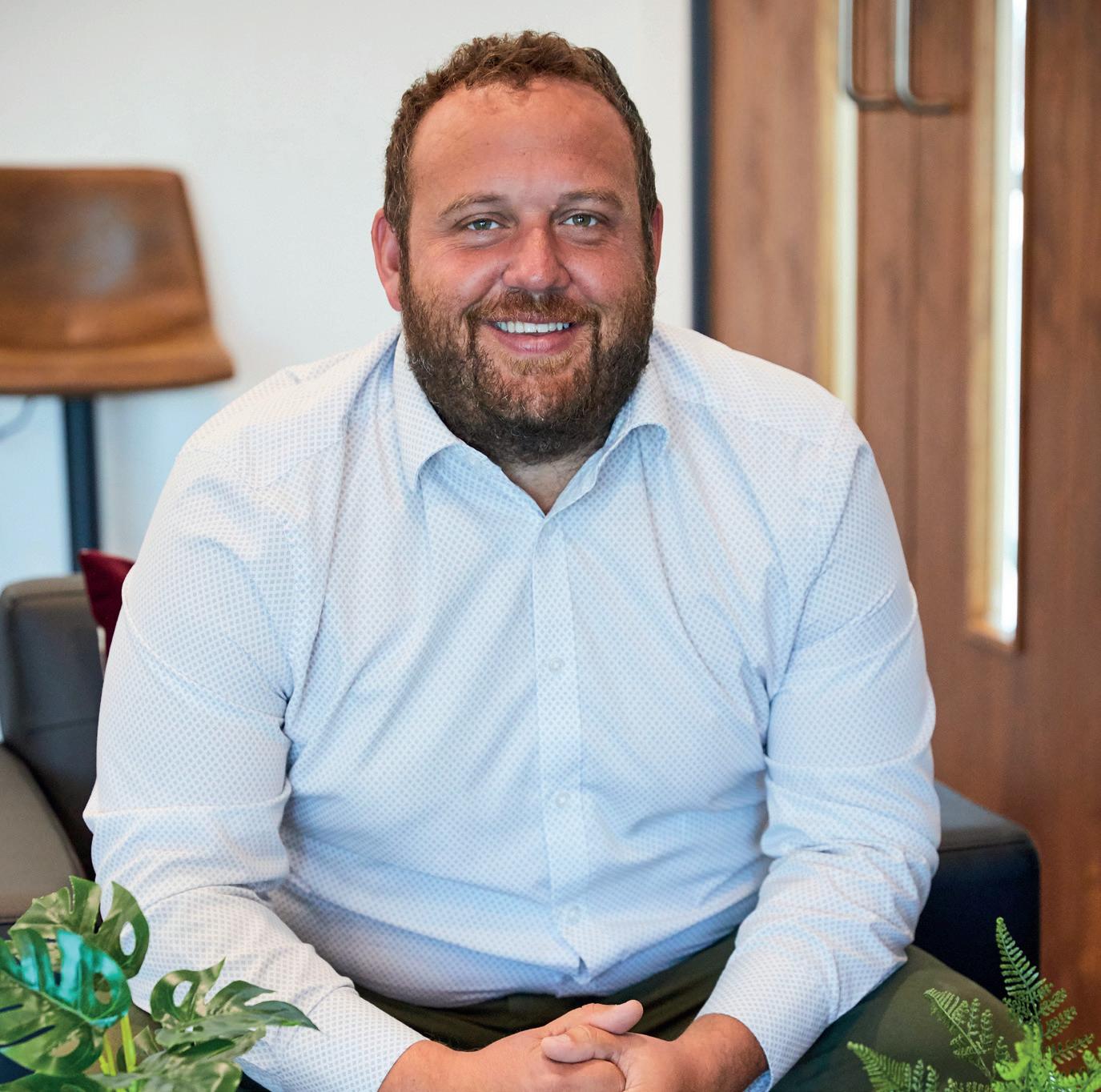







“We employ around 200 people across both our sites and we are really proud of where we come from”

with growers in the UK and I’m open to discussion.”
Over in Newbury, the company’s wet goods make up 20 per cent of Bart’s total business, and this part of the business is growing both in sales and range of products.
The spice company’s turnover was around £50 million last year and Adam is aiming to drive it up to £100 million.
That’s quite a task, but there’s certainly space for growth at the company’s Severn Beach site. Adam is determined to invest in the Bart brand, on which the company’s success was originally built, and encourage everyone who works in the business to come on the journey with him.


“Ten years ago, we were a £10 million turnover company in a small factory in the centre of Bristol. Now we’re a £50 million turnover business in a new factory built for growth. We’re all adopting a new mindset, but we’re not forgetting our roots. Our founders, Jo and Reg Bartlam, came to the opening of our new facility, along with a multitude of people who’ve worked for the company over the years.”
Summer is barbecue time with all the herbs and spices that go with that. But Bart’s busiest time is now, September, in the run up to Christmas and the winter season, when people want warming, well-seasoned stews and curries. What better product to use than a West Country brand which puts quality first?

Worcestershire-based Little Soap Company has launched a new range of “Eco Warrior” baby and child hair and body bars after a year in development.
The new bars mark a significant milestone in Little Soap Company’s mission to eliminate bathroom plastics for the entire family, thanks in no small part to a £50,000 grant from Innovate UK’s Women in Innovation programme.
In the first month on sale, Eco Warrior Baby & Child Edit won Gold and Bronze Natural Beauty Awards 2024 from Green Parent Magazine, along with accolades from The Beauty Shortlist Mama & Baby Awards.
Emma Heathcote-James founded Little Soap Company in 2008 to make pure, natural soap. She began selling the soaps through supermarkets in 2010. Now this

B Corp certified business has four ranges selling across 20 major retailers in store and online.
They are vegan, cruelty-free, RSPO Palm (an organisation which promotes the growth and use of sustainable palm oil products), and made in the UK.
Emma said: "This has been a long and often tricky project to get right and we wouldn’t have been able to do it without the help of Innovate UK.
“The support from the Women in Innovation programme allowed us to formulate and extensively test these bars.
“They have been dermatologically tested, paediatrician-approved and are completely allergen-free so they’re safe and suitable for newborns and up."
A Worcestershire ladder business has been sold to e-commerce business Deligo in a transaction overseen by business sales adviser KBS Corporate.
The Midland Ladder Company, owned by John Humphreys and Melinda Humphreys, was established in 1965. It has developed into an e-commerce retailer of high-quality access equipment including ladders, step ladders, sca olding, work platforms and staircases.
Managing Director John and Financial Director Melinda instructed KBS Corporate to help them sell the business as they were looking to retire, but wanted
the company to fulfil its potential.
Based in Dudley, Deligo is an online supplier of fixings, fasteners and accessories for electrical wholesalers in the UK and Ireland. It distributes 3,500 product lines.
With fibreglass stepladders being among those product lines, Deligo saw Midland Ladder as a good fit to further expand its o ering.
“I am hopeful Deligo will put some energy into the company,” said Melinda. “It needs a young, dynamic, fresh outlook with a greater focus on social media.”
A well-known Worcester law firm has been snapped up by the UK’s fastest-growing regional legal services business, Knights.
Thursfields, a full-service law firm with o ces in Worcester, Kidderminster, Birmingham and Solihull, has been sold for £12.5 million.
In recent years, Thursfields has transformed itself from a traditional law firm into a corporatised provider of legal services with a national client base.
The acquisition brings more than 100 professionals to Knights and significantly strengthens the Group’s presence in the West Midlands.
David Beech, CEO of Knights, said: “We are delighted to acquire Thursfields which shares many cultural and operational similarities to Knights. The purchase significantly strengthens our position as a leading legal and professional services business in the West Midlands.
“With particular strength in private wealth, it further enhances our expertise in an important and growing part of our business, which will support our future growth plans.”
Michelle O’Hara, Managing Partner at Thursfields, added “Knights has a similar ethos to Thursfields, with a strong culture which cultivates collaboration across its o ces, to the benefit of client service. We look forward to working closely with the team and leveraging Knights’ scale, reputation and extensive capabilities, to unlock our future growth potential.”
The deal is expected to complete on September 14.

TV gardener and horticulturalist
David Domoney brought Cotswold Lavender near Broadway to the nation’s screen when he broadcasted a report for ITV’s This Morning programme
David highlighted how essential lavender is for the garden and discussed its many beneficial properties.
Lavender has long been thought to increase relaxation and reduce depression, anxiety and stress. It is also believed to have antiseptic and anti-inflammatory properties.
Cotswold Lavender owner, Charlie Byrd, planted his first lavender in 1999 at Hill Barn Farm. The plant now covers around 70 acres of the
farm and is a firm tourism attraction for the county, welcoming thousands of visitors every year at flowering time in July and August.
It is a commercial, working farm and harvests the lavender every year to produce essential oil and lavender grains to make its products, but it opens a display field of 20 acres of lavender for visitors to enjoy.
Charlie’s family has farmed in the area for the last three generations and moved to Hill Barn Farm in 1994.
It doesn’t just grow lavender, but other crops too, such as wheat, barley, beans and linseed.
Its lavender products are sold across the UK and overseas.
Two businessmen who started their venture in a shared o ce space with a second-hand van, have seen their company, Ignis Group, outgrow a string of premises before securing their own base in a £500,000 property deal.
Terry O’Neill and John Mackin established Ignis Group seven years ago and have built the company into a multi-million pound turnover business.
The business now employs more than 25 sta and maintains around 1,000 commercial buildings throughout the Midlands and surrounding counties, carrying out service, maintenance and installation of commercial heating and hot water systems.
Commercial property agents John Truslove helped the firm find its last base, in Studley, Warwickshire, but only two years into a proposed five-year lease, the continued growth has forced yet another relocation.
This time the company has secured its own premises to support future ambitions.
Terry said: “We needed a dual-purpose facility and somewhere large enough to keep up with the sheer pace of growth in the business.”
The £500,000 investment, along with significant internal modifications and upgrades, gives the company a two-storey headquarters, workshop and stores on the ground floor and o ce space above.
Ignis Group has been appointed as Birmingham City Football Club’s mechanical contractor, responsible for gas infrastructure compliance and maintenance of all heating and hot water services at the St Andrew’s stadium and Wast Hills training ground.
The company was also recently appointed main contractor for the overhaul of the existing heating system at St Andrew’s, part of an ongoing multimillion-pound refurbishment at the club.










































The South West 250 is an annual ranking that celebrates the top privately-owned businesses in the region listed by annual sales turnover. Qualifying companies must be independent and headquartered in the South West region which is defined as Gloucestershire, Avon, Bristol, Somerset (Devon and Cornwall businesses will join the 2025/26 programme).



As a global expert witness and consultancy business, Diales has been providing support and expertise to clients in the construction and engineering industries across the world for over 30 years.
Our skills and knowledge span quantum, delay, project management, architecture, civil engineering, structural engineering, mechanical and electrical services, and power and environmental engineering.
The quality and experience of our people is fundamental to our success. Whether your requirement is for initial commercial and programming support, technical advice or dedicated training at the outset of a project, or dispute management and testifying expert witness services, our skilled and experienced team can assist.
We have experience in projects across the industry, including building, highways, structures, utilities, renewable energy, power, process and nuclear and transportation.
Combined with our in-house IT expertise that allows us to work remotely and handle large volumes of data, our highly qualified team is dedicated to delivering exceptional services on time and within budget.
We create innovative and flexible solutions for our clients. Our company values of innovation, integrity and transparency are the core of what we do.






Bray Leino is an integrated marketing communications agency based in North Devon, with o ces in Bristol, London, North America, and Asia.
We provide an end-to-end service for B2B and B2C clients across healthcare, food & drink, industrial, and beyond. From brand development to digital, activation, events, and one of the largest independent media buying points outside London, our mix of specialist services can be tailored to individual business needs. The result is fluid, responsive, and e ective 360 marketing solutions.
Our award-winning, fame-driving work with consumer brands includes a strong track record of helping regional names grow into successful national and international brands. We are also one of the top 5 UK B2B agencies – and the only agency to have held this position across 10 years, as well as ranking in the top 10 global B2B agencies (B2B Marketing Agency Benchmarking Report 2024).
We drive growth through creativenergy®, by going beyond, to find the most powerful way.

Inspired PLC provides market-leading commercial energy and sustainability advisory services to help our clients achieve net-zero and thrive in the future low carbon global economy. Every business faces unique challenges and over 3,500 organisations have partnered with Inspired to find the best solutions for them.
Our 700+ energy and sustainability experts focus on helping our clients control costs, reduce energy consumption and carbon emissions and remain compliant in the regulatory landscape. We call these challenges the “4Cs” and o er a full range of practical solutions through our four divisions to tackle them: energy assurance services, energy optimisation solutions, ESG strategy, disclosure and impact services, software and technology solutions.
Inspired has held its position in the Cornwall Insight ranking as the leading energy adviser for industrial and commercial consumers since 2018. We value our role in meeting the UK’s climate target and we will be net-zero ourselves before 2050. The steps we’ve taken on our own decarbonisation journey mean we’re ready to lead others towards adapting to a net-zero economy.
Inspired is delighted to support and celebrate the South West 250 ranking.
To view the full list of 250 companies scan this code or visit thebusinessmagazine.co.uk/business-ranking/












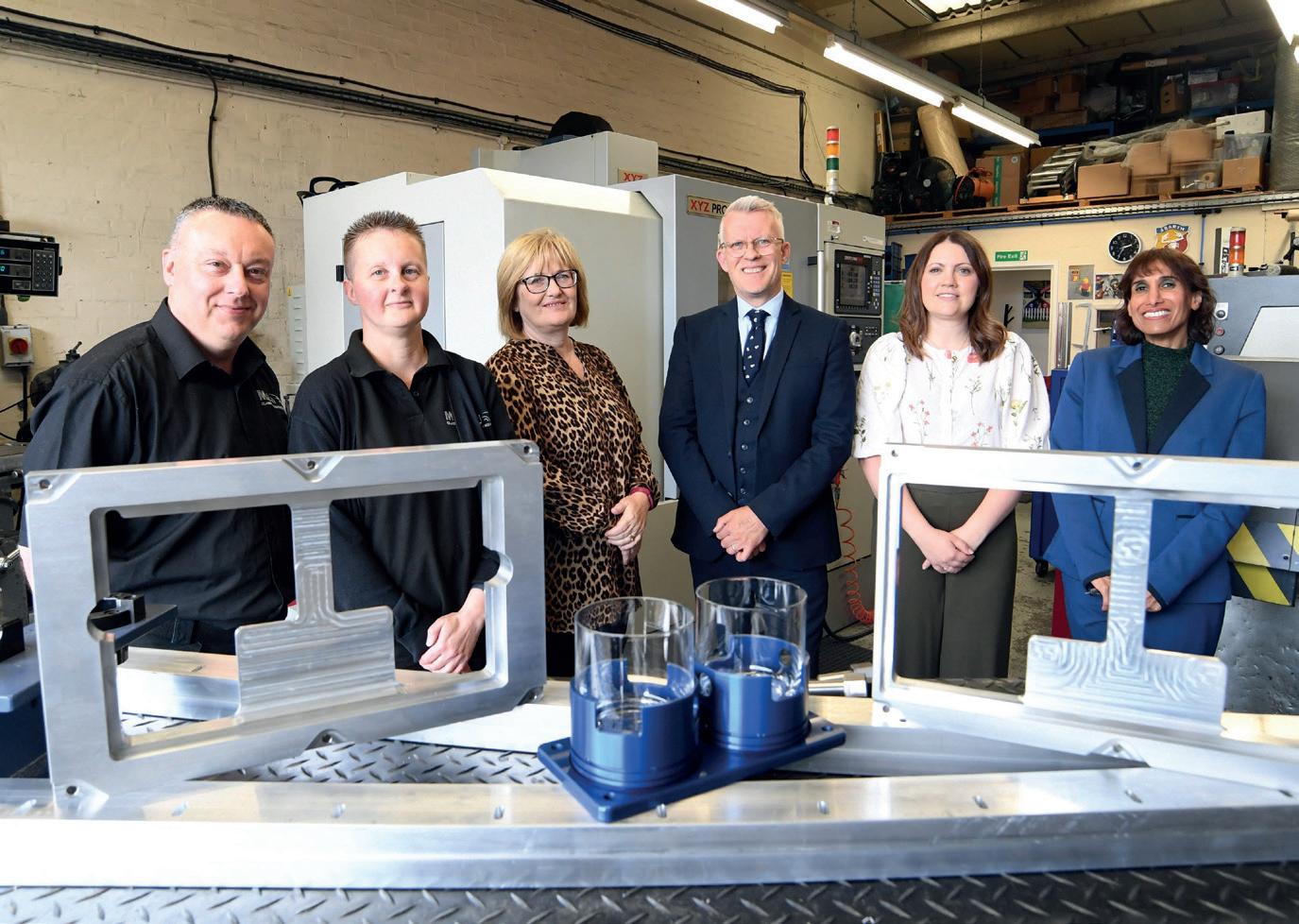
An engineer who set up his own business in Warwickshire after his dad left him some money, is gearing up for a brighter future after making a major investment.
Mario Mclaughlin was left £20,000 in the will of his late father, James, which he decided to invest in launching MJ Classic
Engineering in Nuneaton. The business specialises in bespoke manufactured components for the defence, motorsport and packaging industries as well as classic vehicles.
Thanks to support from Coventry and Warwickshire Chamber of Commerce, which o ered business advice and
workshops on marketing, social media and financial planning, he gained the confidence to invest £30,000 in a VMC machine which cuts materials from plastic to steel. This will help him expand the business further.
He said: “I have always wanted my own tool shop and I have loved working in engineering for the last 30 years.
“When my dad passed away, the money he left me in his will helped me to set up with two machines – and no customers.
“My first customer had a motorbike he wanted customising and he told someone else and word gradually spread.
“We now work with household names in the automotive and manufacturing industry and are gaining more work from the pharmaceutical sector including producing tiny camera holders for ears for MND research. We are also producing stainless steel co n pins and adjustable stops which hold the co ns in place for two well-known funeral directors and hearse manufacturers.
The support was delivered by Coventry and Warwickshire Chamber of Commerce on behalf of Warwickshire County Council and Warwickshire’s five district and borough councils.
Leading Midlands contractor and developer Deeley Group is bringing forward developments worth more than £123 million in the healthcare and later living sector.
Coventry-based Deeley Group has grown significantly in the sector across the Midlands and surrounding areas.
The firm’s growth has been underpinned by sealing partnerships with operators including Exemplar Health Care, Housing 21, Kingsley Healthcare Group and Preferred Homes Ltd.
Its latest partnership with Anchor, the largest not-for-profit provider of specialist housing and care for people in later life in England, will see the delivery of two new schemes worth more than £55 million.
This includes a £35.9 million development of 137 independent living apartments in Sutton Coldfield – which is the largest development in terms of value in the history of Deeley Group’s construction arm.
Following the completion of the current pipeline of schemes, Deeley Group will have delivered 697 extra care apartments and 258 care home beds over the past five years.
Deeley hopes that two further schemes will be confirmed with Exemplar Health Care in the next 12 months. The latest scheme with Exemplar is a £6 million nursing home for adults living with complex needs in Cannock and follows hot on the heels of completion of a £5.7 million refurbishment in Leicester.
Developments have been delivered for Housing 21 in Chipping Norton, Didcot and Telford to enable over 55s to live independently with access to an on-site care team, with work in progress on a 60 apartment Extra Care scheme in Faringdon, Oxfordshire.
Deeley Group is also in the progress of delivering a second development with Kingsley Healthcare Group in Olney, near Milton Keynes, and work is well underway on a first scheme with Preferred Homes in Telford, which is valued at £17 million.
The early success of this development has led to Deeley Group securing a further project with Preferred Homes in Nottingham to deliver 73 one and twobedroom apartments on the site of a former police station.
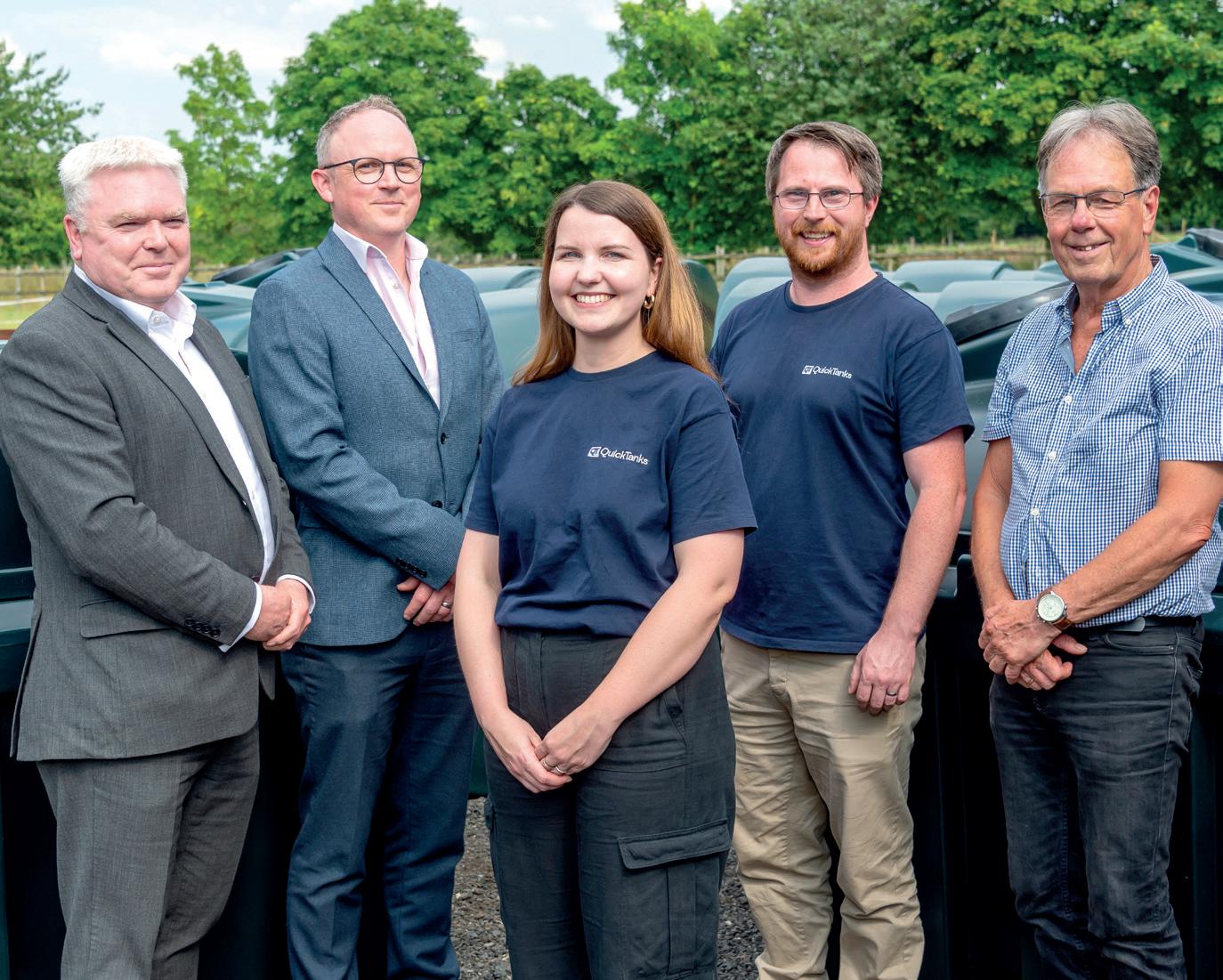

An oil tank supplier based near Stratford-upon-Avon has increased its turnover by more than £450,000 in 12 months after receiving advice on its marketing strategy from a free business service.
Quicktanks, founded by Brendan Mutton in 2019, supplies heating oil tanks to installers and private owners.
Through business support programme Business Ready, Quicktanks overhauled its approach to Google advertising and saw results improve almost immediately.
Brendan said: “Last year sales growth was not where we wanted it to be. I’d worked with Steve Tipson at Business Ready with my other business, Muttons Country Store, so I contacted him again to see if they could assist with Quicktanks.
“We sat down with Steve and looked at our current marketing strategy. After analysing the data, we hired an agency and asked them to deliver
what we had discussed. Sales enquiries surged practically overnight.
“Over the year, it led to an additional £452,000 in revenue – an incredible result.
“We are now thinking about branching out into further types of storage tanks, such as water and septic tanks, at a much earlier stage than before.”
Steve Tipson, business support adviser at Business Ready, part of the Business Growth Warwickshire programme, delivered by University of Warwick Science Park, helped Brendan choose a better agency and improve his digital marketing strategy.
“We aimed to enable a shift in mindset at Quicktanks that allowing a specialist agency to handle a lot of the heavy lifting. Being selective in what you pay for makes good business sense.
“The results have been amazing for Brendan and the team.”
SEGRO, a leading owner, manager and developer of modern warehouses and industrial property, has agreed a deal with Coventry City Council to occupy around 7,000 sq ft of o ce space at Two Friargate.
The deal will enable the relocation of around 25 sta to Coventry as part of a major commitment to the West Midlands region. This builds on existing investment, which includes the delivery of the SEGRO Park Coventry development to the south of the city, adjacent to Coventry Airport.
Two Friargate is one of Coventry’s newest Grade A o ce buildings and the second building to be developed as part of the wider Friargate Business District.
The new Coventry o ce will be home to SEGRO’s national markets team, which primarily develops, owns and manages larger, ‘big box’ warehouses used for logistics. SEGRO intends to invest at least £2 billion by 2033 to build 13.5 million sq ft of modern, sustainable warehouse space across the West Midlands, including SEGRO Park Coventry. These developments are expected to support 14,000 new jobs in the region, across a broad range of employment types, from logistics to R&D to light manufacturing.
The announcement follows one of the UK’s largest energy suppliers, Octopus Energy, committing to Coventry after moving to Two Friargate, along with Ofqual’s move to neighbouring One Friargate.
Cllr Jim O’Boyle, a cabinet member at Coventry City Council, said: “SEGRO is an exciting business with an ambitious growth plan. Already an investor in the city and region, the move to Two Friargate builds on the commitment the business has already made.
“Following on quickly from Octopus Energy’s commitment to Two Friargate, this deal proves that the fundamental benefits of locating a business in Coventry are strong.”


German light alloy wheel manufacturer Borbet GmbH, has bought Dymag Technologies. This acquisition includes the takeover of the Dymag brand, all patents, production facilities and the immediate integration of all 30 or so employees.
Founded in 1974 and based in Chippenham, Dymag is renowned for its innovation and expertise in the development and manufacture of carbon and magnesium wheels for cars and motorbikes.
It produces and supplies BX-F wheels to aftermarket customers in the USA and Asia as well as Tier 1 wheel manufacturers worldwide. The company will continue to develop and market its successful motorbike wheels.
Burkhard Plett, CEO of Borbet, said: "With the acquisition of the Dymag assets we are expanding our portfolio to include carbon and magnesium rims. This strategic decision underlines our aim to be a leader in all key wheel technologies for the automotive industry."
Dymag Technologies will operate as an independent subsidiary of Borbet in Chippenham.

From Avon Protection to Avon Technologies, the Melksham-based company which manufactures respiratory protection equipment for military, law enforcement and fire personnel, is changing its name to embrace the next stage of its development through innovation in technology.
The company has also celebrated winning a £15 million order from the US Defense Logistics Agency for its advanced combat helmet.
Jos Sclater, CEO of Avon Technologies, said: “Our market-leading protection technologies and contract frameworks
Real estate investor The RO Group has acquired a major development site in Swindon.
The Group wants to develop a mixed use scheme at Home Farm, located on the busy A420 Swindon to Oxford road junction.
The prominence and location of the 9.7 acre site o ers potential for a number of di erent uses including roadside retail, industrial, logistics and storage.
The blueprint for the Group’s new development in Swindon is its successful Solstice Park development in Amesbury, which was designed to accommodate a diverse range of businesses.
The Group has a successful history of development in Swindon having previously developed the RO24 industrial scheme at South Marston Park.
position us well in the current geopolitical environment.
“We have successfully rebased the business to create a fitter, stronger organisation and it is encouraging to see the benefits of our transformation plan and continuous improvement culture drive improved financial performance.
“We still have a lot of work to do but are increasingly confident that our strategic initiatives will enable us to meet our medium-term targets.”
Avon Technologies has more than 900 employees across 70 countries.
Nick Cashmore, RO Group Investment Director, said: “We have searched for sites in the South of England and are pleased to have identified the perfect location for our next major development.
“The site on the A420 Swindon to Oxford road makes it an ideal location for a variety of uses.
“Neighbouring occupiers include major retailers such as Sainsbury’s and Dunelm as well regional distribution hubs for Amazon and Iceland.”
Home Farm forms part of the New Eastern Villages development plan consisting of around 8,000 new homes, new schools and community facilities. This is set to be one of the largest greenfield developments in the UK.
RO Group was advised by Loveday, Savills and Osborne Clarke.
A review into the planning requirements for Abbey Stadium at Blunsdon and the surrounding areas conducted by Swindon Council has concluded.
Residents raised concerns that building work had not been carried out or completed in accordance with the planning requirements.
The review highlighted that the work undertaken by Gaming International has met the minimums required through the granted planning permission to date, but nothing more.
Outline permission was submitted back in 2007 for a new stadium, business and training facilities, a care home and 450 new residential homes. In the 17 years since, the permission has been through a number of revisions, amendments and redesigns with phases and plots coming forward.
Leader of the Council, Cllr Jim Robbins, said: “We are disappointed that to date, Gaming International haven’t made more meaningful progress on this phase of development to secure a commercially viable speedway facility at the Abbey Stadium. We know how much speedway means to the fans, and how much it hurt them for the sport not to return after the successful 2019 season. Our administration was elected to lead the Council last year, and at that point, the permissions for the site had been in place for 12 years with speedway already announced as finished at the Stadium.”
“Taylor Wimpey is continuing building the final residential phase at Robin Gardens, leaving just the Abbey Stadium pdevelopment to come forward. It is now for Gaming International, as owners, to recognise the importance of speedway in Swindon and bring forward the final phase for the Abbey Stadium site in line with the existing permission.”

A Marlborough fabric company with a unique take on traditional printing at its Wiltshire factory, has received its King’s Award for Enterprise for this year from the Lord Lieutenant of Wiltshire, Mrs Sarah Troughton.
Fermoie directors Martin Ephson OBE, Tom Helme OBE and Jamie Shawcross were presented with their award at Fermoie’s design studio, production facility and showroom in Marlborough, where it employs more than 50 people.
Mrs Troughton toured Fermoie’s site, visiting its studio and print facility where she saw a preview of autumn launches, and the accessories workshop where hand-made lampshades and cushions were being made.
Jamie Shawcross said: “We were honoured to welcome the Lord-Lieutenant for Wiltshire. I am delighted to see the hard work of our teams recognised by this prestigious award.
“We’ve worked incredibly hard to build our company and develop our export
We’ve worked incredibly hard to build our company and develop our export business, which has grown eightfold in just four years
business, which has grown eightfold in just four years.
“There’s a real appetite among international customers, particularly in America, but also across Europe and further afield, for beauty in design and print. We’re delighted that our hand-drawn artwork, distinctive colours and beautiful fabrics, all manufactured here in the UK, have found such a receptive audience right across the world.”

A manufacturer of water and space heating systems has opened a new 10,000 sq ft academy at its Warwick HQ, increasing its annual installer training capacity on the site from 600 people last year to 2,000 in 2025.
For the first time, a Baxi training facility will allow installers to get hands-on with Baxi’s complete residential and commercial product portfolio under one roof.
The company’s new facility includes a fullyequipped digital studio to support Baxi’s new e-learning platform, to be launched later this year. Installers will be able to access live virtual training.
Baxi is also expanding its nationwide team of 10 expert trainers. It expects to have the capacity to physically train 10,000 installers a year by 2025, with an additional 5,000 installers benefiting annually through Baxi’s e-learning platform.
The company’s new focus on solutions training, alongside its traditional product training, is expected to be replicated in Baxi’s other main training centres in Warrington, Dartford and Dublin. The Warwick investment is the blueprint for future facilities.
The purpose-built facility opens just as the UK Public Accounts Committee reports its concerns that critical targets for heat decarbonisation will be missed.
At the same time, a report from the consumer rights group, Which?, concluded that the successful decarbonisation of buildings will only be possible if professionals are equipped with the right skills.
It recommends that installers sign up to a mandatory accreditation scheme, designed to create a universal skills standard to work with new technologies.
Pineapple Recruitment has become the latest business to back an initiative providing work and educational opportunities for young people across Bristol who often face inequality and racial discrimination.
The Worcestershire firm, which supplies talent to the UK’s hospitality and catering sectors, is supporting the Bristol Future Talent Partnership, a network of organisations which works with 14 to 21-year-olds from black and ethnic minority backgrounds to provide them with jobs and career breaks.
The team from Pineapple became involved with the partnership through its links to the catering industry. Three of its experts gave their time free to support 10 young people at a recent event.
These volunteers helped to write and improve CVs, gave advice on how to find and apply for suitable roles and practised interview techniques.
Kasia Krieger, business manager at Pineapple Recruitment, said: “We work with hundreds of job candidates every day across the country, so it was such an easy decision to join the Bristol Future Talent Partnership and throw our support behind what we know is a wonderful initiative.
“More than anything, it means a lot to be involved and we hope to play our role in preparing dozens of local young people for work, with advice around CVs and how to handle interviews being two key elements.
“What’s really amazing about the partnership is how it focuses on opportunities for young people who have been facing tough times. It builds on work we’ve done in other areas of the South West, Gloucestershire and Worcestershire with young people and ethnic minorities, and we feel we can play our role in helping as many people as possible.”
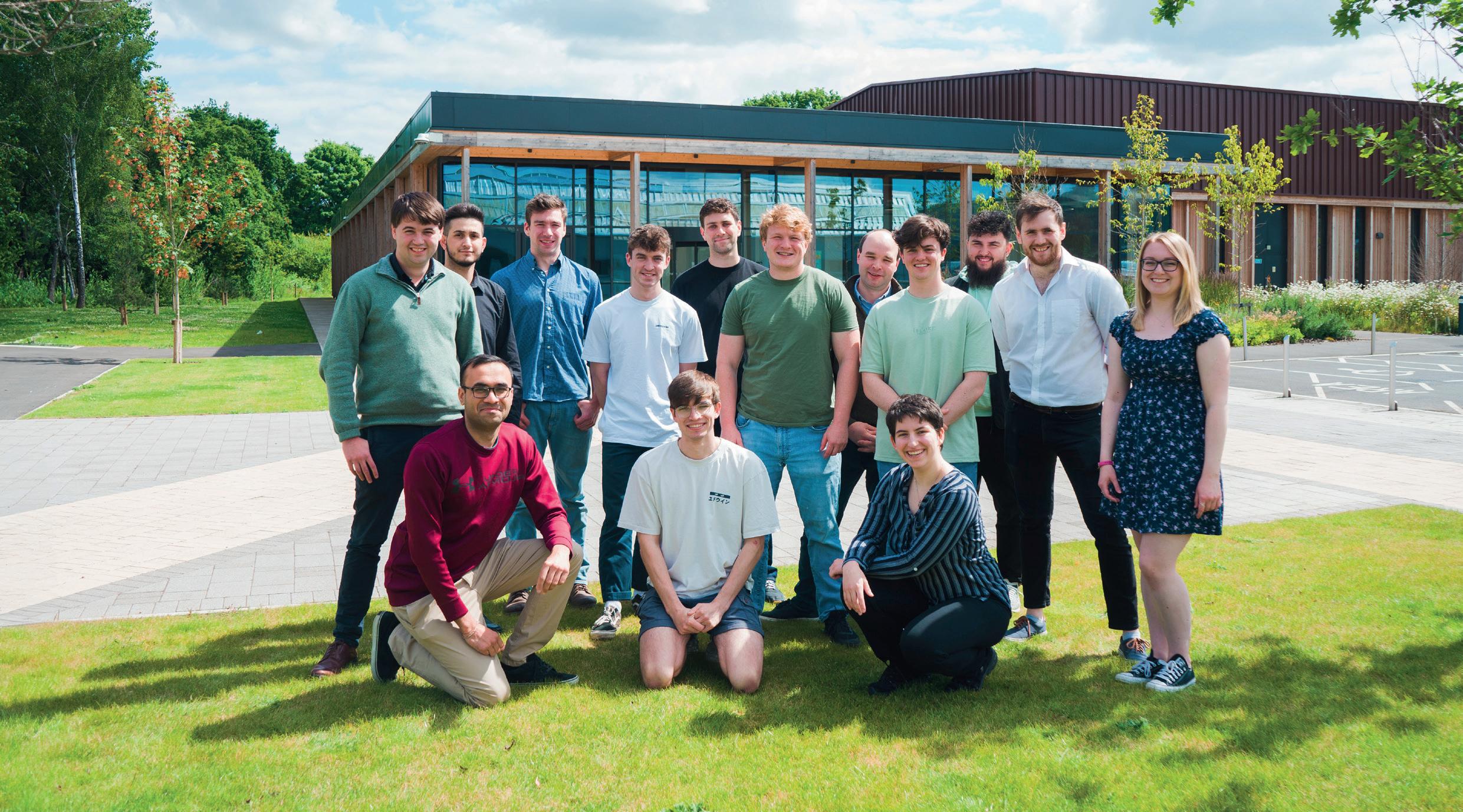
The Hereford-based New Model Institute for Technology and Engineering (NMITE), which only opened in 2021, has reached a significant milestone as its first students enter the workplace. Among the first to complete one of its innovative degrees are individuals who have secured positions in industry at Balfour Beatty, KIER, Mondelēz International and Oakwrights.
The Institute’s curriculum is hands-on and project-based to help students gain realworld experience from day one.
President and Chief Executive, James Newby, said: “Our first cohort of graduates represents the culmination of years of dedication and innovation in engineering education. Their success is a testament to NMITE’s academic rigour and unique learning model, which emphasises practical experience, problem-solving skills and close collaboration with industry partners. Our students were willing to accept the challenge of joining a new institution and they, like our sta , have worked incredibly hard to turn our model into a reality.”
Tom Newton, Engineering and Design Director at Balfour Beatty, said: “This is an incredibly proud moment for everyone at Balfour Beatty. Over the last 12 months we have actively contributed to the NMITE curriculum through our partnership, supporting teaching modules
and outlining what it takes to work in our industry. With the first cohort of students now entering employment, the proof is in the pudding – alongside our colleagues at NMITE, we have successfully delivered what we set out to, opening doors to young people and arming them with the tools needed to excel in their careers.”
Fin Neate, who lives in Herefordshire, previously studied primary education. She has now landed a coveted role as an engineering and manufacturing graduate at food company Mondelēz International. She said: “I never considered a career in manufacturing until I participated in NMITE’s project-based challenge on the subject. The feedback I received during my job interview was overwhelmingly positive, particularly highlighting my experience at NMITE and my ability to solve real-world problems.” Fin will graduate with an MEng (Hons) Integrated Engineering degree.
Elise, who will be joining Balfour Beatty as a graduate engineer, has had a longer relationship with NMITE, having been part
of the Design Cohort in 2018. This group of 25 school-leavers and graduates codesigned NMITE’s learner experience in support of its aim to become a university for the future. The cohort helped to create and test drive everything from campus layout to course design, marketing the engagement programme and building partnerships with businesses.
Elise then joined the pioneer cohort as student number one: “From being part of the original design cohort to now graduating and achieving my dream of working in engineering, NMITE has been an incredible journey.”
Elise will graduate with an MEng (Hons) Integrated Engineering degree.
Tom Newton, Engineering and Design Director at Balfour Beatty said: “We are looking forward to welcoming Elise to Balfour Beatty in the coming months, where I am confident she will thrive.”
The institute aims to bridge the gap between traditional engineering education and the demands of the modern workforce. By o ering an accelerated MEng degree, alongside a BEng, students can enter the workplace earlier. It also allows those who may not be able to a ord the traditional Masters route access to a degree that promises to get them work-ready.

01 Akshay Khera appointed head of BDP’s Bristol studio
Akshay Khera has been appointed Head of the Bristol studio of global design practice BDP.
Akshay joined BDP Bristol in 2004 and in 2010 went on to lead its Delhi and Abu Dhabi studios where his international portfolio included the masterplan for the Indian Institute of Technology and the University of Birmingham’s Dubai Incubator campus. He returned to Bristol in 2019.
02 Hazlewoods makes two substantial appointments
Hazlewoods has made a significant investment in its leadership and corporate finance teams with the appointment of Phil Lane (far right) and Pete Muldrew (left) from Deloitte.
Phil, who was previously a Partner at Deloitte, joins the leadership team as Partner and Chief Operating O cer. He will also work with the corporate finance team.
Pete Muldrew joins the corporate finance team as a director.

03 Former Dyson and Great State Talent man joins Aer Studios
Box-based creative technology business
Aer Studios has appointed James Hobbs as Head of Technology. He spent six years at Dyson where he led the global digital technical team. At Great State, James drove the company’s technology strategy. James (above right) is pictured with Aer Studio’s Managing Director Tom Harber.

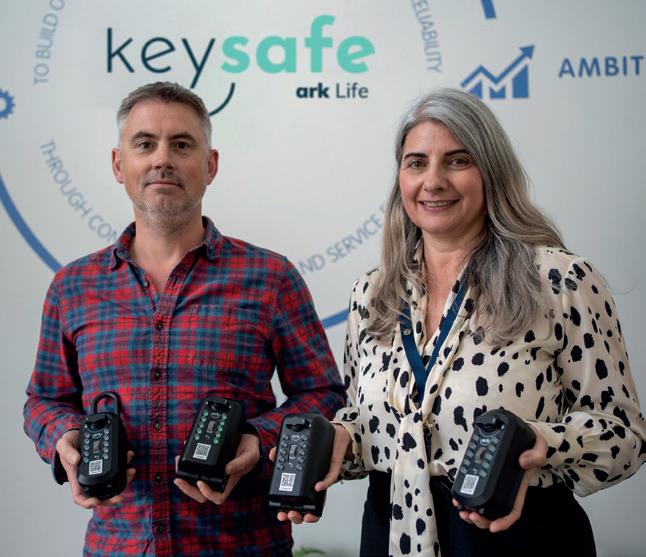
The Worcester-based Key Safe Company has appointed James Buckle to orchestrate the firm’s expansions plans overseas. Loredana Sciara a has been hired as EU Business Development Manager. After spending more than eight years in the Army, including in Afghanistan and Sierra Leone, James began working in the defence sector focusing on international trade. Italianspeaking Loredana has held posts as a product manager and even worked as a victim support manager for the police.
05 Lara Bealing joins Gloucester insurer as Marketing Director
Ecclesiastical Insurance has appointed Lara Bealing as UK Marketing Director. Lara will lead the marketing team. The specialist insurer aims to double the size of its business as part of its mission to give more to good causes. Lara has spent 30 years working in insurance and financial services for Aviva, Friends Life UK, and AXA. Most recently, Lara was the UK Marketing Director for Canada Life.

06
Head of AIM Investments parachutes in at Blackfinch
Gloucester-based Blackfinch Group has appointed Chris Swanepoel to the new position of Head of Alternative Investment Market Investments.
Adding a unique perspective to his professional journey, Chris was conscripted for two years into the South African parachute battalion, an experience he says equips him with resilience and a global outlook.

07 BDO makes South West partner hire Accountancy and business advisory firm
BDO LLP has expanded its South West team with the senior appointment of Jamie Smith as Partner. Jamie brings 17 years’ experience in helping a wide range of audited entities. He was previously a director at PwC.

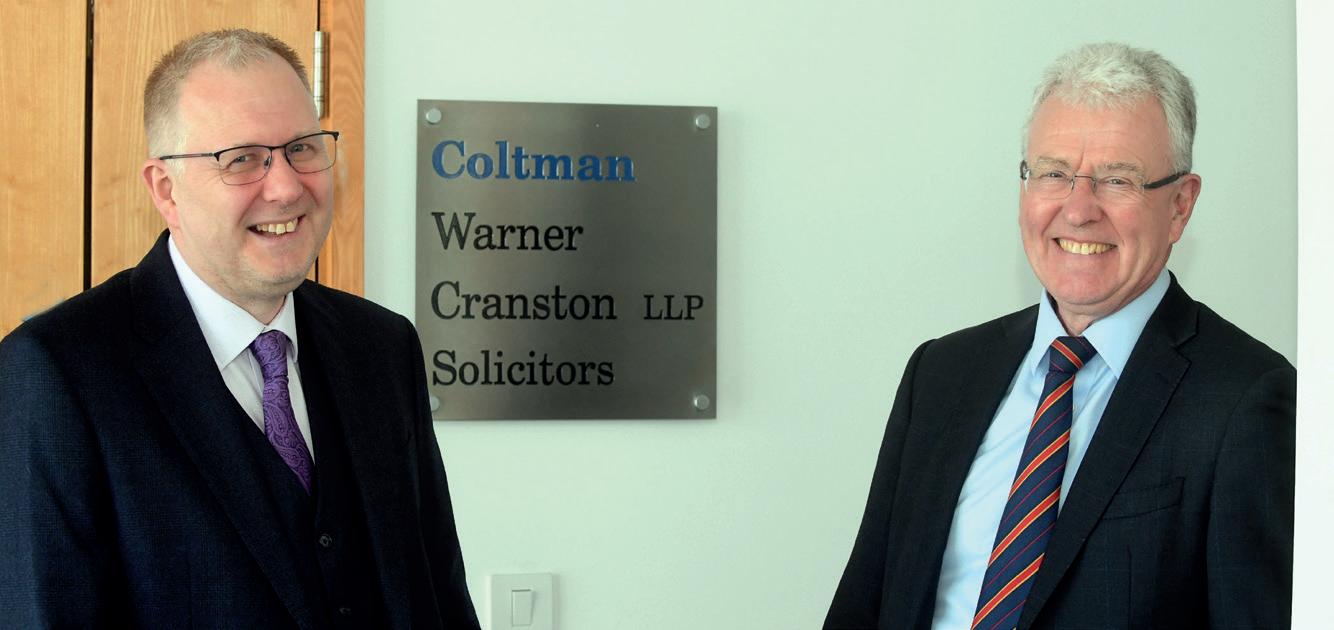
08 Davoile to step into Coltman’s shoes as he signals retirement
A Midlands debt recovery firm is preparing for a changing of the guard at the top of the business.
Darren Davoile (above left) will head up Coventry-based Coltman Warner Cranston from the start of 2025 when Larry Coltman (above right) calls time on a 42-year career.
09 Destination Coventry as Paul follows the Pope Paul McMahon has joined Destination Coventry as its new Managing Director.
He was previously Chief Executive of easyMarketing, part of the Easy Group and a director of an international coaching business. Paul is from the West Midlands and his first visit to Coventry was in 1982 to see Pope John Paul II visit the city.
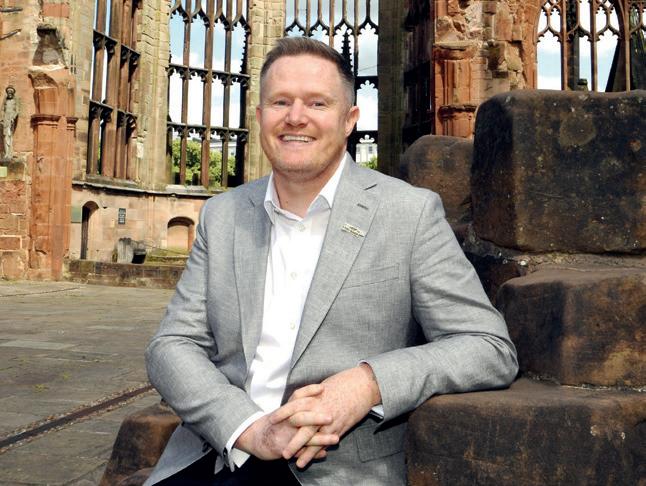
10 Ambitious growth sees new hires and promotions
Ambitious, the Bristol B2B and corporate communications company, which says it is on track to achieve more than £2 million in revenue this year, has made a number of hires. Laura Lear (centre) has been appointed Deputy Managing Director, Amy Ferrier (right) has been appointed Production Manager and Associate Director Dani Andres (left) has been promoted to the role of Campaigns and Community Director.
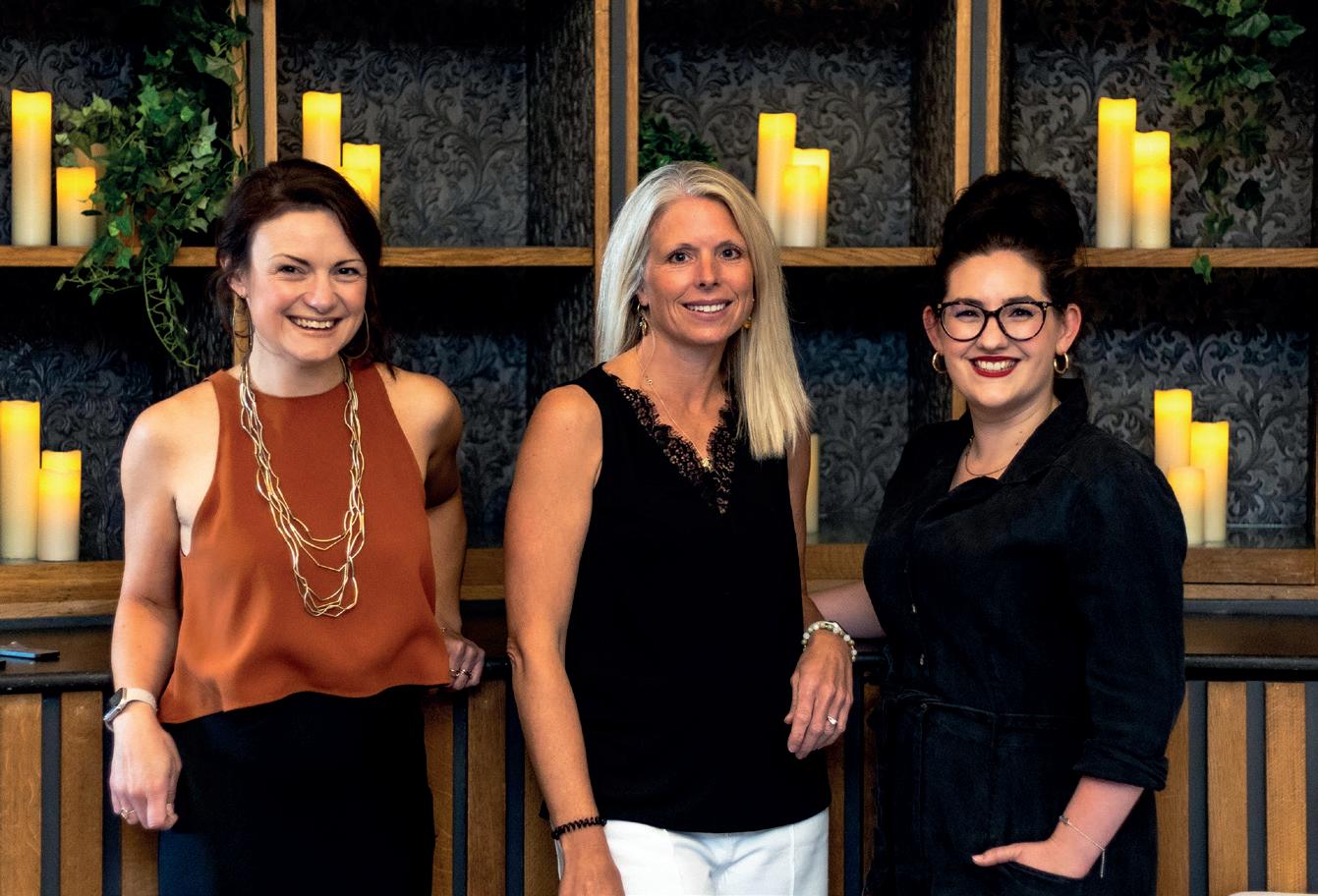


Cheltenham's Golden Valley cyber development is advancing again. The borough council has signed a Memorandum of Understanding with the government's department for levelling up, housing and communities to secure the £20 million provisionally allocated to the scheme from the latter's levelling up fund.
And developer HBD, appointed in 2022 to develop the first phase of the £1 billion project, has appointed architects Sheppard Robson to lead the design of its second phase of the landmark scheme.
The Memorandum of Understanding paves the way for the council to start drawing down funding to help deliver the first phase – the construction of the National Cyber Innovation Centre.
Gareth Edmundson, Chief Executive at Cheltenham Borough Council, said: "The Golden Valley Development is moving forward at pace and the £20 million levelling up funding builds on the significant investment already made by the council to deliver this pioneering project.
“It will transform west Cheltenham into an internationally recognised tech and security community with the National
It will transform west Cheltenham into an internationally recognised tech and security community ...
Cyber Innovation Centre at its heart.
"The Golden Valley Development will help deliver jobs, housing and prosperity to Cheltenham."
The plan is for an innovation district covering land spanning 47 hectares and includes more than one million sq ft of commercial space.
The aim is to attract businesses with a focus on science and technology, building on the existing specialist cluster in cyber and the emerging AI, deep tech and future computing and quantum sectors.
Developer HBD X Factory Ltd will deliver the Golden Valley project, alongside Cheltenham Borough Council and local partners.
Grown in Cheltenham, a business support programme run by tech organisation Hub8 by Plexal, Cheltenham Borough Council and the county’s Growth Hub, has welcomed three Gloucestershire founders to its first cohort.
The Grown in Cheltenham initiative o ers six months of free support, from building a customer roadmap and making their first hire to business guidance. And founders can still apply.
The cohort includes Alice Violet, Founder and Creative Director of Alice Violet Creative. Alice wants to make cyber security more engaging, with her Cyber Made Human podcast where she chats with industry leaders.
James Campbell, Co-founder and CEO of Growm creates lifelike 3D, virtual and augmented experiences to boost customer engagement – bridging the gap between physical and online shopping.
Ollie Johnston, Adam Westrope, Rebekka Bishop and Andy Fellowes, Co-founders at Zest Intelligence o er specialist management consultancy services to sensitive and highly-regulated industries. It does this by implementing data management, digital transformations and cloud strategies, incorporating AI, data analytics and more.
The first South West of England Tech Prospectus, commissioned by Tech South West and published this summer, has revealed for the first time the scale of the blue (marine) and green economy across England’s largest region.
The South West tech sector has grown to some 18,527 companies, with a collective turnover last year of £46.7 billion, according to data supplied by research company Beauhurst. A total of 3,962 of these companies operate in the net zero tech sector, producing a collective turnover of just over £24 billion.
Companies such as Altilium, Kelpi, Additive.earth, Cleaner Seas Group, LettUs Grow, Oxi-Tech, MolendoTech and ARC Marine are operating globally across marine tech, agri tech and climate tech, and have already raised tens of millions of pounds in investment from UK and overseas investors, alongside government funding.
Dan Pritchard, founder of Tech South West, said: “We have powerhouse universities, specialist tech hubs, plus UK and global environmental organisations, along with world -class research centres in the region. The growth is incredibly impressive, the opportunity immense and the work vital if we are to tackle some of the world’s most pressing issues.”
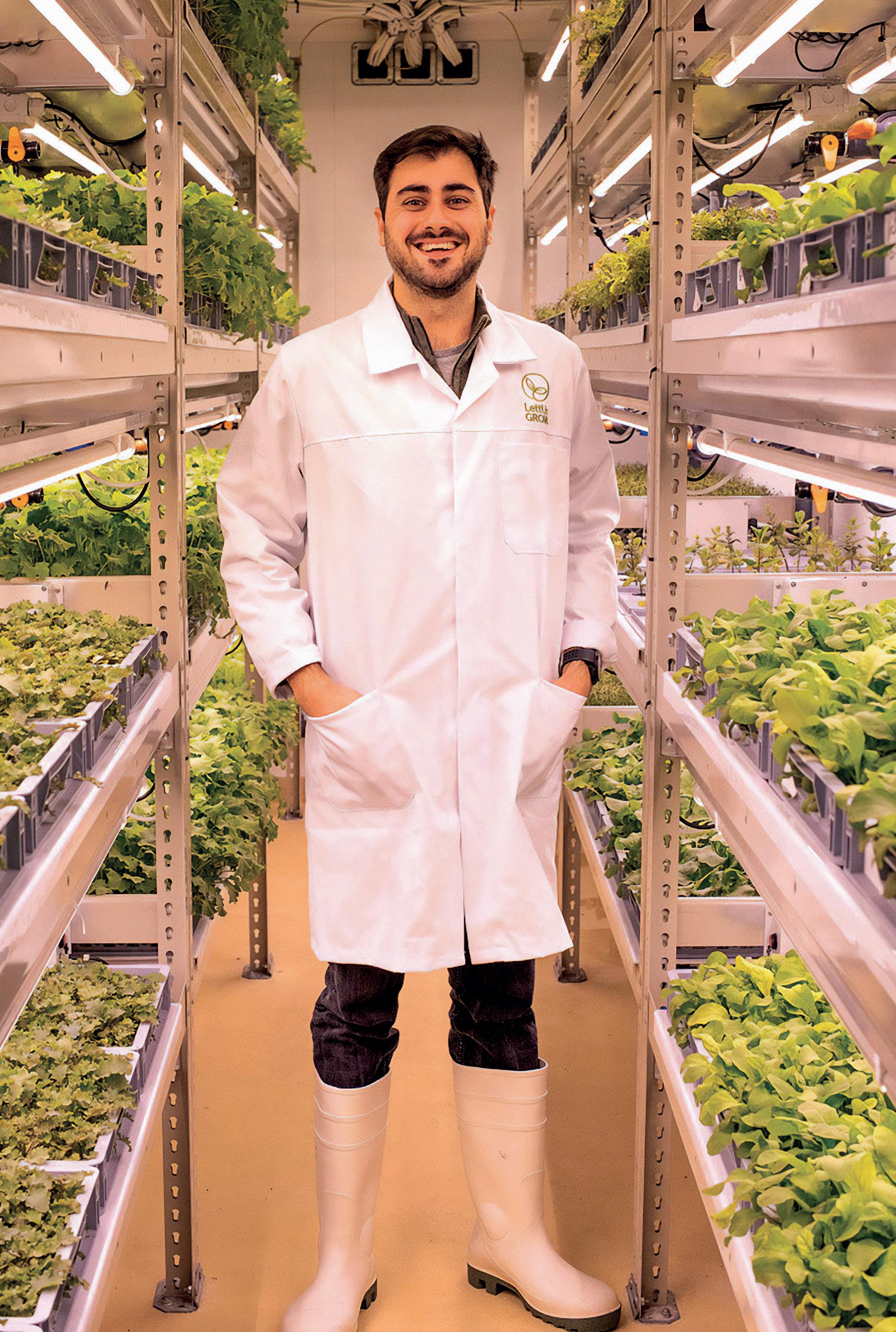
The prospectus highlights the region's limited funding from government. The first nations and regions growth funding allocated to the region only went live in 2023, years after the first Northern Powerhouse and Midlands Engine funds. And it is a fraction of the amounts pumped into those funds and more recently launched successor funds.
Dan added: “London gets more than 80 per cent of UK tech venture capital investment, and yet South West tech firms have a better success rate – they are 17 per cent more likely to be operating
after five years than if they were based in London. Imagine what we could do together with just a fraction of London investment if it was redirected to the South West.”
The prospectus sets out opportunities for investment and collaboration and calls for key changes in how the UK regions’ tech sectors can be supported better.
Those recommendations include a new government fund to start levelling the playing field, 20 per cent larger than the current £200 million South West
Investment Fund, alongside an investment focus on blue and green innovation –renewable energy, sustainable mining and battery technology – and recognising the region as a national centre of excellence.
Ben Cooper, Tech South West Director and Funding and Finance Lead, said: “To achieve the UK’s net zero targets, be a true international leader and transition to a fully digitally-enabled and skilled society, the new government must provide longterm certainty for the regions with clear strategies that give confidence to public and private investors, including early and pre-market engagement to signal the direction of travel and future technologies.
London gets more than 80 per cent of venture capital investment into UK tech, and yet South West tech firms have a better success rate ...
“We need to enhance access to capital for the full growth journey, promote tax incentives and co-investment schemes, and ensure the government’s policy of promoting private investment into innovative, hi-tech businesses, is aligned with the regulatory treatment of that investment into early stage seed funds and direct angel investing. We need to continue to re-focus away from property and pension investment, towards earlystage tech investment.”
Professor Matt Freeman, Centre Director at Future Space Bristol, coordinated the research on the prospectus.
He said: “What the South West’s tech sector has achieved with comparatively little government investment is truly astounding. Having a prospectus that clearly shows the strength and power of what the region is capable of is important for so many reasons.”
Work starts on new home for UK's most powerful nuclear magnetic resonance instrument
Work has started to create a home for the UK’s most powerful nuclear magnetic resonance (NMR) instrument at the University of Warwick.
Coventry-based Deeley Construction has started work on a new building which will house the 1.2 GHz NMR spectrometer.
The spectrometer is funded by UK Research and Innovation (UKRI) and will be provided by Bruker, with additional MAS probes from Phoenix.
Work is expected to finish on the new single-storey building, which includes a magnet hall, control room and plant room, by early next year with the spectrometer installed by the middle of the year.
The instrument will allow the University of Warwick to carry out advanced research in how to make more e cient plant biofuels, improve batteries and solar cells.
Scientists from around the country will be able to use the instrument, alongside students from the University of Warwick and other universities. There are currently only seven other machines in operation across the globe.
Professor Steven Brown, Department of Physics at the University of Warwick, said: “This resource for the scientific community nationally will enable applications from pharmaceuticals to solar cells, from batteries to plant cell walls.”
The building is being constructed next to the existing NMR facility which accommodates a one GHz solid-state NMR system and was completed in 2020.
GenomeKey awarded $11.4m to transform sepsis diagnosis and treatment
GenomeKey has been awarded a major grant from the Boston, USA-based Combating AntibioticResistant Bacteria Biopharmaceutical Accelerator (CARB-X) to build a functioning, automated prototype of its desktop diagnostic device.
The Bristol company, which has been supported by South West tech support organisation SETSquared since 2020, is building an in vitro diagnostic device that would transform the way we diagnose and treat sepsis and other bacterial infections.
GenomeKey’s next-generation device will be able to detect and identify bacteria directly from patient blood, delivering a full antimicrobial resistance profile in hours.
Dr Michael Roberts, GenomeKey CEO, said: “Right now, the gold standard test takes too long and has a high falsenegative rate.
"We’re giving clinicians the information they need much faster, so they can deliver rapid diagnostics testing and precision medicine for a more targeted treatment.
“We live in an exciting time for medical science, where the twin revolutions in next generation sequencing and machine learning now make it possible for us to identify and profile bacteria directly from patient blood accurately and cheaply.
"We’re on a mission to fight the global threat of antimicrobial resistance.”
Erin Du y, Chief of R&D at CARB-X, said: “It is imperative to direct treatment quickly, and GenomeKey’s technology has the potential to help practitioners direct the appropriate treatment."
Hooray Recruitment (Gloucestershire)

has been acquired by Thomas Recruitment Group (Wales)
Buyside advisers include: BPE (legal)
Sellside advisers include: Kidwells Solicitors (legal)
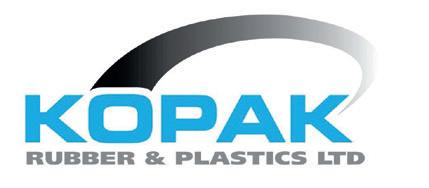
has been acquired by Rubber products supplier SJG International (Warwickshire)
Sellside Advisers Include: Watersheds (corporate finance), Machins (legal)
Condies Chartered Accountants (Fife)

has been acquired by Accountants Dains Group (West Midlands)
Byside advisers include:
DSW (financial and tax), Forward Corporate Finance (Financial Modelling), Deloitte (Tax structuring), CMS (Legal)
Sellside advisers include: Curle Stewart (Legal)

has received investment from Maven Capital Partners (Lanarkshire)
George Wilson Industries (West Midlands) Healthcare firm Covestus (Gloucestershire)
Exact Logistics (Warwickshire)

has been acquired by OnLogistics (West Midlands)
Sellside advisers include: KBS Corporate (corporate finance), Alston Asquith (legal), Burgis & Bullock (due diligence)
Byside advisers include: 43 Legal

has been sold out of administration to Vantage Capital (London)
Sellside Advisers Include: Begbies Traynor
Broadband provider Brsk (London)

Buyside advisers include: Gateley (legal) has merged with Broadband provider Netomnia (Gloucestershire)
Byside advisers include: Freeths

has been acquired by HSL Compliance (West Midlands)
Byside advisers include: Menzies (financial DD), HCR Law (legal)
Sellside Advisers Include: DTE Corporate Finance, Slater Heelis (legal)
Armour manufacturer Jankel Armouring (Surrey)

has sold assets out of administration to Armour systems provider NP Aerospace (West Midlands)
Sellside advisers include: Alvarez & Marsal Europe LLP (administrators)


has been acquired by Automotive interior specialist Poltrona Frau (Italy)
Vehicle upholsterer KJ Ryan (West Midlands) Thursfields Legal (West Midlands)

has been acquired by Engineering consultants Wintech (West Midlands)

has been acquired by Distributor Deligo (West Midlands)
(Gloucestershire) Online retailer Midland Ladders (Worcestershire)


has been acquired by Legal firm Knights (Tyne and Wear)
Sellside advisers include: Deutsche Numis (Nomad and Broker)
Property consultancy Parity Projects (London)

has been acquired by Property data firm CoreLogic UK (West Midlands)
has been acquired by Insurance company Partners& (Buckinghamshire)
Byside advisers include: Michelmores (legal)

has been acquired by Data compliance firm Celnor Group (London)
Sellside advisers include: HCR Law (Legal), Bishop Fleming (Legal)
Vendor Clarity Software (West Midlands)

Sellside advisers include: KBS Corporate has been acquired by Software services firm Inktavo (United States)
Sellside advisers include: Freeths (legal), Clairfield (corporate finance)
Electrical safety specialist Remlive (West Yorkshire)

has been acquired by Machinery safety firm Fortress Safety (West Midlands)


Tewkesbury-based alternative network (altnet) Netomnia has merged with Brsk.
Altnets build high speed internet in regions the big providers don’t necessarily service.
Netomnia and Brsk are among the fastest-growing altnets in the UK. So far they have built a combined network of 1.5 million premises and 140,000 customers using £300 million of debt.
The companies plan to use up to £900 million in debt to grow the footprint to three million premises by the end of next year.
Since 2020, Netomnia and Brsk have raised more than £1.3 billion of capital, supported by investors Advencap (shareholders of both Netomnia and BRSK), DigitalBridge and Soho Square Capital.
DigitalBridge and Advencap will be
committing additional equity funding as part of this raise.
Netomnia recently secured an additional £147 million in debt from new lenders, JP Morgan and Rand Merchant Bank who have joined existing lenders.
The overall deal will involve Brsk moving under the umbrella of Netomnia’s parent holding company, Substantial Group, but run as a separate entity with Giorgio Iovino, Brsk’s Chief Executive, remaining in the role.
The private equity group at national law firm Freeths advised the Substantial Group management team on the merger.
Jeremy Chelot, Founder and CEO of Netomnia and its sister company Youfibre, said: “The Freeths team, led by Malin Svanberg Larsson, have been hugely impressive, consistently providing strategic, commercial advice to ensure the transaction was successfully delivered against a sharp timetable.”
The owners of a Hertfordshirebased rubber manufacturer are set to retire after selling their business to Warwickshire manufacturer SJG International.
The deal will allow Peter and Jane Estwick, owners of Kopak, to retire.
Originally founded in 1968, Peter acquired Kopak in 2002. He had had worked in the rubber products sector for 25 years.
The couple built the business into a market-leading provider of technical products made from natural and synthetic polymers for markets including automotive, classic cars, heavy plant machinery, wholesale electrical and van conversion.
As both a supplier and customer of Kopak, SJG International and its managing director Robert James knew the business well and saw potential to consolidate the supply chain.
Corporate finance firm Watersheds supported Kopak in the deal.

Poltrona Frau, part of the USA-based Haworth Lifestyle Group – a portfolio of commercial interiors and lifestyle brands, is set to acquire a majority stake of Coventryfounded KJ Ryan Ltd.
The latter develops and manufactures high-end interior components for luxury cars and will become part of the Interiors in Motion Business Unit of Poltrona Frau based in Tolentino in Italy.
It was founded by Kevin Ryan in 2007 and currently employs more than 150 specialised workers.
Kevin will continue to work under the new
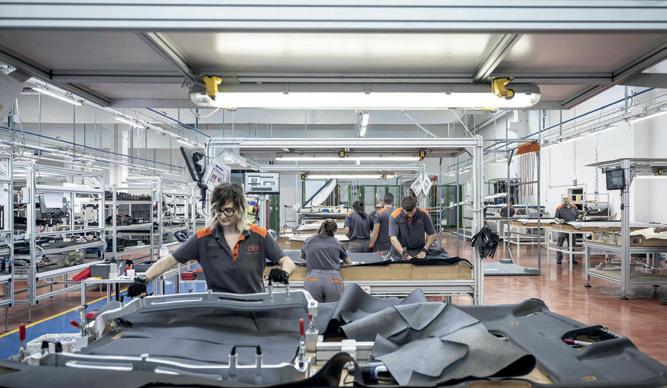
The combined entity aims to become a European leader in the development and manufacturing of interiors for luxury and bespoke vehicles. It has a turnover of around €120 million, more than 600 employees, and three manufacturing plants in Italy and the UK.
Ervino Riccobon, CEO of Poltrona Frau Interiors in Motion, said: "With the acquisition of KJ Ryan we will significantly strengthen our ability to partner with leading car makers in designing and developing interiors in one of the world’s most important markets for luxury and bespoke cars."
Maven has invested in Covestus, the owner and operator of brands in the consumer healthcare and pharmaceutical products space.
Cheltenham-based Covestus is led by Dan Thomas, former Chief Corporate Development O cer at Alliance Pharma Plc, where he successfully completed more than 24 mergers and acquisitions.
Throughout his time with the group, its revenue grew from £16 million to £170 million.
Covestus completed its first acquisition in 2018 and its portfolio includes the brand Sweat Guard, o ering a portfolio of products to support su erers of hyperhidrosis.
The funding will support Covestus’ ambitious buy-and-build strategy.
It has already enabled the acquisition of Probio7, a leading UK probiotic brand supporting gut health.
Dan Thomas, CEO at Covestus, said: “We look forward to working with the Maven team over the coming years, building and executing a clear strategy of targeted acquisitions to build scale for the group and a leading organisation in the South West.”
The transaction included investment from Maven Investor Partners and SWIF Maven Equity Finance, part of British Business Bank's South West Investment Fund and managed by Maven.
Jonathan Oliver, Investment Director at Maven, said: “Covestus’ focus on smaller health and wellness brands where value can be added through active portfolio management sets it apart from many of its larger peers.
“Maven believes the new capital will help accelerate growth initiatives and support Covestus in building a high-quality portfolio of growing consumer health and pharma assets.”
Leading insurance advisers Partners& has acquired Cheltenham-based, private medical insurance company Switch Health.
Switch Health has since grown to become a 15-strong team..
High Wycombe’s Partners& hopes the acquisition will help it take advantage of an anticipated growth in the individual private medical insurance market.
Phil Barton, Group CEO of Partners&, said: “We recognise that increasingly clients are looking for the right advice in terms of their healthcare options, and we are positioning ourselves to be the adviser they feel confident turning to.
“Healthcare is at the front of people’s minds today, and the expertise and track record for exceptional service provided by Jack and the team at Switch Health is directly in line with our commitment to providing an outstanding client experience.
“I’m thrilled with this exciting and very timely addition to our client proposition.”
Partners& was advised by Michelmores, which has also assisted on three of the firm’s other deals this year.
The Michelmores team was led by partner Adam Kean, alongside associate Ben Adams, solicitors Harry Jones and Gru Cartwright, and paralegal Philippa Kean.











Manufacturing jobs are falling across the South of England, July’s Manufacturing Outlook Report from Make UK/BDO has revealed.




The South East and London saw jobs in the sector fall by two per cent between March 2023 and March this year.

That compares to 9.2 per cent growth in Wales – spurred by growth in the aerospace and defence supply chain – as well as 5.8 per cent in Scotland and 2.2 per cent in Northern Ireland.

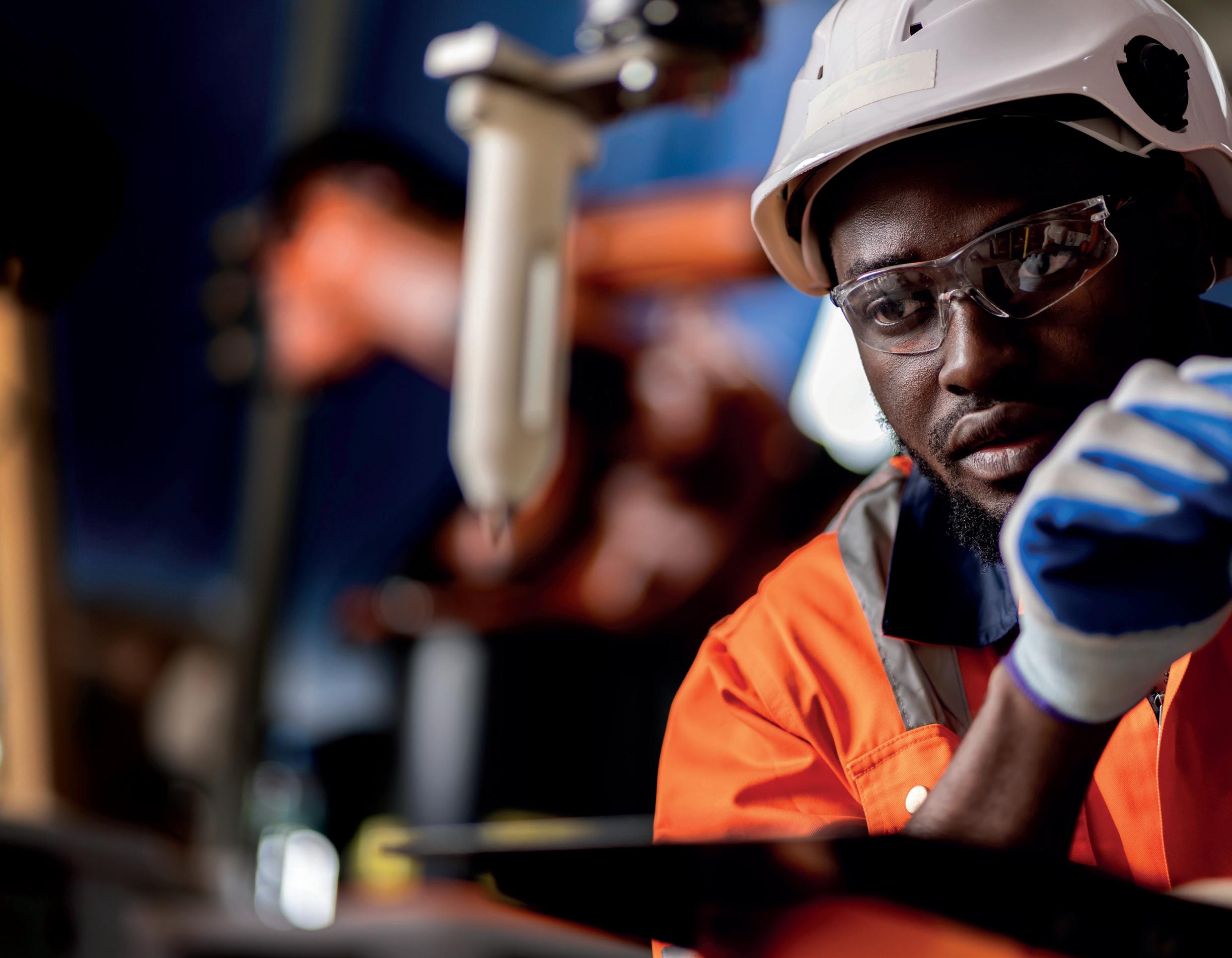
annum in lost output, says Make UK the organisation which supports UK manufacturing. It is urging Labour to make tackling skill shortages and reforming the technical education system the centrepiece of its industrial strategy.



In the meantime, the pressure on finding skilled labour remains severe, with 64,000 vacancies across the manufacturing sector.


“The new government has made a welcome bold statement of its intent to tackle the UK’s anaemic growth at national and regional level,” said Verity Davidge, director of policy at Make UK.

These account for some £6 billion per

“It should now back this with a radical, crossgovernment, long-term industrial strategy which has measures to tackle the UK’s acute skills crisis at its heart.”



More than £2.2 million in grants have been awarded to businesses across the West Midlands over the last three years as part of the government-funded Made Smarter West Midlands business support programme.
Made Smarter encourages manufacturing and engineering businesses to adopt digital technology to boost their productivity.
The Conservatives had committed to expanding the Made Smarter Adoption Programme to all nine English regions in 2025-26.
A total of 635 manufacturing and engineering businesses had registered with the programme in the West Midlands since it began in 2021 and up to April 2024. This includes 180 from Coventry and Warwickshire, 168 from Greater
Birmingham and Solihull and 42 from Worcestershire.
Manufacturing jobs in the South West have fallen two per cent


Made Smarter West Midlands says it has helped generate more than £158 million in GVA.
Coventry and Warwickshire Growth Hub leads the Made Smarter West Midlands scheme with the growth hubs across the region, including in Worcestershire, on behalf of Business Growth West Midlands, the West Midlands Combined Authority and the Department for Business and Trade.
It works with WMG (Warwick Manufacturing Group at the University of Warwick), and the Coventry-based Manufacturing Technology Centre to introduce digital technologies into businesses.
Onur Eren, Principal Engineer for Digital Manufacturing at WMG, University of Warwick, said: “The impact of the Made Smarter West Midlands programme cannot be understated. We have helped create hundreds of jobs and upskilled many existing roles, empowering the workforce with advanced digital competencies.
“Additionally, we have witnessed substantial improvements in operational e ciency and successfully solved critical business problems with the help of innovative digital tools.
“Made Smarter support has ensured that manufacturing businesses can leverage the full potential of digital technologies, setting a new benchmark for digital excellence to continue in our region.”
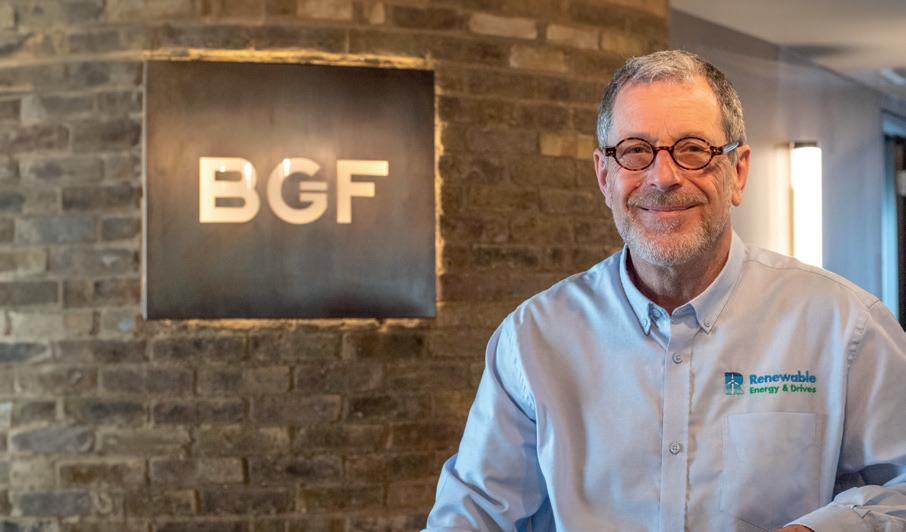
Clean energy engineering firm Severn Drives & Energy has expanded across the Atlantic with a new 30,000 sq ft manufacturing facility in New Berlin, Wisconsin.
The site will enable Severn Drives & Energy to meet growing customer demand, and it already has plans to triple its US workforce over the next two to three years.
The business, owned by Gloucesterbased Critchley Engineering Group, also expects to boost its turnover from £10 million to £50 million.
This latest move comes following a major investment from business growth fund BGF last year.
“We’re proud to be supporting a dynamic, forward-thinking company that’s playing a key role in supporting critical renewable energy infrastructure on a global scale,” said Alex Garfitt at BGF.
“Investment in the new US base has seen the company move from making parts to manufacturing whole systems to meet the complex technological challenges facing the sector.
“Severn’s growth prospects are outstanding. It’s emerging as a dynamic enterprise and outstanding UK business success story.”
Severn Drives & Energy also recently brought aboard Jon Addis as a nonexecutive director.
An experienced chairman, private equity adviser, CFO and investor, Jon previously served as group CFO at UK Power Reserve and investment director at LDC & Royal Bank Private Equity.
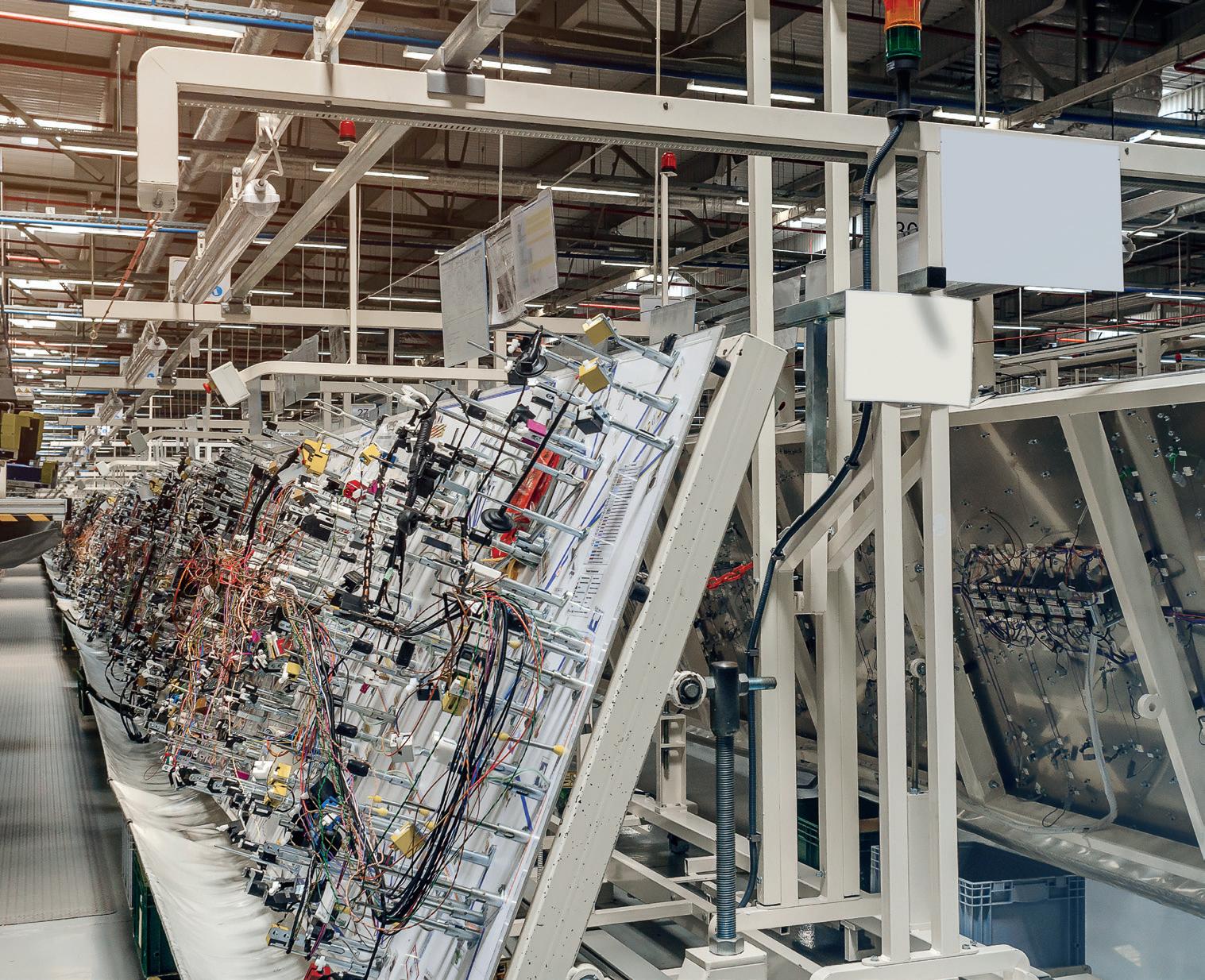
Autonomous vehicle designer and manufacturer Aurrigo has announced that its automotive arm has secured a £1.5 million European export contract with a global manufacturing customer.
Production is expected to begin early next year on wiring harnesses, to be supplied over the next two and a half years.
The contract was won following a competitive tender process thanks to a strong existing relationship with the customer, Aurrigo said.
Based in Coventry, Aurrigo also deals in
automated ground handling technology for baggage and cargo operations.
“We are delighted to announce this contract win with a major global automotive manufacturer,” said CEO David Keene.
“This demonstrates our automotive expertise and ability to tailor the manufacture of complex systems to suit our clients’ needs – skills we’re also leveraging in designs for our smart airside solutions.
“Our automotive division continues to grow organically, underpinning the overall group’s performance.”
Versarien has raised £550,000 for the purchase of concrete and mortar testing equipment to help its product achieve industry accreditation.
The Gloucestershire firm manufactures Cementene, a family of graphenebased aqueous admixtures that promise to enhance the properties of concrete and reduce its carbon cost.
Admixtures constitute the other ingredients in concrete beside Portland cement, water and aggregates. They can be added immediately before or during mixing in order to
reduce the relative proportion of carbon-intensive cement.
With its new equipment, Versarien plans to bring testing of Cementene in-house, as well as putting it to use on new mortars and products developed using the company’s 3D construction printing capability.
Last month Versarien secured a £200,00 contract with Building For Humanity, the not for profit housing company building homes using advanced technology. Versarien will provide 3D construction printing help.

Prima Dental Group, the world’s largest carbide bur (drill) manufacturer, is enjoying heady success. This has been illustrated most recently by the company being honoured with a coveted King’s Award for Enterprise 2024 for International Trade. But this road to glory hasn’t been without its challenges. Here, Dan Hodgson, Chief Commercial Officer, reflects on how the world-leading designer and manufacturer of precision dental and medical instruments has ridden the storm and set sail for success – most notably thanks to its export strategy.
As a manufacturer and engineer in such a niche market, our growth is based entirely on developing export and international trade. Today, more than 90% of our £37.6m turnover is generated from international trade and we expect this to increase to more than £50m by the end of 2025.
Although we are the long-established UK market leader, and benefit from preferred supplier status with large British healthcare providers, the UK domestic market has limited opportunities for us. That’s why our focus has been around growing our market share in mature markets, including




the USA, Europe and Middle East as well as developing countries like India, Brazil and China. Our strategy is grounded in a deep understanding of these markets, delivering tailored product ranges for our customers.
As an organisation we were the pioneer in private label manufacturing in dental burs back in 2000, growing to become the world’s largest supplier of private label in our sector today. This has enabled us to achieve significant growth through wholesale and retail trade, by supplying products under major retailer labels while still achieving notable recognition with our own Prima Dental branded products.




















Looking back on the last five years provides particular validation to what we’ve achieved. A commitment to our mission – the pursuit of better – has ensured we retain an optimistic, and ambitious outlook, backed up by a diligent and driven workforce, and I believe ensures we continue to drive our business forward.
But no one saw COVID-19 coming. The pandemic had a massive impact on the dental industry as a whole and our business felt that impact too, with global sales reduced by 29% during the first year of the pandemic. Fortunately, we adapted quickly, faster than our competition, helping our recovery and putting us back on track with our growth agenda.
Challenges over supply chains, in terms of raw material supplies, unstable market volumes and pricing are still a cause for concern for many manufacturers.
To help mitigate risk, at Prima, we have strengthened our supply chain, the team have implemented a robust inventory strategy to ensure we can adapt to supply variations. This includes both reducing reliance on global supply chains (with a focus on local where feasible), as well building relationships with multiple suppliers to help minimise disruption.
On the back of rising energy costs and in line with our commitment to improving our impact on the environment, we installed solar panels at our headquarters in Gloucester earlier this year and anticipate a 10% reduction in electricity consumption. And we’ve also made adaptations to our compressed air system, saving energy and some £68K a year.
The complex regulatory environment (post Brexit) is a tricky one to navigate and can certainly impact on export success. At Prima we invested significantly over the past three years within our regulatory compliance team to help guide us through these regulations and tari s. We are also a member of the BDIA, our Dental trade association, to ensure we’re kept up to date with the latest changes in our sector.
Currency fluctuations can a ect pricing strategies and profit margins. We keep abreast of exchange variations so that we can review and adjust our pricing strategies accordingly – to ensure we remain competitive and profitable.
Having tackled the challenges over the last few years, we are now optimistically looking ahead to the future.
Our ambitious growth targets are fuelled by the fact that we, as a company, are uniquely placed to capitalise on growing world demand for precision dental products from an increasing and ageing global population. The rise in middle classes in developing countries like India, Brazil and China also supports this demand, with more money to spend on medical and dental health, which in turn is leading to an increase in the number of dental professionals and cosmetic practitioners.
WE INSTALLED SOLAR PANELS AT OUR HEADQUARTERS IN GLOUCESTER EARLIER THIS YEAR AND ANTICIPATE A 10% REDUCTION IN ELECTRICITY



























We have more than 1,000 distributor and trade customers around the world and focus on maintaining long-term relationships and winning repeat business, working in partnership with our customers to help them grow and become more profitable. When it comes to implementation, the introduction of localised sales teams has boosted the understanding of markets further. This, along with thorough market research, has ensured that we can meet the needs of our customers, easily spot trends and identify opportunities.
We’ve also made significant investment in the latest precision machinery made in Switzerland, which incorporates robotic automation. This, coupled with its manufacturing techniques, ensures productivity, quality and consistency.
And, with our focus on research and development, the business is spearheading exciting new technologies. This has been recognised with us being allowed patents in the UK and USA for our unique milling tools used for dental restorations.
So, plenty to be proud of. And while we don’t underestimate the challenges that may lie ahead, we remain positive in our capabilities and excited by the opportunities that are in store. Never complacent, we remain in pursuit of better.











Clean innovations will be crucial in the transition to a low-carbon economy. But are they getting the backing they need and what hope is there for the future?
By Daniel Face,
reporter


In our March edition of The Business Magazine (which you can still read online) we ran a feature on the long road to net zero.
The UK continues to focus on cutting its greenhouse gas emissions to a level which can be naturally reabsorbed from the atmosphere by 2050. But perhaps the most important development since then has been a change of government, and along with it some bold and sweeping policy pledges – not least regarding the nation’s green ambitions.
Central to the manifesto of Prime Minister Keir Starmer’s Labour has been the establishment of GB Energy, a state-owned company backed by £8.3 billion to accelerate investment in renewables.
But almost as much – £7.3 billion – has been set aside for a new National Wealth Fund with similar aims to drive innovation in green technologies.
Described by chancellor Rachel Reeves as a “concierge service” for investors, this new body is keen to bring more private

money into the UK’s green tech space.
Because as it stands, there’s a problem. One which no amount of government spending can solve alone.
Call it clean tech, green tech, climate tech – and I’ll use those terms fairly interchangeably – the technologies needed to drive our net zero transition are broad and the companies developing them numerous.
The UK’s clean tech sector boasts an annual turnover of £347.3 billion and is growing at a rate of around 11 per cent a year, according to data aggregator The Data City.
Innovators in the generation and storage of power are unsurprisingly the major players here, but sustainable materials, recycling and agriculture are also big business.
On the surface, investment is following

suit. Between 2018 and 2022, clean tech companies went from attracting £0.8 billion in venture capital investment to £3 billion in the space of just four years. And last year’s £2.6 billion is still impressive given inflationary pressures.
But Cleantech for UK, a coalition of top venture capital and asset management firms in the sector, identifies a persistent gap in funding for clean tech innovators at the scale-up stage of their journey, which has a limited pool of specialist investors.
“The UK is home to a mature clean tech ecosystem, a thriving innovation scene and strong overall investment,” says the organisation.
“However, this world-leading capability isn’t consistently converted into worldleading clean tech scale-ups.
“Smart, targeted interventions aimed at boosting early-stage innovation, derisking first commercial projects and making clean tech work for the whole country can pave the way for a new generation of global technology champions.”






Smart, targeted interventions aimed at boosting earlystage innovation



Regardless of political alignment, many investors are happy to see the back of the general election if it means some long-awaited stability, giving the new government an inherent advantage.
But whether they can really kickstart private cashflows may depend on the success of the National Wealth Fund and GB Energy over the coming years, and their ability to bring aboard green tech innovators in order to create an enticing proposition for investors.
organisations lending their support.
Last year, SETsquared – a partnership between the universities of Bath, Bristol, Southampton, Surrey and Exeter –launched its Green Futures Programme to provide specialist support for emerging businesses in the sector.
“We know that innovation will be key to meeting net zero targets”, said Serena Giaminardi, head of programmes and investment at SETsquared.
Last year a report published by Cleantech for UK outlined the current state of the sector, with three recommendations to government to address this scale-up funding gap.
The group called for agile regulatory frameworks which will allow green tech innovations and infrastructure upgrades to be e ciently deployed and connected to the UK’s electricity grid.
It also sought equity in the transition to a low-carbon economy, advocating the safeguarding of workers and communities currently dependent on carbon-intensive industries.
Most importantly, though, the sector needs funding – plain and simple.
While these concerns were initially addressed to the previous administration, they present a strong opportunity for the new incumbents to hit the ground running.
“We’re acting immediately,” assured energy security and net zero minister Ed Miliband, “wasting no time and working in lockstep with industry to unleash private investment and grow our economy.
“Our National Wealth Fund will help create thousands of jobs in the clean energy industries of the future to boost our energy independence and tackle climate change.”
We heard more on these plans in July during the King’s Speech, though many of the details are still up in the air. What level of independence will they be a orded? Can GB Energy still make an impact with £8.3 billion – a far cry from the initially pledged £23 billion?
As the new administration settles in, investors will be watching closely and keeping their optimism cautious.
In the meantime, green tech companies across the South West are getting on with what they do best, with regional
“There are strong clusters of green tech businesses in the south, but they need funding to continue their R&D and university-grade research in order to bring these innovations to market, where they can have an impact.”
Therein lies the challenge – the jump from research to market. Groups like SETsquared can do their best to connect founders with investors, but if the money isn’t there, how many will stick the landing?
Fortunately, plenty of companies have emerged commercially successful on the other side, giving some cause for optimism to these early-stage innovators.
These are the businesses we’ll be taking a look at in this feature, in the hope they can provide a blueprint for the green tech up-and-comers of the South West.
Because if they’ve made it, think what could be possible in a stronger investment landscape – whether the new government has a part to play or not.
Plasterboard – it’s everywhere, from homes to offices. And if a former builder from Bristol has his way, it’s the perfect carbon storage
It’s 1894, and American entrepreneur Augustine Sackett has just made the world’s first plasterboard, or ‘drywall’ – gypsum plaster sandwiched between sheets of wool felt paper.
That initial composition was continually refined throughout the 20th century, but the core formula of plaster and paper has always remained largely the same.
Fast forward to today, and plasterboard is a staple of the global construction industry –the perfect candidate, then, for a green new alternative.
Enter Adaptavate, the Bristol company behind the bio-based, carbon negative Breathaboard.
The whole idea is for a product which absorbs more CO2 than it takes to produce.
And when it’s eventually torn down, Breathaboard is fully compostable, or can even be recycled to make another batch.
“We’ve built a business of the future with ecological regeneration at the heart,” said founder Tom Robinson.
“Our solutions can help decarbonise the construction industry at scale.
“Plasterboard is one of the most heavily used construction materials after cement and steel, in an industry that produces around 40 per cent of the world’s carbon emissions.
“As a former builder, the potential impact of putting carbon-storing building materials in the hands of every builder, architect and developer around the world as a drop-in solution is massive.”
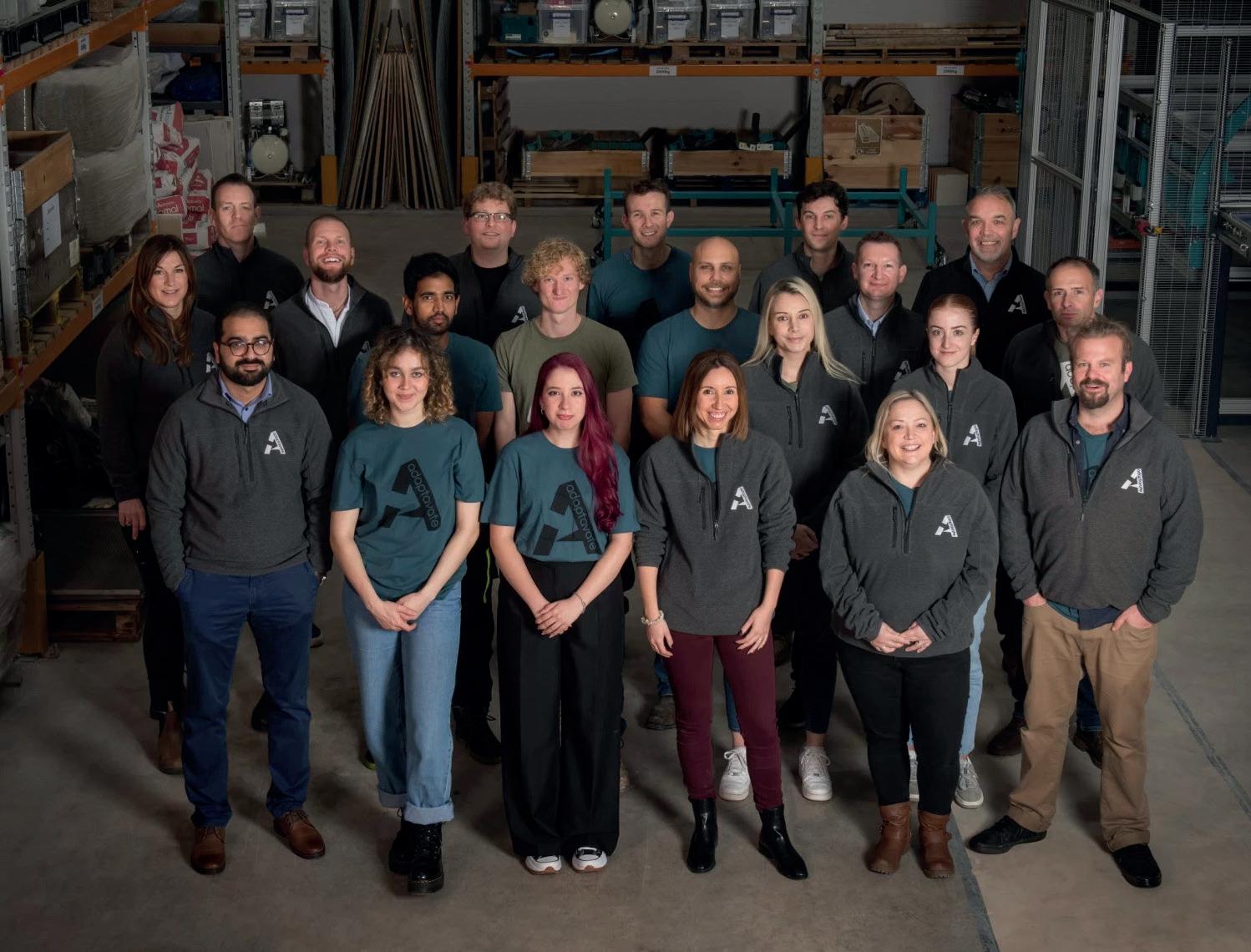

Indeed, Tom began working life as an onsite plasterer and contractor, getting familiar with typical practices and materials in the industry – and finding out just how wasteful and polluting they could be.
Before long, he’d enrolled at the Centre for Alternative Technology (CAT) in Wales for a master’s in sustainable architecture.
It was there that the first concepts for a new, breathable plasterboard were developed and tested.
The real breakthrough came when Tom landed a spot on Climate-KIC, an EUfunded accelerator programme supporting imaginative solutions to climate change.
From there, he and the newly-established Adaptavate partnered with the University of Bath to prove the practical viability of his concept designs.
That was back in 2016. Only recently has the company, now with 22 employees, begun ramping up production of Breathaboard for use in various upcoming pilot projects.
We’re talking technology 10 years in the making – during which time, Adaptavate has released a whole other product line, Breathaplaster, which has ‘pasted’ the way for its flagship product.
So, what’s so special about it?

Traditional plasterboard, like the original 1894 Sackett Board, uses plaster made of gypsum, which is readily available and relatively inexpensive.
An alternative is lime plaster. It’s on the pricier side and has fallen out of favour in the past century for being slow to set and caustic to touch.
But it o ers a few notable advantages which caught the attention of Tom and the team.
Lime, or calcium oxide, absorbs CO2 to form calcium carbonate – a process which not only helps sequester carbon from the air, but also works to bind and strengthen the plasterboard as it solidifies.
It’s porous, too, and therefore naturally breathable, regulating humidity levels by absorbing moisture from the air.
This in turn discourages mould, which typically grows in damp, slightly acidic environments (lime, on the other hand, is alkaline).
Breathaboard is made from food and fibre byproducts, which are combined with minerals and plaster and sheathed in recycled paper during manufacturing.
And having just recently added char into the mix, which locks the CO2 sequestered by plants into a stable state, it’s not only low- carbon, but carbon negative.
Adaptavate’s own tests suggest that swapping out plasterboard for its own product can save roughly 4kg of CO2 per square metre.
With the formula down, the team have now put together a pilot line for Breathaboard –but that’s only the start.
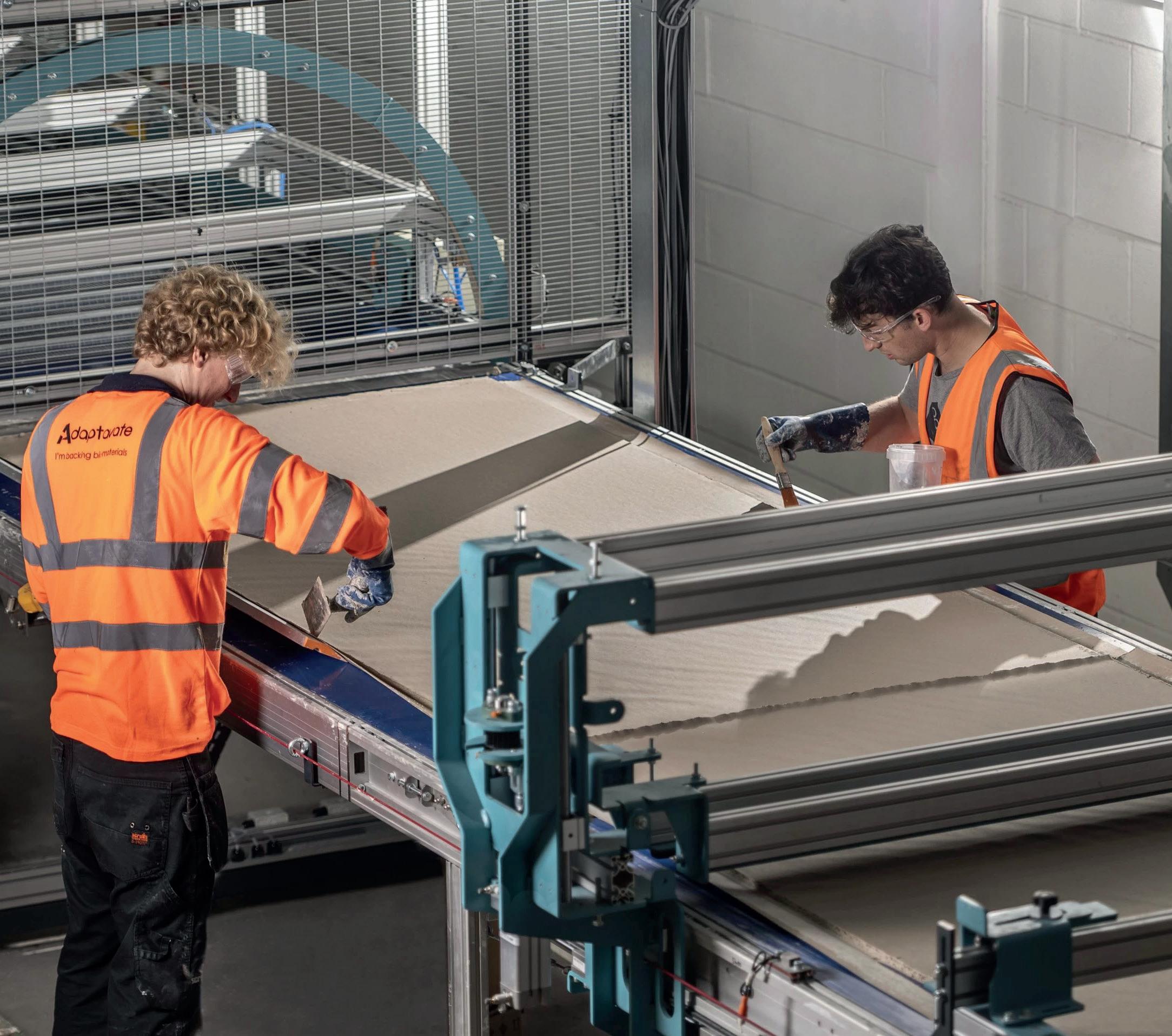
“From conception, we knew that for this to have the impact the planet requires, the solution needed to be scalable,” said Je Ive, CTO at Adaptavate.
“Now that we have full size boards made on a continuously extruded process, with a comparable performance to the incumbent, we can see this vision becoming a reality.
“The pilot line gives us the foundation to replicate our core innovation for production partners around the world.”
Adaptavate wants to operate a “planet before profit” model, whereby its technology can be licensed and tailored to the needs of di erent countries and the resources available to them.
Those ambitions received a boost last year when the company closed a £2 million investment round, led by carbon removal investors Counteract with contributions from the EU’s Low Carbon Innovation Fund, French industrial group Semin and Perivoli Innovations. The latter is a venture investment trust which donates
Our solutions can help decarbonise the construction industry at scale
profits to the Perivoli Foundation, a charity which has its principal focus as Africa.
“Adaptavate is a great British innovator with a truly global opportunity,” said Richard Barker, partner at Counteract.
“Its products will have an exciting role in helping to decarbonise the construction industry.
“Tom and his team have made incredible progress to date and have developed a range of high-value foundational IP.”
All that’s left to do now is deploy it – and that’s certainly well underway.
It’s two birds with one stone – take something that would otherwise end up sitting in landfill or polluting our waterways, and produce a clean, sustainable, useful product.
In our March issue, we profiled James Hygate, CEO of Firefly. The Bristol business uses human sewage as a feedstock to make sustainable aviation fuel (SAF).
And as it turns out, Firefly aren’t the only ones putting our own waste to good use.
Traditional fertilisers contain nitrogen, phosphorus and potassium to help plants grow.
Do you know what else provides those key ingredients? Urine.
For the past year, NPK Recovery in Bristol has been collecting pee from big events around the country, thanks to an ongoing partnership with women’s urinal makers PEEQUAL.

It’s converted into a safe and sustainable liquid fertiliser – which is growing ever more commercially competitive with synthetic alternatives.
“The price of fertiliser has shot up in the last couple of years,” said Hannah Van Den Bergh, founder of NPK Recovery, “and the UK’s last remaining fertiliser factory closed in 2022.
“Huge amounts of the fertiliser used in the UK are imported.
“That’s not only environmentally unsustainable due to production and

transport emissions, but reliance on imports can be a precarious situation for farmers.
“If supply chains are impacted, as we saw with the war in Ukraine, there’s a risk that the volumes of fertiliser needed won’t be available.”
That’s not to mention the potential to alleviate strain on wastewater treatment plants, which – as recent years have shown – are struggling to keep up.
“A huge amount of time and money is spent removing nutrients from waste,” Hannah added.
“Those nutrients could instead be captured and put to use in a sustainable fertiliser that still delivers the crop yields farmers need.
“France, Switzerland and the US have commercially available fertiliser made from urine, so there’s real opportunity to do the same in the UK.”
Backed by Innovate UK, Defra and the Carbon Co-op Innovation Fund, NPK Recovery is now hoping to fill that niche.
From urine to sludge – equally appealing, we know – WASE, also in Bristol, is working on pioneering technology to “unlock the power of waste”.
WASE aims to maximise the recovery of
biogas from organic matter in industrial wastewater, which can then be burned to produce clean energy.
Its proprietary system is modular and up to 70 per cent smaller than market alternatives, allowing for easy integration into existing set-ups – whether they be drinks manufacturers or dairy farms.
Hepworth Brewery in West Sussex, for example, uses the system to treat 17 cubic metres of wastewater every day, generating 362 MWh of energy and saving 100 tonnes of CO2 a year.
The technology has caught the attention of investors, as WASE has just closed an £8.5 million funding round led by climatefirst venture capitalists Extantia Capital.
“We strongly believe that biogas and biomethane will soon be a key source of renewables,” said Carlota Ochoa Neven Du Mont, principal at Extantia, “and will make up a growing percentage of the energy mix.
“WASE’s approach doesn’t just increase biogas and biomethane yields – it’s reshaping the way industrial businesses are thinking about their resources. We’re delighted to support them.”
The company now plans to scale its operations to deliver on a number of multimillion pound contracts already on the books.

In 2022, Wyre Forest District Council teamed up with Worcestershire tech accelerator BetaDen to launch a clean tech bootcamp for the county’s emerging innovators.
The programme welcomed a cohort of eight businesses to receive professional mentoring, access to marketing funds and support to develop and bring their ideas to market.
With the bootcamp now long finished, many of the alumni from that scheme have gone on to secure investment and are showing great commercial promise.
We checked in with a few of them.
Aceleron in Stoke Prior has developed the Essential lithium-ion battery, with a core which can be swapped out and either replaced with an upgrade or serviced and returned to the customer.
It’s half the weight of a typical lead-acid battery and comes with a carry handle for portability. Plus, it takes 30 per cent less carbon to produce than a traditional battery pack.
Aceleron also makes the O gen lithium-ion solar energy storage system, providing clean energy storage for residential use.

On the topic of clean power, Murb in Worcester makes a deployable wind turbine for temporary micro-grid applications – from inner city building sites to remote telecoms outposts.
Unlike most traditional designs, Murb is a vertical axis wind turbine (VAWT), allowing for the generator and gearbox to be closer to the ground and therefore easier to maintain and repair.
The company has received support from Worcestershire County Council’s Low Carbon Opportunities programme and
the EU’s ATETA engagement programme in partnership with the University of Birmingham.
Finally, Voidfill Packing – founded in 2009 by brothers Rob and Michael Payne – produces 100 per cent biodegradable packaging for ecommerce, pharmaceuticals, electronics and more.
Its broad range of quirkily named products includes BigBio packing peanuts; Pu Pack, a paper alternative to bubble wrap and its flagship EcoNutz paper packaging.


By Nicky Godding, Editor

What was green but is now grey? It’s not a riddle, it’s the government’s new definition for parts of Britain’s green belt which could be usefully redeployed for development
The new government wasted little time in announcing that some of Britain’s green belt should be released for development. This is the ring of countryside around cities about which much has been written and less understood, but has certainly kept some excessive urban sprawl at bay over the last few decades.
The move to tackle this sacred cow of town and country planning is a good thing say lots of people and organisations. Even the CPRE, the venerable countryside charity which campaigns on behalf of our green and pleasant land, has said that some parts of the country’s green belt could be successfully redeveloped without causing harm.
The green belt wasn’t designated to keep Britain picture-book pretty, and there’s not as much of it as people might think – just 12 per cent of land in England.
In the aftermath of the Second World War, a strapped-for-cash Britain needed to grow more of its own food, so preventing urban creep on to farming land was sensible, and providing a green space close to the outer limits of towns and cities was deemed beneficial to the public health.
Kate Wood, Director of Planning at property advisers Eddisons, says the requirement to review green belt land (covers a total of 6,326 square miles in England) is to be welcomed.
“Planning applications in the green belt are considered on the basis of whether they keep land open and in rural character. This, e ectively, prevents most development,” she said.
It’s also worth noting that green belt designation is not about beautiful or special countryside, habitats or similar,
she adds. “There are other designations that cover those issues, such as National Landscapes (formerly known as AONBs – Areas of Outstanding Natural Beauty). Green belts’ only purpose is openness, prevention of sprawl and merging.
“Some exceptions are allowed on green belts, such as cemeteries, motorway service areas and a ordable housing,” she explains. “Otherwise, it is necessary to demonstrate ‘Very Special Circumstances’ (VSCs) to overcome the “harm” to the green belt from a proposed development. Even a dire need for housing is sometimes deemed insu cient to demonstrate VSCs.”
Against this background the government is promoting a new term – the “grey belt”.
Kate explains: “This describes sites that may previously have been developed on the green belt. Such sites can still be considered to have an open character,

“Planning applications in the green belt are considered on the basis of whether they keep land open and in rural character. This, effectively, prevents most development”
hence the need for government to define them specifically as exceptions to enable their development.”
Don’t get too excited though, this won’t be the answer to Britain’s housing crisis. Kate understands that a redefining of land to grey belt could only release up to three per cent of currently designated green belt land.
“But that could still provide development land for a few hundred thousand homes. It will all help,” she adds.
A redefinition of green belt land is a relatively quick way to free up land for housing development too, because the government isn’t changing planning laws, just the planning policy which can be done simply by a Ministerial Statement.
So the focus turns to the developers. More land for development is what they’ve been asking for, but such land carries its own challenges.
Kate explains: “Grey belt – or ‘ugly land’ as some are coining it, is not likely to be green fields, and may have old, possibly abandoned buildings on it. This means there may be site contamination or similar issues that won’t necessarily be straightforward or, crucially, financially viable for developers to overcome.
“There is a risk to a ordable housing, this being often the first thing to be lost when the costs of development versus the potential profit don’t make the development worthwhile.
“Nobody is going to build a scheme for no profit – that’s simply business.
“But a ordable housing is often needed most in areas within or surrounded by green belt because development has been stifled for so long that an area’s house prices are pushed up. While grey belt is a start, nobody should consider this as the whole answer to the national housing shortage.”
However, if the financials still do stack up for investors and developers, they’ll waste little time in sending in a planning application.
And therein lies another challenge. The acknowledged lack of planning o cers.
But the new government is all over that too. It has plans to hire 300 more planning o cers.
Kate, and many others in the planning and development sector, ask where they are going to come from. “If you look at the figures, that’s just under one planning o cer per local authority, so it’s a pretty modest ambition – but even that’s likely to be a bit of a struggle. Recruiting planners is a problem because not enough are either qualified or in training, and it’s just not seen as an attractive career.”
She has a point there. Not many 16-year-


olds will go home to their parents saying they want to be a planning o cer.
A career in planning needs to be explained better, says Kate.
“It also needs to be more transparent so that potential entrants can understand how much di erence they can make to the built environment. Yes, it’s not like training to be an architect – which people understand and is seen to be a lucrative and desirable career but for which the training period takes many years. However planning can also be a rewarding career.”
Kate points out that many councils do work hard to engage local communities in planning issues. “But regretfully most people only get involved in planning issues when they feel their own properties or livelihoods are being threatened.”
While Kate welcomes the new government’s prompt actions, both on releasing green belt where appropriate and acknowledging the issues around planning o cer recruitment, it’s just scratching the surface of the problem.
She points out that there is still a need for fundamental overhaul of the planning system. “It’s not simply about making it less bureaucratic or speeding up planning, although both of those things would help. It’s about looking at everything around it. No one has the answer yet, but the government has demonstrated its commitment and planning is now a topic of discussion, so watch this space.”


Developer Robert Hitchins Ltd has released a project update nine months into the construction of its flagship Cotswolds Designer Outlet being built o J10 of the M5 at Tewkesbury.
With less than a year to go to its phase one opening next spring, the scheme’s retail space is now 75 per cent exchanged or in legals to high-quality fashion, sport, lifestyle and food and beverage brands.
Around 6,000 steel beams and columns have been installed, with nearly 90 per cent of steel frame structures complete.
Simon Tothill, Robert Hitchin’s property and development director, said: “There’s been remarkable progress on site being delivered by the team at Bouygues UK.”
“There’s been a tremendous e ort behind the scenes from the team at Robert Hitchins and our leasing and operating partner Multi-Realm.
“We are curating a line-up of brands that will make Cotswolds Designer Outlet a must-visit destination at Tewkesbury.”
Christine Grace, leasing director at Multi-Realm, added: “We’ve had a very positive response from retailers and food and beverage operators who want to be part of the opening line-up at one of the only new outlet destinations opening in the UK next year.
“It is testament to the quality of the Cotswolds Designer Outlet design, location and the premium guest experience we’re creating that we are already 75 per cent exchanged or in legals this far ahead of opening.”
Once completed, Cotswolds Designer Outlet is expected to create up to 500 new retail jobs across more than 55 individual stores and restaurants, as well as in the management and operations of the outlet centre itself.


The Bristol-based division of RED Construction Group is to carry out a £13 million mixed-used development at the former Jubilee Centre in the city of Bath –a World Heritage Site.
Alumno Group has appointed the group for the Hollis Wharf project, designed by AWW Architects and comprises 120 student apartments as well as commercial space.
The scheme spans 45,000 sq ft across five-storeys and is set to be complete next summer. It will also provide a long-term space for the charity, Mercy in Action, which has been based in the city for more than 20 years.
“The trust that Alumno has put in RED South West to complete work on the Hollis Wharf is testament to our reputation within the region and we are proud to be a part of what is set to be an amazing riverside location for the students of Bath,” said Derek Quinn, executive director of RED Construction South West.
“The historical significance of the location is not lost on us and we are dedicated to carrying out the works in a considered and sustainable fashion, uplifting the local community through our ‘RED to Green’ approach to building within the region.”
Hollis Wharf will be adjacent to two Grade II listed buildings, Twerton Viaduct and Rackfield Place and sits within the Housing Development Boundary and Enterprise Area.

Work is underway at Worcester Six Business Park on a new unit for national foodservice wholesaler Bidfood.
Commercial property developer Stoford is building the unit which comprises 62,431 sq ft of floor space, plus ancillary o ces. Glencar Construction is the main contractor.
The facility, Bidfood’s first in the region, will be its 28th depot and will include a cold store. The project is programmed for completion this year
Ian Edwards, Director of Economy and Environment at Wychavon District Council said: “Bidfood’s investment is a massive sign of confidence in
Wychavon as a place to do business and they will be a welcome addition to the other leading national, and multinational, companies, trading from Worcester Six.”
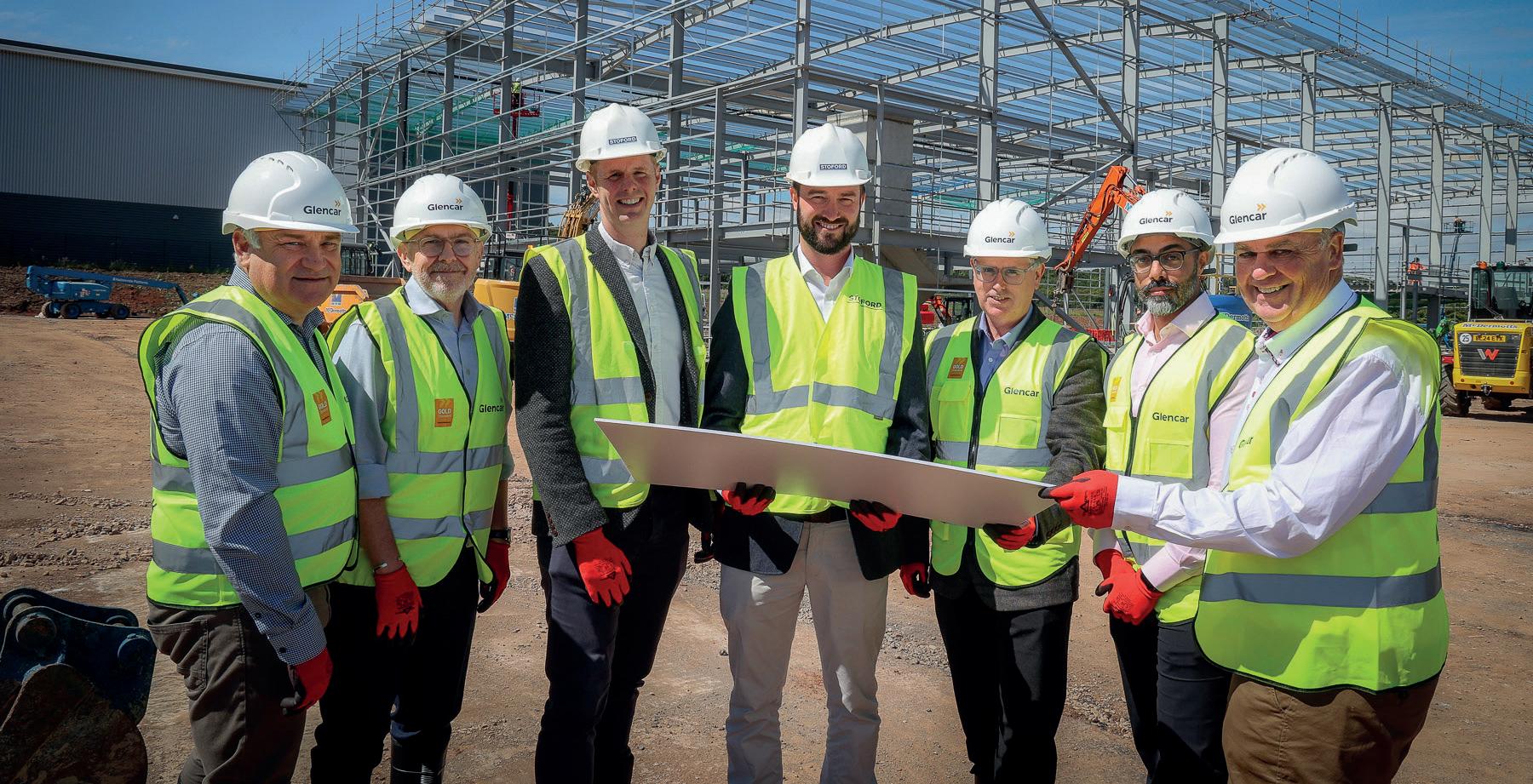
Other companies based at Worcester Six include Alliance Flooring Distribution, IONOS, ZwickRoell, Sierra Engineering, Siemens, Spire Healthcare, Kimal, Super Smart Service, Stop Start Logistics and Kohler Mira.
Stoford has also begun infrastructure works on the site’s southern extension, unlocking more than 60 acres of land.
The developer has also secured what is believed to be the largest
pre-salein Worcestershire for a new 278,048 sq ft manufacturing facility for MiTek.
If the plans are approved, MiTek will acquire the building’s freehold on completion.
The facility will become its EMEA headquarters, serving its businesses in the UK, France, Germany, Poland, Latvia, Czech Republic, Sweden, Norway, Finland and South Africa.
Wavensmere Homes and BBS Capital have received unanimous approval from Cheltenham Borough Council for the redevelopment of the North Place surface car park.
Arkle Court will comprise 147 houses and apartments.
The £55 million plans have been designed by national architects Glancy Nicholls to complement the town’s Regency architecture and create a sustainable new community in the town centre.
Construction for the 75 three-bedroom townhouses and 72 one and two bedroom apartments is expected to begin within a months, once the S106 agreement for the regeneration scheme is in place.
The redevelopment will include areas of landscaped open space, with the opportunity for a public art installation to be created as part of the Cheltenham Paint Festival.
James Dickens, Managing Director of Wavensmere Homes, said: “It has taken years to get to this point and our delivery will showcase what can be achieved when the borough council and developers work together to unlock complex regeneration schemes.
Formerly the site of Black & White’s Coach Station, in 2013 the council awarded planning for a large supermarket and 143 new homes, which never materialised.
Nick Spencer, Director, and Co-Founder
at BBS Capital said: “While the viability assessment for the project did not allow for 20 per cent a ordable housing, we will be delivering this allocation on-site.
“We will also be contributing more than £1 million towards local education, libraries and the Chilterns Beechwoods Special Area of Conservation.
Some of the new homes will be aimed at first time buyers and young families, with attainable prices set significantly below prime Cheltenham values, he added.
Wavensmere Homes is constructing three other major urban regeneration schemes in Birmingham, Derby and Ipswich, and has five further developments in the pipeline, including Arkle Court.








We celebrate entrepreneurs from across the region who are making a difference
Who knows what makes an entrepreneur?
Is it a brain the size of Mars? A Del Boy Trotter desire to be a millionaire by this time next year? The fervent desire to leave the world a better place than they found it?
By Nicky Godding, Editor
Perhaps our cool entrepreneurs would say it’s all of these things. Whoever discovers the essence of what makes an entrepreneur will certainly make themselve a few bob. In the meantime, We celebrate some regional entrepreneurs and hope you find them as inspiring as we do.
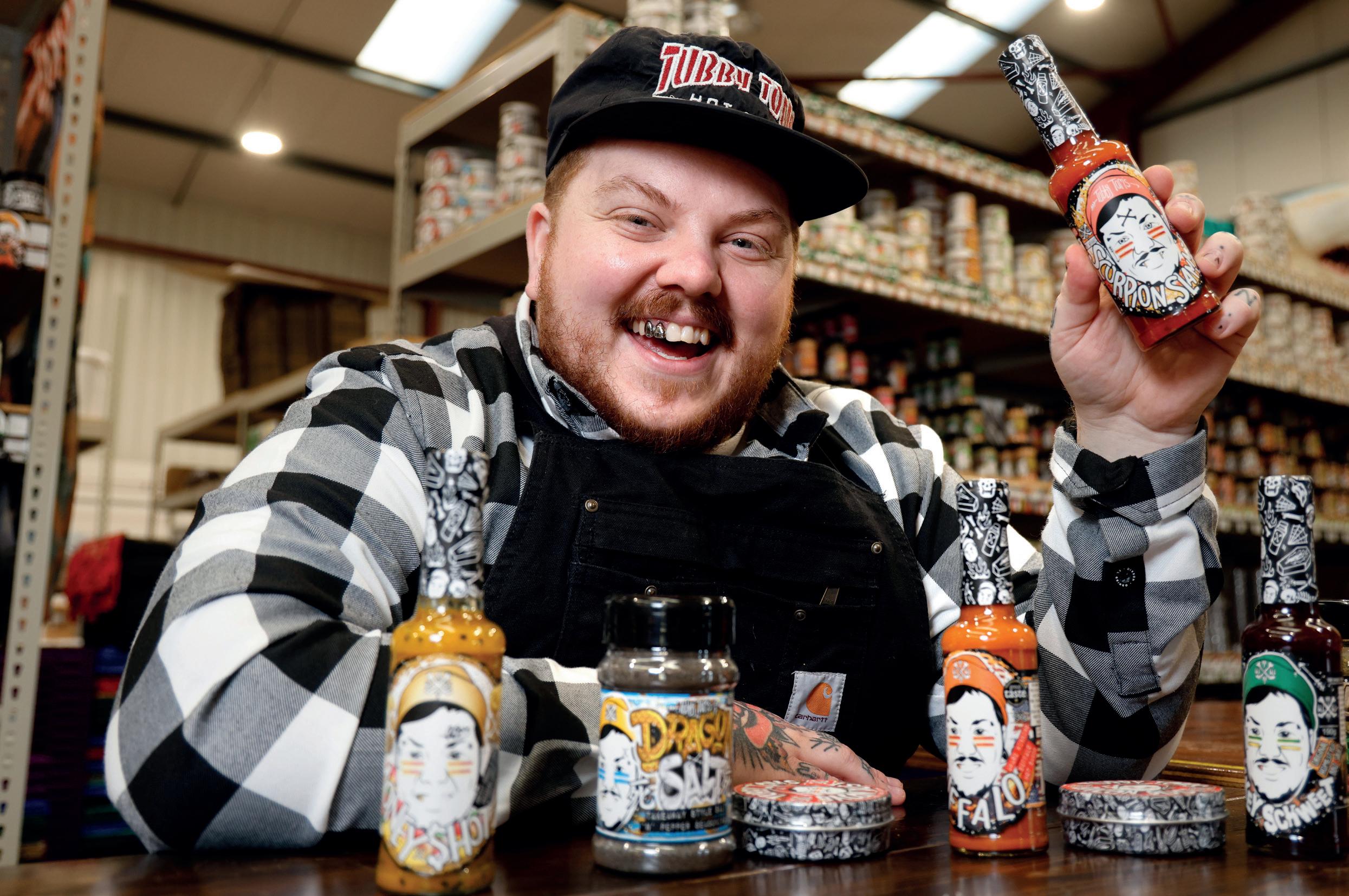


A Gloucester boy through and through, Tom Hughes is a big personality who set up his hot sauce brand, Tubby Tom’s, in 2015. His cooking creativity began when he experimented with recipes while working at Over Farm Market in Gloucester, slipping his bottles on to the shelves at the retail outlet. When they sold well he made more.
He says: “I've always been a fatty, I love food and my life revolves around it. When I'm not cooking at work or at home, I'm watching food shows, collecting and reading endless cookbooks, listening to podcasts about it, talking to other foodies, writing and sharing recipes and salivating over ideas for the business.”
He’s also creative and not only are the sauces his, the funky branding is too. You can buy Tubby Tom’s sauces online or in selected food retailers – lots of people are. Last year he sold the equivalent of 300,000 bottles of sauce.
When Brewdog boss James Watt takes your business seriously, you know you’re winning. Ciara McGurk set up Tallow + Ash in 2022 to build a business which aims to completely revolutionise the laundry industry.
This summer she secured investment of £250,000 from his competition, The Next Unicorn. She was one of just five companies to win out of 750 entrants. She said “My family have always had a history of skin problems and being mainly all girls we love fragrances. But most sensitive skin products on the market come with just one fragrance – what we call chemically clean. We wanted to create new laundry products which smell fabulous and are sustainable.” Ciara works with scientists and dermatologists alongside master perfumers to create her range.
She was previously marketing and brand director for the hugely successful motorcycle and ski helmet brand Ruroc.


Jade, now a hugely successful fashion designer (and icon), launched her clothing brand in 2008. After leaving college, her first step into design was making tweed miniskirts and selling them at Badminton Horse Trials. She’s come a very long way since then. Her range is now sold in upmarket retail outlets everywhere, but you can indulge in the full Holland Cooper lifestyle experience at her smart store at Dowdeswell retail park on the edge of Cheltenham. Her range includes clothing perfect for country pursuits, equestrian activities and the ski slopes. The range includes British tailoring, evening and essentials.






Alex Witty founded Compound Footwear to revolutionise the sneaker industry by repurposing discarded motorsport tyres into stylish, sustainable footwear.
Launched from Alex’s dorm at the University of Brighton, this innovative start-up addresses significant environmental waste issues.
His unique approach combines fashion with eco-consciousness, creating a brand that appeals to a growing, environmentally focused audience. He says Compound Footwear stands out by merging sustainability with fashion, aiming to inspire others to pursue environmentally -friendly practices in fashion without compromising style.


“When I set up my business in my mum’s garage in 2017, never in my wildest dreams did I imagine that it would lead to me chatting to King Charles.” So says Mitchell Barnes, 28.
Earlier this year his business, RYSE 3D which specialises in 3D printing and 3D printed tooling, won the King’s Award for Enterprise in Innovation for pioneering new technologies.
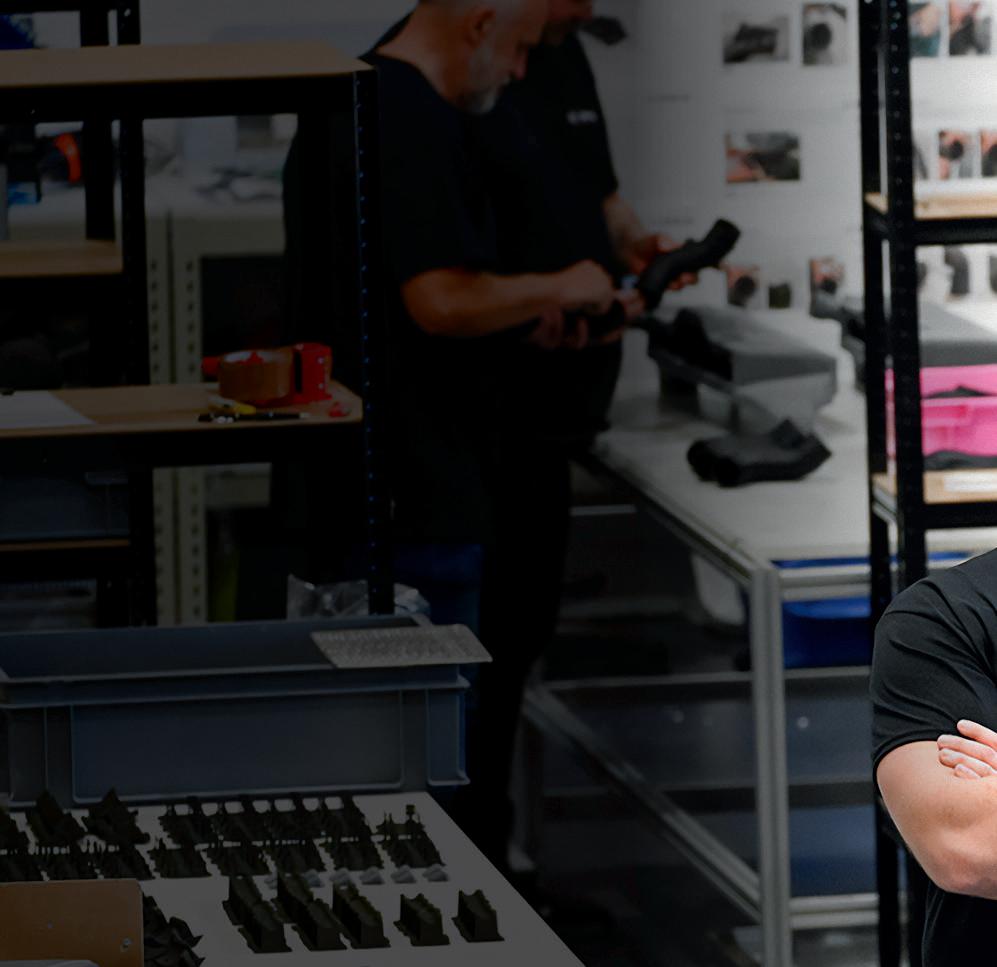

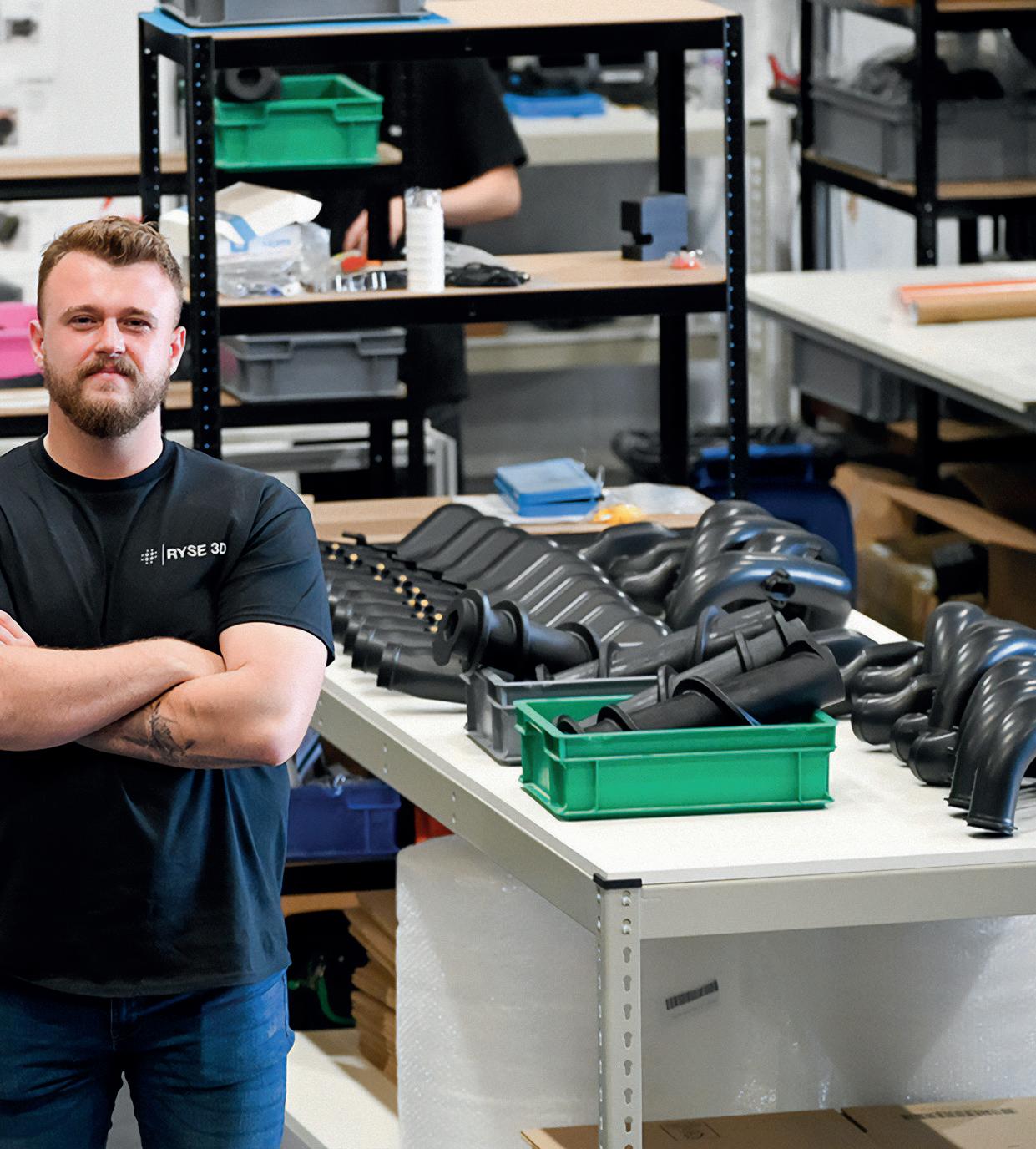
There must be something in the water in Worcestershire which fuels innovative clothing companies. First there was Ben Francis and Lewis Morgan who launched the global athleisure brand Gymshark, and now there is Kristian and Reiss Edgerton (friends of Ben and Lewis), the brothers who co-founded sports brand AYBL in 2018. Latest information reveals that the business made sales of £38.8 million. It came in at 100 on the Sunday Times list of 100 Fastest Growing Companies list in June.

Adam is a scuba diver and product engineer who was shocked at the huge environmental damage being caused by microplastic pollution and what little was being done to tackle the issue.
So he put his engineering superpowers to good use, identifying that existing microplastic filters consumed more plastic in their lifetime than the microplastics they captured. Recognising this was neither a scalable or sustainable answer to the global challenge and driven by the principles of “cradle-tocradle design”, Adam left his job as an engineer at Dyson in 2017 and set about developing a novel and environmentally sustainable microfiltration technology.
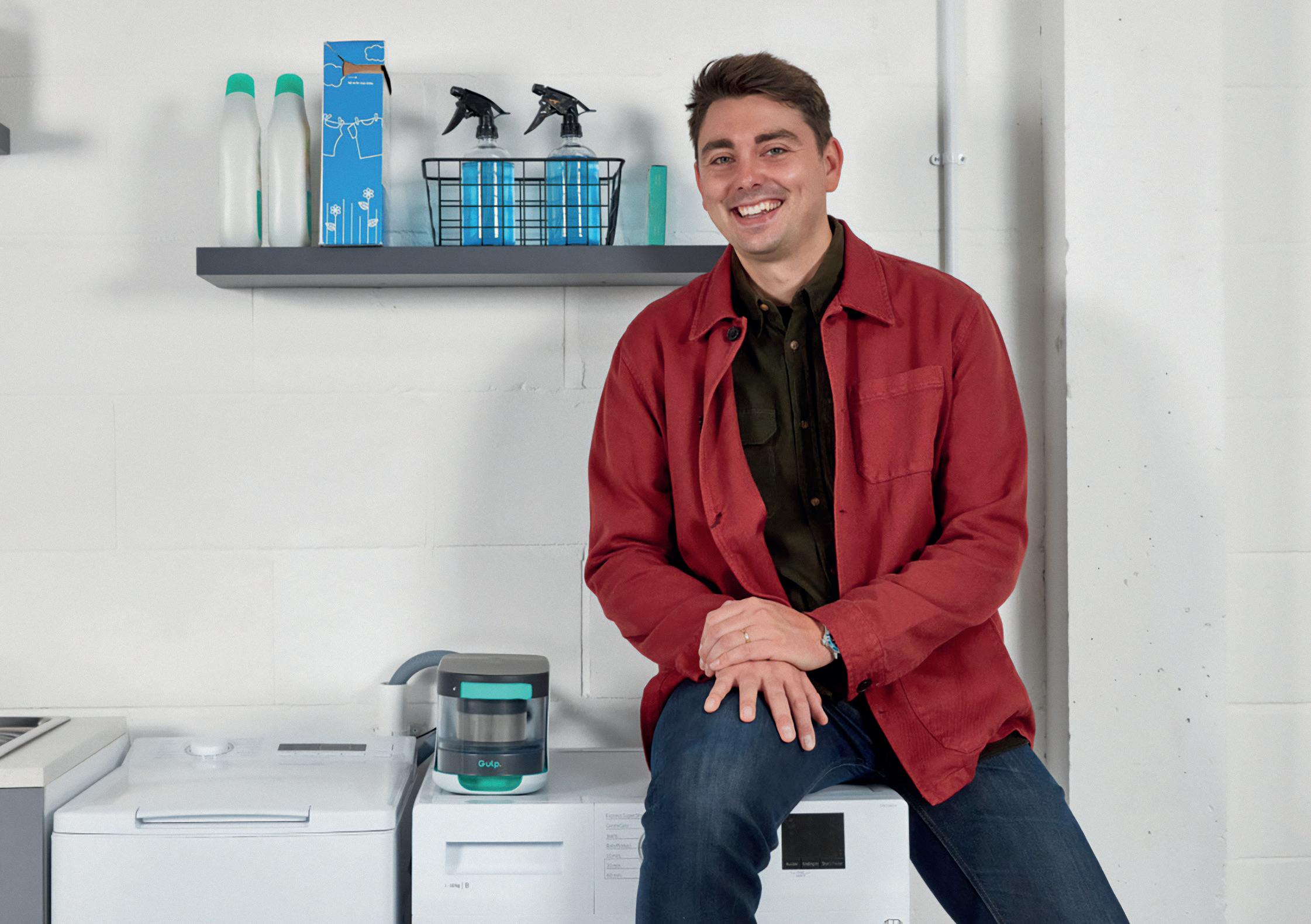

OOSC Clothing was launched in 2014 by friends Aaron McLaughlin and Nick Marsden. They love skiing, but they didn’t like the lack of sustainability in its clothing. They now make ski wear from recycled polyester sourced from recycled plastic bottles, and use organic cotton.
In 2022 they relaunched their Yeh Man range in material that actually takes waste out of the Ocean – made entirely from hard wearing nylon repurposed from fishing nets and other sea waste.
They say: “Reducing the impact that our industry has on the environment is a key pillar in our business and integral to preserving the mountains and oceans for future generations to enjoy.”






He’s neurodivergent, dyslexic, dyspraxic and has been diagnosed with ADHD, but that hasn’t stopped Oliver Bruce establishing PinPoint Media, which now has o ces in Cheltenham, London and Cape Town, South Africa.
PinPoint has expanded significantly in the last two years and in February appointed an advisory board to continue driving growth.
The agency has worked for clients across a wide range of industries, from aerospace and construction to fintech, food and drink, and is now working with brands such as HSBC, Ticketmaster, BAE and Dell.
Having started two multi-million-pound businesses before the age of 30, one of which secured and then swiftly lost a £12 million order with Amazon just weeks after launch, Oliver claims that he’s been on the most expensive MBA's anyone can do thanks to the mistakes he's made.
Jezz Skelton founded online jewellery brand Abbott Lyon in 2014. It’s his second successful business, having set up Mango Bikes while at university to sell a ordable, fixed gear bikes to fellow students. Earlier this year Abbott Lyon, which creates personalised jewellery and accessories, was listed at number 87 in The Sunday Times 100 fastest-growing companies in Britain, with sales of £44.7 million. Jezz runs the business with the help of his twin brother Nick.




South West & West Midlands edition: Bristol & Bath, Gloucestershire, Worcestershire & Hereford, Coventry & Warwickshire, Swindon & North Wiltshire
The region’s most influential B2B magazine, in print and online for news, features, interviews and business sector analysis.
2024 Print issues will be published in January, March, May, July, September and November
South East edition: Oxfordshire & Thames Valley Berkshire & Buckinghamshire
Surrey, Kent & Sussex Solent & South Coast
Managing Director Richard Thompson richard.thompson@thebusinessmagazine.co.uk
Managing Editor Stephen Emerson stephen.emerson@thebusinessmagazine.co.uk
Operations Director Jo Whittle jo.whittle@thebusinessmagazine.co.uk
Visit our magazine online thebusinessmagazine.co.uk
Follow us: @TheBusinessMag linkedin.com/company/the-business-magazine
Magazine Design: Origin Creative I www.origin-creative.com
Magazine Printers: The Manson Group I www.mansongroup.co.uk
Editorial
Print Editor Nicky Godding nicky.godding@thebusinessmagazine.co.uk
Reporter Daniel Face daniel.face@thebusinessmagazine.co.uk
Contributing Writer Ian Mean, Director Business West
Research & Rankings
Researcher Laura Clarke laura.clarke@thebusinessmagazine.co.uk
Events
Events Executive Lauren McCarron lauren.mccarron@thebusinessmagazine.co.uk
Events Executive Kimberley McLean kimberley.mclean@thebusinessmagazine.co.uk
Marketing
Digital Marketing Scott Whittle scott.whittle@thebusinessmagazine.co.uk
Commercial
Head of Client Relations Peter Laurie
Thames Valley peter.laurie@thebusinessmagazine.co.uk
Business Manager Alan Lindstrom
South Coast alan.lindstrom@thebusinessmagazine.co.uk
Media Sales Manager Alexandra Scrivener
South West & alexandra.scrivener@thebusinessmagazine.co.uk
West Midlands
Business Development Owen Thomas
Manager South West owen.thomas@thebusinessmagazine.co.uk
Events events@thebusinessmagazine.co.uk
Accounts finance@thebusinessmagazine.co.uk
General Enquiries editorial@thebusinessmagazine.co.uk
Publisher: The Business Magazine Group Ltd – Company number 13202910
Registered O ce: 24 Bell lane, Blackwater, Camberley, Surrey, GU17 0NW


